
Project Gutenberg's The Brownies and Prince Florimel, by Palmer Cox
This eBook is for the use of anyone anywhere at no cost and with
almost no restrictions whatsoever. You may copy it, give it away or
re-use it under the terms of the Project Gutenberg License included
with this eBook or online at www.gutenberg.org/license
Title: The Brownies and Prince Florimel
Brownieland, Fairyland, and Demonland
Author: Palmer Cox
Release Date: August 14, 2012 [EBook #40502]
Language: English
Character set encoding: ISO-8859-1
*** START OF THIS PROJECT GUTENBERG EBOOK THE BROWNIES AND PRINCE FLORIMEL ***
Produced by David Edwards, eagkw and the Online Distributed
Proofreading Team at http://www.pgdp.net (This file was
produced from images generously made available by The
Internet Archive)
Transcriber’s notes
The width of this document has been set to a maximum, to keep the illustrations in place. An effort has been made to keep the pictures as crooked as they were in the original.
A few punctuation errors have been corrected, and on page 142 “is” was changed to “as” (make it as hard as you can). Otherwise the original has been preserved, including inconsistent hyphenation.

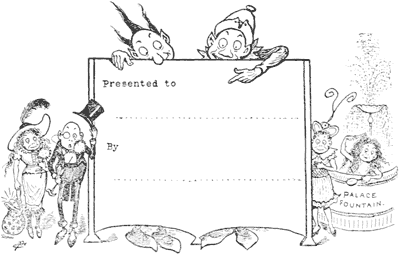
BY
PALMER COX
Author of The Brownies: Their Book; Another Brownie Book;
The Brownies Around the World; The Brownies at Home;
The Brownies Through the Union; The Brownies
Abroad; The Brownies in the Philippines;
The Brownies’ Latest Adventures; The
Brownies’ Many More Nights; The
Brownie Clown in Brownie
Town; The Brownie Primer,
etc., etc., etc.

NEW YORK
THE CENTURY CO.
Copyright, 1918, by
The Century Co.
Published, September, 1918
PRINTED IN THE U. S. A.
TABLE OF CONTENTS
| PAGE | |||
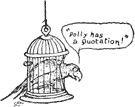
|
The Flight of Prince Florimel | 3 | |
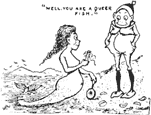
|
|||
| Titania Comes to Reign Over the Fairies | 14 | ||
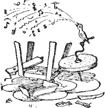
|
Florimel Reaches the
Enchanted Country |
25 | |
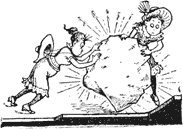
|
|||
| The Human Octopus Starts
on a Mission |
37 | ||
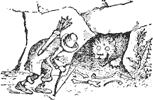
|
Florimel Meets the
Brownies |
49 | |
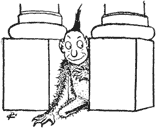
|
|||
| The Human Octopus Snoops
Around |
58 | ||
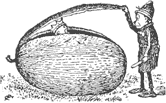
|
Florimel Is Adopted by
King Stanislaus |
68 | |

|
|||
| Queen Titania’s Great Peril | 80 | ||

|
The Compact with Vulcan | 92 | |
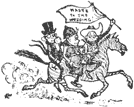
|
|||
| The Strange Wedding-Guests | 103 | ||
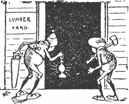
|
The Brownies Build a Raft | 119 | |

|
|||
| What Happened in the Throne-Room | 133 | ||

|
Neptune Stills the Waves | 145 | |
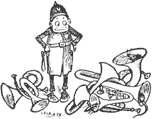
|
|||
| What the Policeman Discovered | 157 | ||

|
The German Band | 166 | |
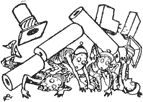
|
|||
| The Earthquake and Volcano | 177 | ||

|
|||
| The Brownies Fight the Flames | 189 | ||

|
|||
| The Flight to the Mines | 201 | ||

|
|||
| The Mission of the Dove | 212 | ||
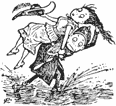
|
|||
| Disaster to Dragonfel | 223 | ||
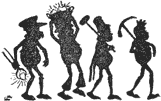
|
|||
| And They Lived Happily Ever After | 233 | ||

|
BOOKS BY PALMER COX: | |
| PUBLISHED BY THE CENTURY CO. | ||
| THE BROWNIES: THEIR BOOK | ||
| Quarto, 150 pages. Price, in boards, $1.50 | ||
| ANOTHER BROWNIE BOOK |

|
|
| Quarto, 150 pages. Price, in boards, $1.50 | ||

|
THE BROWNIES AT HOME | |
| Quarto, 150 pages. Price, in boards, $1.50 | ||
| THE BROWNIES AROUND THE WORLD |

|
|
| Quarto, 150 pages. Price, in boards, $1.50 | ||

|
THE BROWNIES THROUGH THE UNION | |
| Quarto, 150 pages. Price, in boards, $1.50 | ||
| THE BROWNIES ABROAD |

|
|
| Quarto, 150 pages. Price, in boards, $1.50 | ||

|
THE BROWNIES IN THE PHILIPPINES | |
| Quarto, 150 pages. Price, in boards, $1.50 | ||
| THE BROWNIES LATEST ADVENTURES |

|
|
| Quarto, 150 pages. Price, in boards, $1.50 | ||

|
THE BROWNIES MANY MORE NIGHTS | |
| Quarto, 150 pages. Price, in boards, $1.50 | ||
| THE BROWNIE CLOWN OF BROWNIETOWN |

|
|
| Oblong, 103 pages. Price, in boards, $1.00 | ||

|
THE BROWNIE PRIMER | |
| 12 mo, 108 pages. Price, in cloth, $ .40 net. [3] | ||
THE FLIGHT OF PRINCE FLORIMEL
All that is here set down happened in a wonderful country where wonderful things are always happening.
In a certain kingdom there was a young prince named Florimel.
His father, the king, had lately passed away, but, though Florimel was his only son, and of age, he had not succeeded to the throne that by right of birth was his.
The reason was that his father had a brother, a very cruel, crafty duke, high in the councils of the state, who had designs upon the throne himself. In a covetous frame of mind he had once taken a photograph of the crown and ermine robe, and the intelligent palace parrot had made a remark thereat:
“‘Uneasy lies the head that wears a crown,’” croaked the bird.
It was a wise quotation, and yet it was not wise to make it,[4] for right after that something happened to the unlucky parrot.
The duke with his evil influence swayed the opinions of the royal cabinet which made the laws. In his wicked old heart he wished Florimel out of the way.
If Florimel had been like other princes one reads about his people no doubt would have insisted upon his occupying the throne. But the throne was of ordinary size, so that he never could have occupied it. Like other princes he was all that was fair and handsome, but he was very small indeed. He was no larger than the average-sized boy of twelve, and the people who should have proved his loyal subjects were well-grown men and women. In their talks among themselves they showed a shame that anyone so small should rule them.[5]
“Why, he’s no bigger than a Brownie!” was a remark they very often made. “It would look foolish to have such a mite for a king.” For they were well informed about the Brownies, and knew how they perched on fences, or hid adroitly whenever danger threatened.
But they were guided by appearances, as too often people wrongly are, and they failed to realize that sometimes the best goods are done up in the smallest packages, and that even a mite may be mighty.
The fact that Florimel was so small had been a great grief to his late parents who had never been able to understand it. He had been a fine, healthy baby who had won the hearty approval of his doctors and nurses.
His mother always had an uneasy fear that the godmother who assisted at his christening might have been concerned in his diminutive size, but the king invariably poo-poohed at her suspicions. This godmother was an ex-fairy, but advancing age had interfered with her work of magic. Her joints had become stiff and cramped, and she had contracted rheumatism from sleeping in damp, dewy flowers. She did not get around in the lively fashion she used to.
“Nonsense!” said the king. “Would she have bestowed on him the gift of second sight and at the same time taken away his size? Depend upon it, my dear, her intentions were perfectly straightforward and honorable.”[6]
“But it may have been this second sight has interfered with his growth,” said the queen. “His vision is simply wonderful.”
This was indeed so. Prince Florimel could see things no one else could. Furthermore he could see them at night. Some wise old soothsayer declared that he was gifted with supernatural powers.
One other gift had his ex-fairy godmother presented to him, a bow and quiver of arrows which she averred were priceless.
“I charge you,” she said most impressively to the king, “never to let your dear son have the bow and arrows unless there comes to him some moment of great danger. Then let him place one of these arrows to the bow, and shoot it where he will. The result will be miraculous.”
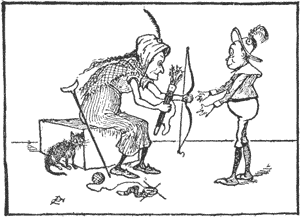
After she had gone back to the old-ex-fairy-ladies’ home the king was strongly tempted to shoot one of the arrows from the bow just to see what would happen. With great difficulty he repressed his curiosity, and placed the bow and arrows in the family safe whose combinations was known only to himself.
So time passed happily, and one year added its joys to those[7] of others, until there came the sad day when Florimel lost his dear mother. There was much sorrow throughout the entire kingdom, for the queen was a gentle, gracious one whose kind words and good deeds had endeared her to the hearts of all. So great was her loss to the king that he did not survive her long. Ere he joined her he called his brother, the duke, to his bed, and said to him:
“You are my only kin outside of Florimel, so to your keeping I entrust him. He is such a little chap you must be very careful of him. After I am gone he will be king, and I am sure he will rule well and wisely. He is a true king at heart if not of stature. Promise me to be his councilor and guide, and to incline him ever to the side of mercy, charity, and goodness.”
The false duke promised with great earnestness, but all the while he was thinking of many wicked things.
With Florimel removed he would ascend to the throne himself. Yet so well did he hide his guilty feelings that his brother had no suspicion of any perfidy or wrong-doing, and passed away in the peace befitting the righteous king he was.
After the king’s death the duke through one pretext or another delayed the coronation of the new. He incited his nephew to feats and deeds of great danger and daring with the evil hope that some terrible accident would befall him. But in all the risks and hazards that he took, and none was too great, it almost seemed that Prince Florimel bore a charmed life.
Like other young people he had his dreams, and saw much that was unreal, but with all these there had come lasting impressions.
When the duke failed to accomplish his evil designs, he determined[8] upon even more desperate methods in his game.
The people were beginning to chafe at the delay in the coronation, and were clamoring for a new ruler. So the cabinet met to decide this most important matter, and the duke presided over the council.
“This is a most embarrassing situation,” he said. “Ordinarily we would place the only son of our late king on the throne without question and amid great rejoicing. But we are confronted by a most perplexing question. Prince Florimel is what might be termed a freak. The point is, could he represent his kingdom with the proper dignity?”
“Prince Florimel may be a freak as you say,” remarked a member of the cabinet, “but at the same time I have never seen a handsomer, manlier young fellow. His symmetry is perfect, and he is all that is chivalrous and brave. He is the stuff true kings are made of. The only thing against him is his size.”[9]
“That I fear is an objection which cannot be overcome,” said the wily duke. “Can we, a race of big men and women, be governed by a pygmy king—a hop-o’-my-thumb? We would be the laughing stock of other kingdoms. Think, when the rulers of all these met, and ours came among them, of the mortification we would feel that we did not have a full-grown man to represent us. His insignificance would make this country insignificant to others. Those who did not know us, and judged us by him, would look upon us as a country of dwarfs.”
“But Florimel is the late king’s son, and heir to the throne,” said another member of the cabinet. “Who else could reign in his stead?”
“I am the next of kin,” said the duke.
“Yes, if it were not for Florimel you would be the logical king.”
“Let us postpone our deliberations until tomorrow, by which time I think I can find a way out of the difficulty,” said the duke, with deadly meaning.
The members of the cabinet looked at each other, and the meeting silently adjourned. It had been conducted with the utmost secrecy, and no one else was present but an old factotum named Gando who was there to lock the doors. And Gando, who was passionately attached to Florimel, heard the duke’s word, and was very uneasy in his mind.
“So that is why,” the old man said to himself, “the duke was sharpening his knife on the grind-stone!”
When the duke had retired to his apartment Gando tiptoed noiselessly after him, and placed his feeble, dim eye close to the key-hole of the door.
What he saw froze the blood in his veins, and caused the few[10] white hairs on his head to stand stiffly up with his great fright.
The duke was seated at his window, and the moonlight played and glittered on a long, slender knife that he held in his hand.
Old Gando’s knees knocked together, and he fled the spot. Of one thing he was very sure. Florimel without loss of time should place himself far beyond the reach of his wicked uncle. Each added moment increased the prince’s danger. Soon escape might be too late. Before he went to warn the sleeping prince he secured the bow and quiver of arrows that had been intrusted to his care by the late king. He hastily provided himself with a smock, loose cap, and long trousers of coarse cloth such as children of poor peasants wear.
With these in his trembling arms, breathless from his exertions and the great excitement under which he labored, he entered Florimel’s bedchamber, and closed the door noiselessly behind him. With his fair head resting on his curved arm, Florimel slept. Gando gave a great sigh of relief when he heard his gentle breathing. He flew to the bedside, and[11] straightway roused the slumbering prince from his dreams.
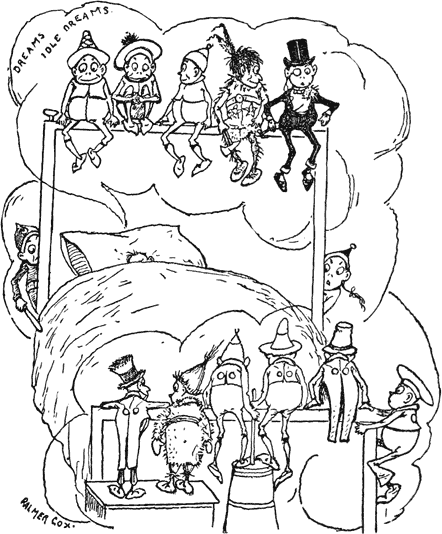
“Oh, master, my dear young master!” he cried with his voice broken by sobs. “Rouse yourself, I beg of you, and go hence![12] Do not delay, or you may be too late. Your cruel uncle this very moment is plotting your death!”
Florimel sprang up in bed, and tried to rub the sleep from his eyes.
“But where shall I go, good Gando?” he asked.
“That I know not,” said the old man. “The further you go the better. You must leave behind you the boundaries of the kingdom. See, I have brought these peasant’s clothes for you to wear.”
“Nay, I still have my prince’s attire,” said Florimel.
“That will not serve,” said Gando. “If you donned it you would be quickly recognized, and your uncle would gain knowledge of you to your swift undoing.”
He assisted the bewildered Florimel to dress, swung across his back the quiver of arrows, and handed him the bow.
“This was your godmother’s gift,” he said, “and it might aid you.”
But, though Gando urged Florimel not to take the time, the latter printed something on a card which he tacked upon the outside of the door before they left the place.
As they fled toward a secret exit they heard down the corridor the stealthy tread of feet.
The duke snarled like a wild beast as he read the lines:
“FAREWELL, DEAR UNCLE! KEEP YOUR EDGED TOOL FOR FATTED SWINE!”
“Fly!” old Gando cried, as he thrust Florimel out into the lonely, starlit night. “Oh, my dear young master, fly for your life!”
It was a sad and sudden change indeed for the youth, from the pleasant dreams of guardian Brownies surrounding his[13] bed, to the uncertainty of an unknown way before, and the certainty of a cruel enemy behind. Snow-capped mountain peaks in the distance had a forbidding look and, as though in league with his old uncle, seemed to extend to him but a cool welcome. The wakeful and observing beasts of the wood and wild saw in him a new character never before met in the open country, and were shaken with wonder and agitation while they watched the hastening little traveller striding along the lonely road, his only burden the bow and supply of arrows.
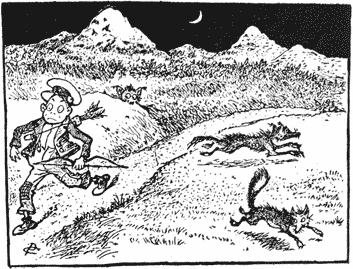
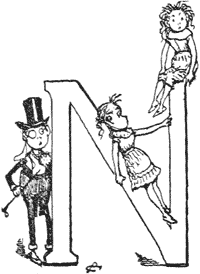
TITANIA COMES TO REIGN
OVER THE FAIRIES
Now in another part of the same country there was a race of fairies who never grew old and always remained beautiful.
Their loveliness of face and form was beyond all description.
Just try to think of the prettiest young girl you ever saw. Well, even the plainest of these fairies were ever so much prettier. That is to say, all were very beautiful with one exception. In her case the fairy charm was an utter failure.
She was little and old, with a queer, wrinkled face like a dried-up crab-apple. But, because no one else looked like her, she was firmly convinced she was the most beautiful of them all. They wore clinging gowns made of the texture of roses,[15] lilies, and other flowers. She who wore fragrant rose-petals called herself Rose, she who called herself Lily one of lilies, and so on. There were Violet, Daffodil, Bluebell, Daisy, Jassamine, Hyacinth, and ever so many others. You could find the names of all the rest in a seed-catalogue—that is, all but the little old wrinkled one who was known as Dame Drusilda. The fairies had a republic. Because they were all so very much alike, and equally beautiful, gifted, and clever, it would have been an extremely awkward matter to select a queen from among them. If any one had been chosen, all the others would have felt greatly slighted. Dame Drusilda believed she should be the queen, simply because no one else looked like her, but she was quite alone in her opinion.
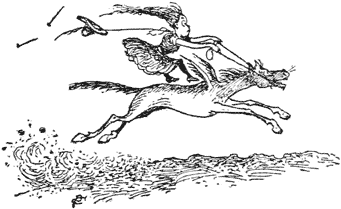
They were very up-to-date, and they had a palace of great magnificence that had every modern convenience, with sanitary plumbing. There was a very gorgeous throne-room, wisely arranged in the event that they might some day have a queen, with a portcullis at the entrance that could be raised or lowered at will. This, of course, was to keep out unwelcome visitors.
The republic was most beautifully situated where a river[16] joined the sea, and upon a cliff one day the fairies beheld a most unusual sight. While they were smiling and nodding a greeting to some lovely mermaids who were down among the rocks combing their long tresses with the aid of hand-mirrors, a golden shallop heaped with flowers came drifting down the placid stream. The fairies signalled to the mermaids who, when their attention was attracted to the shallop, swam to it, and guided it to the shore. As it drew near all grew very much excited when they observed a most exquisite little creature nestling asleep in the fragrant bed of flowers. When the shallop grounded gently on the pebbly beach her eyes opened, and she gazed up at them with the most enchanting smile imaginable. “I am Queen Titania,” she announced, as they bent over her, “and I have come to reign over you!”[17]
With tender hands they raised her from her couch, and knelt before her in silent adoration.
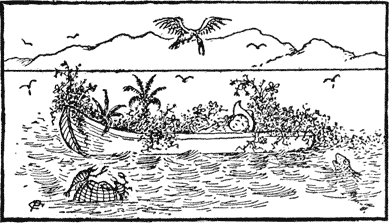
Never before had they seen anyone so beautiful, as she stood before them in her long trailing gown, with a gem-crusted crown upon her brow, and in her hand a slender wand from whose tip shone the scintillating rays of a diamond.
“Your Majesty,” said queer little Dame Drusilda, “we are all your loyal subjects. Let us conduct you to the palace, where affairs of state await you.”
Amid great rejoicing they conducted Queen Titania to the palace. Wee-winged Cupids bore her long train. The portcullis was raised, and in triumph they entered.
The new queen was conducted with much pomp to the throne-room. When she was placed upon the throne, two dogs, two frogs, and an ostrich were brought before her.
“What have they done?” asked Queen Titania.[18]
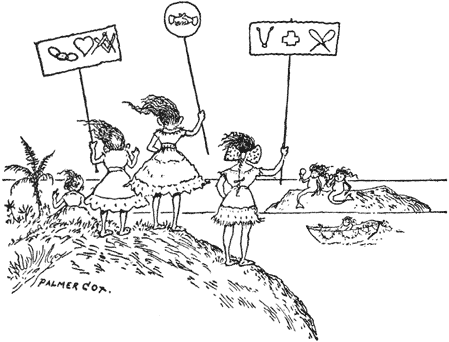
“Your Majesty,” said the fairy named Hyacinth, “these two dogs were fighting, and one bit off a piece of the other’s ear.”
“Which was the one who did it?”
“Why, this one!”
“Bind him over to keep the peace!” said Queen Titania promptly.
The fairies all nodded their approval as the dogs were led away.
“Your Majesty,” then spoke up one of the frogs, “will you be kind enough to listen to the complaint of one who has always tried to conduct himself like a perfect gentleman? I am a confirmed bachelor-frog. This young lady-frog is continually pestering[19] me with her attentions. She keeps on proposing marriage, although it is not leap-year.”
“With frogs every year is leap-year,” said Queen Titania.
The ostrich looked very guilty as a fairy named Eglantine explained:
“Your Majesty, he deliberately swallowed a half-dozen of the palace spoons.”
“Why did you do it?” asked Queen Titania of the culprit.
“I don’t know,” he said shamefacedly.
“But I do,” said Queen Titania. “You did it to stir up things. Have you a sweetheart?”
“Yes, I’ve got a bird!”
“Well, now you can go and spoon with her!”
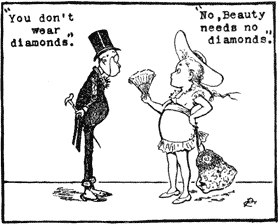
All were quite delighted with the wisdom shown by their tiny sovereign in dispensing justice. But before other important matters could be disposed of a fairy messenger named Pink with her petalled attire all flecked with dust dashed in great excitement into the throne-room. She had ridden many leagues upon a winged steed, and in its terrific speed which was far greater than that of the swiftest aeroplane it had used both wings and feet.
Pink ran toward the throne to impart the news that had[20] brought her in such hot haste, but the unexpected sight of Queen Titania stilled the words upon her frightened lips, and caused them to part instead with wonder and surprise.
“This is Queen Titania,” hastily explained Dame Drusilda, “who henceforth is to reign over us.”
Pink knelt low before Titania and kissed her royal robe.
“Your Majesty,” she said, “I am the bearer of bad news. Dragonfel the wicked enchanter across the sea has declared his intention of making trouble for the fairies.”
“Who told you this?” asked Queen Titania.
“A little bird,” was Pink’s reply.
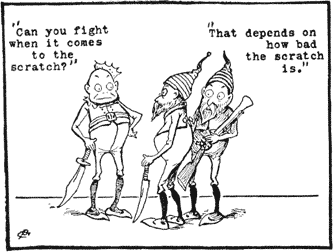
“This is very serious,” said Queen Titania gravely, “for little birds never tell fibs.” There was a clamor of dismayed, excited voices, but the queen raised her wand for silence, and continued:
“Though it may only be an idle threat, I will still appeal to Euphrosyne. Should we ever need her help right gladly she will give it.” Her hearers all looked puzzled, and Dame Drusilda made bold to ask: “Who is Euphrosyne of whom you speak?” “Have you not heard of her?” Queen Titania asked,[21] with much surprise. “She is the Goddess of Mirth, who tries to make the whole world happy—a most gigantic task. Come with me, and I will send her an invisible summons.” With the Cupids bearing her train she passed with the fairies out to the palace courtyard where fountains played and flowers bloomed. There she raised her wand, and told them to look up. And doing so they beheld a most marvelous sight—a radiant, smiling-faced, gloriously beautiful young woman in classical white robes, with her sandalled feet resting ever so lightly upon one of the pearl-tinged clouds.
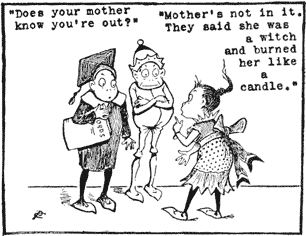
Around her circled snowy doves, cooing, fluttering, and settling on her head, bare shoulders and arms.
While Titania waved her wand, she suddenly gazed downward, as though something by means of an electric current had been transmitted to her through the air. She stroked a dove that had found its way trustingly to her hand, and as the others flew from her she herself seemed plumed for flight.
The fairies watched her with a suspense that was almost painful, but to their great disappointment the passing clouds blotted her from sight.[22]
But even the fairies who all the time are witnessing the most wonderful things were quite astounded when Euphrosyne in what seemed to be the very next moment appeared with the dove right in their very midst.
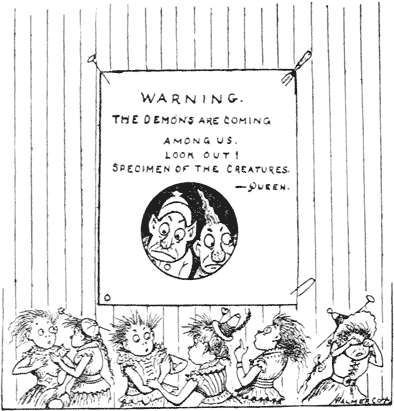
“What is your wish?” she said to Queen Titania.
“Oh, beautiful Euphrosyne,” said the little queen, “we are much concerned over the wicked Dragonfel.”[23]
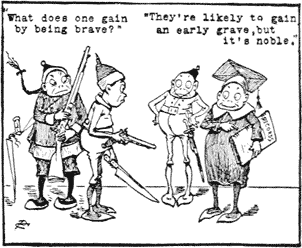
“The enchanter across the sea?” said Euphrosyne.
“And what about him?”
“He threatens harm to the fairies.”
“Do not borrow trouble,” said Euphrosyne.
“Sometimes people make foolish threats, and when others heed them they have a good deal of needless worry.” All looked very much relieved, and Queen[24] Titania said: “Your encouraging words comfort us greatly.”
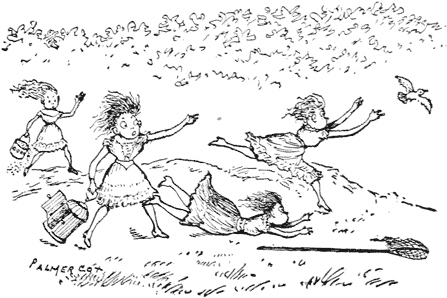
“If I were you,” advised Euphrosyne, “I’d always keep the portcullis down, and be very careful about admitting strangers. Don’t let anyone in without a first-class reference. If Dragonfel annoys you, let me know.”
“But how?” asked Queen Titania.
“You can send this magic dove to me!”
They looked at her, but she was gone, and no one knew whither. She seemed to have just melted away. Where her hand had been there was a dove, and, as it started to flutter off, with some difficulty they caught it.
Though she was very much encouraged by all Euphrosyne had said, Queen Titania still thought it prudent to post on one of the palace walls a warning placard so that those who ran might read.
And, it proved a task that was sufficient to interest some of the fairies the rest of the afternoon, and, by the time they got through, they were able to make some show at hitting the nail on the head.
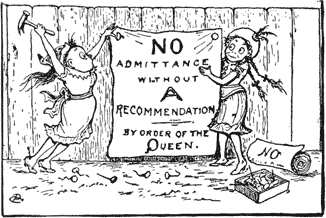
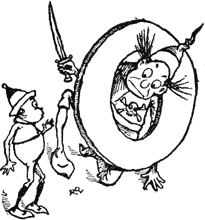
FLORIMEL REACHES THE ENCHANTED
COUNTRY
On and on flew Prince Florimel from the wicked uncle who meant to do him harm.
The friendly stars shone down to guide him on his way, but just what that way was he did not know. His only thought to put the palace as far behind him as he could, and at times he turned his head to look back at its frowning, shadowy walls that finally disappeared from sight. Florimel gave a deep sigh of relief, but did not relax his speed in the slightest.
The words of the faithful old Gando were strongly impressed upon his mind, and he realized that the duke had designs on his life. When it was discovered that he was missing, a search would be made for him, and once in the power of the duke it would go hard with him.[26]
So on he ran, and the few people whom he met paid little or no heed to him, thinking perhaps that he was some frightened peasant-child hastening to or from home upon some urgent night-errand. And as he went, always further and further away from the palace, the houses grew fewer and still fewer, till finally he found himself out in the open country.
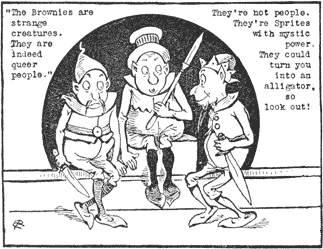
The stars were paling out, and by this time Florimel was very tired, so that when he saw a hay-stack in a field he quickly sought it, and burrowing from sight down into the sweet-smelling mass was soon asleep.
The sun was up when he awoke refreshed. He heard the cooling trickle of a brook hard by, and drank thirstily, and laved his face and hands. Some distance off upon a dew-spangled hillside thin smoke curled lazily up from the thatched roof of a farmer’s cottage. Florimel who felt the qualms of hunger drew nigh to it resolved to ask for food.
As he approached the cottage a dog stretched out in the doorway to enjoy the first genial rays of the sun jumped up and started to bark, but almost instantly his barks ceased, and he wagged his tail instead with friendly violence.[27]
A stout, middle-aged woman with a kerchief on her head came to the open door and eyed him questioningly.
“Good mother,” he said, with a winning smile, “may I trespass upon your hospitality? I would fain break my fast, and this coin will pay my way.”
“Food have we a-plenty, and to spare,” said the kind-hearted woman, “so that you are welcome to it. But who are you, and whence came you? You do not speak like a peasant’s child.”
“Nay, I have some knowledge of fair speech,” said Florimel. “Yet do I count myself one of the people. And I fare from the city in quest of adventure. See, I have brought this bow and quiver of arrows with me!”
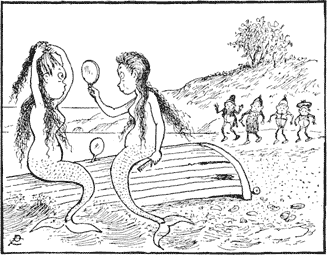
“Then most surely you will find it,” said the dame, “for we live almost on the edge of the kingdom, and beyond that line of deep woods there is a strange country with adventure enough, I warrant you. But come with me, and sit you at the board. My good man has gone to loose the sheep from the fold, and will be back very soon.”[28]
So Florimel followed his hostess into the plain kitchen, and took his place at a bare wooden table while she busied herself in the preparation of the meal. And, as he sat there, and she was occupied with her task, there rose from outside a sudden hub-bub, made up of the gallop of many horses’ hoofs, the clank and rattle of swords and uniforms, and the jargon of excited human voices.
The woman in great curiosity rushed from the oven to the door, and Florimel jumped down from his chair, running after her, and peering out from behind her.
“Soldiers!” she cried, astounded beyond measure. “What are they doing here, I wonder?”
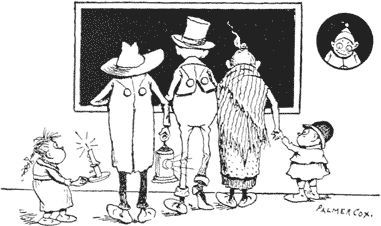
The farmer with cap in hand looked up at them, awed and confused by their fine airs and magnificence, and while they volleyed questions at him silently and stupidly shook his head,[29] until at last in their impatience and disgust they put spurs to their horses’ flanks and galloped off in clouds of dust.
Then the good man ran toward the house, suddenly finding voice, and shouting at his wife:
“Here’s a great to do! The young Prince Florimel has disappeared in the night, and the whole kingdom is aroused!”
Then noticing Florimel for the first time he asked:
“But who is this?”
“A chance guest to break his fast with us,” said his wife. “But let us eat before the food grows cold.”
So Florimel partook heartily of the plain fare of the farmer and his wife, and throughout the meal the talk of his hosts was of the missing prince.
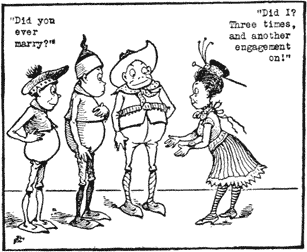
“Poor lad!” said the woman with a sigh.
“I hope that all is well with him. Yet much I fear this search for him is vain. His uncle, the duke, could tell, I warrant, what has happened to him. But he will never be heard of more, and the wicked duke will now be king.” “You who have come from the city,” said the farmer to Florimel, “no doubt some time have seen the poor[30] prince. What kind of a young lad was he? A likely one, so I have heard.” “He had his faults,” admitted Florimel. “He was very small of build—no taller than I. When last I saw him he looked not unlike me. I doubt if he weighed a penny weight more.”
“Was he handsome?” asked the woman.
“Am I handsome?” asked Florimel in return.
“Candor compels me to tell you you are not,” she frankly said, “though you are not ill-favored, either.”
“Still if I wore the prince’s attire,” said Florimel, “I would be as handsome as he. But let us change the subject. You spoke but a while ago of that strange country which lies adjacent to this. In what manner is it strange?”
“But little is known of it,” said the woman, “for, in truth, it is a place to be avoided. There are few humans bold enough to penetrate its mysteries, for in the forests and dense undergrowth are savage beasts that wreak harm. Often we can[31] hear their wild cries at night, and our hearts are chilled. And, even if one escape the beasts, there are Brownies and fairies to weave their mystic charm.”
“Are the Brownies there too?” asked Florimel, with interest.
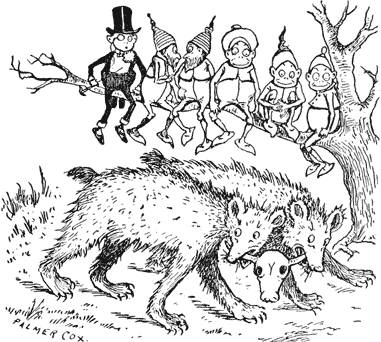
“Aye, that they are!” said the woman. “But it is not the Brownies that would hurt you. They are kind little creatures who would help instead of harm you.”
“I would like to see them,” said Florimel reflectively. “Many a night as I lay in my bed have I dreamed of the Brownies.”
“See them you cannot,” said the woman decidedly, “since[32] you have not second sight. Many have tried to see the Brownies, but they have failed through lack of supernatural vision. But there are Brownies nevertheless, and they go everywhere. Of that we have abundant proof, have we not, husband?”
“Aye!” said the farmer. “Once when I lay flat upon my back, and the grain in the field was in danger of rot, the Brownies came one night and harvested it. In the morning it was all cut and stacked.”
“Yes,” the good wife hastened to add, “and that very same night they churned the cream to butter.”
“Are you sure the Brownies did it?” asked Florimel, in surprise. “Who else but the Brownies?” said the farmer positively. “We had set a bowl of cream for that is all they ask, and next morning the cream was gone. Wife, show him the bowl!”
The woman thereupon exhibited an empty blue delf bowl, and Florimel was convinced. He rose with his hosts from the table, and went to the doorway from which he gazed to the far line of woods that now held such charm for him.[33]
“Let me pay you my faring, good people,” he said, “for I would be on my way.”
“Nay, there is naught you owe us,” said the farmer, “for you have been a welcome guest. You are a fine young lad, and I have a fancy for you. You had better bide here with us. There is work for you to do for your board and lodging. I need someone to tend the sheep.”
“I thank you, my good man,” said Florimel, “but I must leave you.”
“Whither would you go?”
“To that strange country of which your good wife spoke.”
“Say not so, young master,” implored the woman earnestly. “There are wild beasts there waiting to devour you.”
“And there are wild beasts of men sometimes even more terrible,” said Florimel. “I will take my chances with the beasts. All that I have loved I have lost, so there is naught to keep me. Each moment I tarry but adds to the danger that encompasses me.”
“Master, can it be?—yes, it must be!” cried the man, with a great light breaking upon him. “You are the prince!”
“Yes, I am indeed he!” said Florimel. “Convey word to my uncle that I am gone, and that the child of the brother who trusted in him will never trouble him again. If the people choose him for their ruler, let the consequences be on their own heads. And now farewell!”
With this last word on his lips he broke into a run. The man with the best of intentions tried to follow in the hope of dissuading him from his rash purpose, while his wife frantically shouted for the young prince to come back.
But with the bow and arrows that might mean so much to him[34] Florimel only increased his pace, so that the other was soon distanced. Finally the man in despair gave up the chase, and stood watching until Florimel turned, waved his hand, and disappeared into the heavy growth of forest. And on and on he went, though nothing extraordinary befell him. So for three days he continued, suffering neither from hunger nor from thirst, for there were plenty of pure brooks at which he could lave and drink, and it was the time of the delicious tomtom, a juicy fruit everywhere in great abundance, which tasted like a banana flavored with vanilla ice cream, and which had all the sustaining qualities of beefsteak.
Of this Florimel partook heartily and at will, as well as of berries and nuts, and when weary slept for precaution’s sake in[35] the forked branches of trees, with his rest broken only by the crashing of some skulking animal through thick, tangled underbrush in quest of prey or a long, drawn-out, shuddering night-cry that would chill his blood and cause his heart for a moment to cease its beat.
Still there were trees growing thickly together, and retarding and making difficult one’s advance. But, just when he was growing discouraged, they began to thin out, and he came into more open spaces.
Finally he reached a tiny lake that shone like a turquoise in a bowl-like formation at the base of a steep hill.
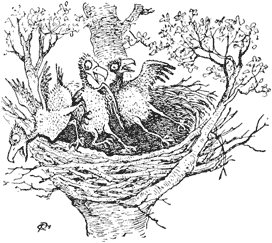
A path ran up the hillside, and this evidently had been much in use, for the grass was worn and trodden by many feet. On a ledge there was an old, decaying, leafless tree, and on one of its gaunt, top-branches that jutted over the lake a pair of intrepid eagles had built their nest. Florimel looked up and spied the young eaglets who were just old enough to essay flight, selfishly trying to crowd each other out of their airy structure of sticks and straws. Far overhead their parents described invisible circles in the sky, emitting as they did so harsh shrieks of pride.
While he gazed upward, thinking meanwhile that it was a[36] strange abode for eagles to choose, in place of the customary mountain-crag, he was suddenly startled by the savage roar of beasts.
Quick as a flash he turned, and saw a wild, fierce, snarling pack—a confused, horrifying vision of lions, tigers, and leopards—their red tongues lolling from their watering mouths—their nostrils dilated at the scent of human blood—flying with leaps and bounds to rend and tear him apart and devour him.
Desperately he seized an arrow from the quiver, and placing it in the bow pointed it at them and pulled back the cord.
But the cord snapped in twain, and the arrow fell harmlessly to the ground.
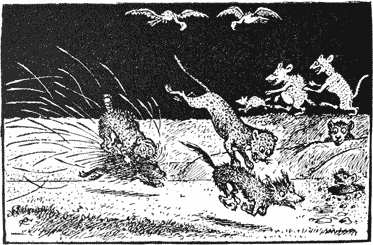
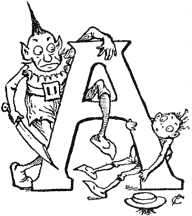
THE HUMAN OCTOPUS STARTS
UPON A MISSION
Across the minor sea whose blue, sparkling waters kissed the fair shores of Queen Titania’s fairy kingdom, about a hundred leagues as flies the crow, there was another country where lived the notorious enchanter Dragonfel.
A fairy messenger on a winged steed had conveyed information that Dragonfel intended to make trouble. But this was nothing new for Dragonfel.
As a matter of fact, he was always trying to make trouble for everybody. Trouble was his specialty.
Dragonfel was not a nice man, and, if you had known him, you would not have liked him. He cheated when he played croquet, and he was always claiming wickets that he never made. He did not go to Sunday School, either. If he had[38] gone, he would not have put a penny in the plate for the heathen. That was the kind of man he was.
Yet he was the possessor of fabulous riches, and he never would have missed what he might have given away had he been charitably inclined, which he was not in the least.
No one else in the whole world was as wealthy as he. He owned a combination mine in which were diamonds, rubies, sapphires, emeralds, and other precious gems galore, some of them as big as cobblestones.
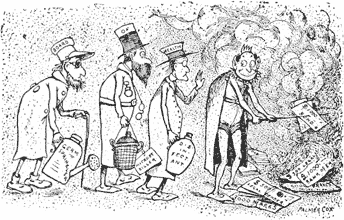
It may be said with safety that Dragonfel was inclined to have his own way, and carry out his own ideas. He was very rich, and had money to burn. When in the mood of celebrating some great event, such as the Burial of Good Intentions, or the Failure in Eden, instead of climbing on some rock to set off firecrackers, burn Roman candles, or discharge toy cannon, he delighted in burning Bank Bonds, Legal Tenders, or Government Securities of large denominations, until the ashes of them were declared a nuisance by his Board of Health, and with reluctance he would discontinue his celebration.[39]
As is usual in all such great operations there were panics at times, through alarms of fire, explosions, or escaping gas, when everybody tried to get out at once and but few could escape.
One day it would be the danger of being smothered, the next of being roasted, the third of a cave-in where all would be buried alive, and so from hour to hour fear was in the way.
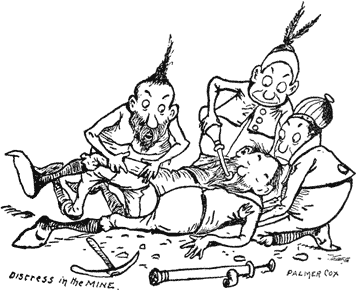
There were mine-sprites whom he kept steadily at work, without regard for Union hours, digging the gems out with their fingers.
The poor mine-sprites were greatly over-worked, and not the least regard was paid to life or limb. The hours were long as[40] they struggled at the wheelbarrows or mine-carts, either pushing or pulling, with their unreasonable loads piled high in the air, and with gems that in the market would have brought enough to pay the debt of a Principality slipping off, and rolling in the dust.
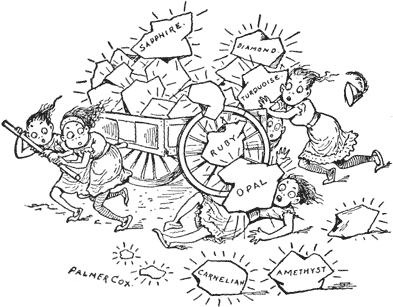
The palace of Dragonfel was a sight, and it would have made your eyes blink to see it. It was constructed entirely of diamonds, rubies, and emeralds all stuck together with cement. There were no opals, because Dragonfel thought they were unlucky. If you could have pried off any one of them you would have had enough to keep you in the greatest luxury all your life. The famous Kohinoor was but a grain of sand compared to any of them.[41]
Back of the palace, and casting a frowning shadow over it, was a single towering mountain whose top was an extinct volcano. No one could recall the exact date of its last eruption, for Dragonfel stubbornly insisted upon running his business without an almanac. There were those scientifically inclined who leaned to the theory that the volcano had been the cause of all the gems in Dragonfel’s mine.
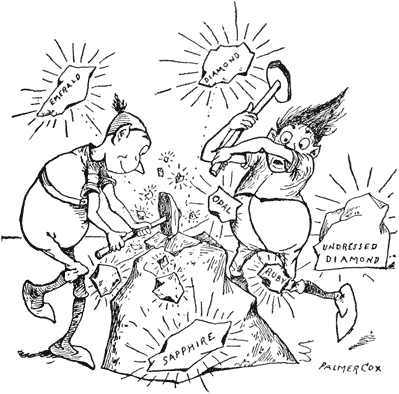
Though it must have been a very long time since the volcano had celebrated with home-made fireworks, the enchanter had always anticipated a further display, so he had taken the precaution[42] to buy an old-fashioned fire-engine which was installed conveniently at hand in a building over whose doors was the caption: NEPTUNE HOOK AND LADDER CO. NO 1. In the building were plenty of rubber coats, boots, and red helmets. Everything was ready for an emergency.
There were some who declared that Dragonfel had some business connection with Beelzebub, but, whether this was true or not, he had the bad taste to get himself up after the authentic portraits of that disreputable person. He was very tall indeed, with almost a scarlet countenance, and he wore a long, flowing cloak that was a perfect match for his complexion. He kept his hair rather long, and brushed it stiffly up, to convey the impression that he had a natural horn.
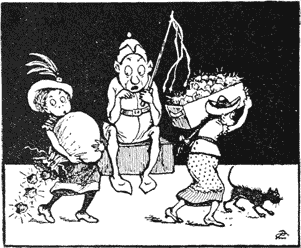
He boasted a host of followers, all big, hulking black-guards of giant-like stature, with repulsive names such as Boundingbore, Mandrake, Wolfinger, Grouthead, Snoutpimple, and the like, and whenever they did something mean he rewarded them. The consequence was that they were trying to do mean things all the time.
They were in charge of the mine, and the way they treated the[43] poor mine-sprites was awful. It was a good thing for them that the officers of the Society for the Prevention of Cruelty to Children were unable to get around.
So on a certain day, following his usual custom, Dragonfel was making an inspection of the mine. He had descended through a secret passage, and walked about the dark chambers lit here and there by gloomy flares of light.
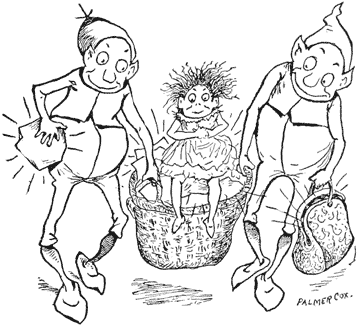
Guarded by the enchanter’s cruel followers, the mine-sprites, poor little, emaciated, witch-like creatures in tattered clothes, were digging away with their raw, bruised fingers at the sides of earth and exhuming precious stones. They were not allowed to use picks, for that would have made the work easy.
Diamonds, rubies, pearls, amethysts, emeralds, and other[44] gems, every one of them worth a king’s ransom, lay piled about carelessly in heaps. The opals when they were discovered were thrown away. Sprites kept staggering off with heavy loads in wheelbarrows.
Dragonfel surveyed the work with great satisfaction, and asked Grouthead who was in general charge:
“When were they fed last?”
“Three days ago, kind master!”
Everyone called him “kind master,” though whether this was in sarcasm or not no one knew.
“See that they don’t get anything to eat before the full week is up,” ordered Dragonfel. “And that reminds me of my own dinner. Boundingbore, tell the cook I want turtle soup, spiced venison pastries, apple dumplings, strawberry shortcake, and iced lemonade with plenty of crushed raspberries in it.”
The mouths of the poor little mine-sprites watered, and they smacked their lips, but Grouthead snapped his long snake-whip so that it sounded like a pistol-shot, and they frantically continued digging away in the earth with their fingers.
Boundingbore flew to do Dragonfel’s bidding, and Snoutpimple observed, rather timidly:
“The air down here is very bad, kind master!”
“That’s good,” said Dragonfel, with hearty unction. “It might make me ill if I were obliged to remain, so as I have a proper regard for my health I think I will get right out into the open.”
Attended by Mandrake, Snoutpimple, Wolfinger, and some of the rest, he went on his way, while Grouthead snapped his whip to incite the frightened, gasping, exhausted mine-sprites to further effort.[45]
When he came up out of the shaft Dragonfel gave a deep breath of relief as his nostrils sucked in the bracing air that had a salt tang of the sea in it. Out in the harbor there tossed a galleon on the lazy swell—a craft built low amid-ship, and with both bow and stern curving high into the air.
Dragonfel gazed off at it with interest, and remarked:
“It may come in handy soon if these Brownies and fairies continue longer. They are getting altogether too good, and must be stopped. But let us go back to the palace to see if anything has happened in our absence.”[46]
Nothing else was to be seen on the wide water to draw his attention, except some mermaids who were above the waves, engaged in combing their hair, who, to most people, are very interesting.
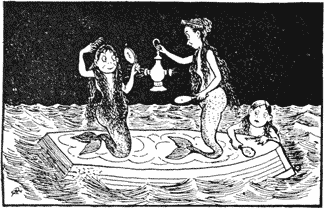
A little bird with very acute hearing listened intently to his words as it lightly balanced on the twig of a gumdrop tree, and then flew straight across the sea to tell a fairy, who told the other fairies. Dragonfel with his big, clumsy, lumbering cohorts strode on to the palace that was guarded by a Demon Usher—a queer, comical-looking chap who with his wings much resembled a human grasshopper, and who half flew, half walked.
He had thin little wisps of hair sticking out from each side of his nose, like the scanty whiskers of a cat.
The Demon Usher with hops and jumps escorted him to a magnificent throne, and grovelled with smirks before him, while Dragonfel with what he thought to be the quintessence of grace sank upon it, and then arranged himself in what he imagined was a kingly posture.
“Well,” he gruffly said, “has anyone been here since I’ve been gone?”
“No, kind master!” the Demon Usher hastened to assure him.[47] “No one has been here since the band and you remember them.”
“Ah, that band!” repeated Dragonfel, with a shudder. “I can’t get their notes out of my ears yet. But what have we here?”
A huge creature resembling an octopus, with great, staring eyes popping from his head, and hundreds of fuzzy tentacles protruding in all directions from his grotesque body, came crawling toward him. Straightway Dragonfel sprang up from the throne, while Wolfinger, Mandrake, Boundingbore, and Snoutpimple, who had assumed respectful positions at his sides, drew back in alarm.
But the Demon Usher gave a cackle of a laugh, and gleefully[48] rubbed his hands together as though he were washing them with invisible soap.
“Have no fear, kind master!” said a thin, piping voice from somewhere within the horrid creature’s hulk. “Is not this a pretty disguise?”
“The Red Spirit, as I live!” cried Dragonfel, in a tone of admiration not unmixed with relief. “You rascal, why have you chosen this masquerade?”
“But is it not a clever one?” persisted the Red Spirit. “See, kind master, I can either compress or expand myself at will.”
As he spoke he shrank to practical insignificance, and then almost immediately afterward swelled out until it seemed that he would burst.
“Capital!” said Dragonfel encouragingly. “You can be of great assistance to me. I have a mean task for you to do.”
“The meaner the better, kind master!”
Dragonfel raised his arm, and pointed toward a window that gave a vista of the far-off, smiling sea.
“Go, Human Octopus,” he commanded, “and spy upon the Brownies and fairies!” Without another word the hideous object started to crawl off by means of his myriad tentacles, and all who were present watched his convulsive, eccentric movements with malicious satisfaction.
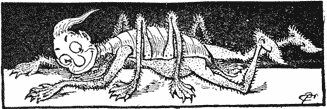
PRINCE FLORIMEL MEETS
THE BROWNIES
Prince Florimel gave a great shudder of fright when the gift of his ex-fairy godmother so utterly failed him in that moment of terrible danger. As the savage beasts, screaming for his blood, came toward him, he turned and fled, without relaxing his hold upon the treacherous bow. He made a frantic leap for the trunk of the tree, and grasping one of the low branches pulled himself up with desperate haste as far as he could.
The beasts with thunderous roars and sharp teeth showing sprang up at him, and a lion with knife-like claws just grazed the skin of one of his legs, and tore off a portion of his garment.[50]
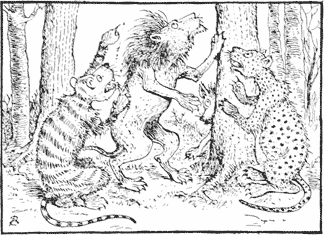
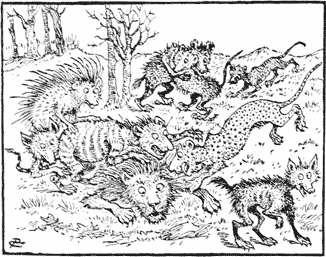
Florimel climbed up further, and still further, for safety, while the animals roaring their defeat continued to hurl themselves at the tree until it shook and shook again.
Finally they took to fighting among themselves, with outcries that were terrible, and finished by slinking or limping away discomfited.
The eaglets disturbed by all this clamor perched on the edges of their nest as though deliberating upon the hazard of trying for the first time their wings in the dizzy space of blue. High overhead their angry parents soared[51] screaming their protests at what seemed to them an unwarrantable intrusion.
Still retaining the bow, Florimel climbed out toward the nest, intending to usurp possession of it, and with timid flaps of their untried wings the eaglets essayed flight. Finding they could fly, they soon gained confidence, and joined the parent-birds who led them a mad aerial chase.
Soon Florimel was the sole tenant of the nest, and, after he had established himself comfortably in his new quarters, he set about to repair the damage to the bow.
He tied the broken cord securely, and drew it taut, pulling it back as far as he could repeatedly, but he did not waste in a trial one of the remaining arrows in his quiver. For, though it had already brought to him one grievous disappointment, he still had faith in his ex-fairy godmother’s gift.
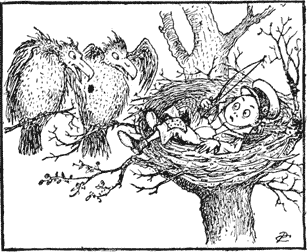
The eagles resenting his possession of their home kept flying threateningly at him, but every time they came near he menaced them with the bow and drove them away. Finally they alighted on another limb of the tree, where they all sat in a row viewing him with silent moody protest.[52]
Worn by fatigue and excitement Florimel closed his eyes in sleep, with an arm bared to the elbow hanging from the nest. When at last he was awakened by a confused babel of voices from below, dusk had fallen, and a crescent moon hung low in the sky.
The eagles young and old in agitated manner once more were circling the darkening sky, and leaning over the nest and looking down Florimel was astounded by what he saw.
And no less astounded than he was were a band of little people who had caught a glimpse of that rounded human arm sticking from an eagles’ nest with consequent and complete mystification to all.
In a ring and with characteristic postures they stood gabbling among themselves and pointing up—a queer, very queer race, all males, with round fat little pot-bellies, thin, spindling shanks, long, tapering feet, and babyish-looking heads set on their shoulders apparently without connecting necks. And these heads had large ears, wide mouths, and pop eyes—a combination that ordinarily would make the possessor of them ugly, but which in their case contributed general results that made them unusually winning and attractive.
As Florimel looked down he could note that there were many of one type—tiny fellows who wore the same kinds of caps and jackets. But there were others too—one of each kind—a Policeman with a club, a Sailor with a spy-glass, an Indian, a Cowboy, and a single representative from every country of importance in the world. England, Ireland, Scotland, France, Germany, Russia, Switzerland, Austria, Italy, Turkey, Greece, Spain, Portugal, China, Japan, the United States, Canada, and other lands had their delegates whom Florimel could distinguish[53] by means of a strange human picture-book in the museum of the kingdom from which he had flown, and which often he had been permitted to see. And, while he marveled and wondered thereat, his keen eye alighted on another too—a tiny chap with high-topped, bell-crowned hat, black clothes with swallow-tail, a wide expanse of spotless white shirt-bosom, spats, and glistening patent-leather shoes—a pompous, vain, conceited, immaculate-looking little fellow who carried a cane that seemed a part of him, and who wore a round piece of glass over one of his eyes.
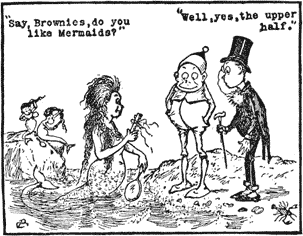
In order to obtain a better view Florimel leaned further over, and so disturbed the architecture of the nest, from which the sticks began to fall, until he felt the whole foundation going. But so suddenly did this occur that he did not have a chance to grasp a saving branch, and in a trice plunged through the bottomless structure down—down—down—
He closed his dizzy frightened eyes, struck the waters of the lake, then disappeared from sight.
The curious band watching him were quick to realize his predicament. Without loss of time they ran to a shelf of rock that over-hung the lake, and one and all jumped in after him.[54]
Ker-splash! ker-splash! resounded on all sides until the water was dotted with bobbing heads.
As Florimel came to the surface, blinded and choking, someone quickly grasped him, and, while the rest formed a living chain, he was passed on from one to another, until the last dragged him safely to shore.[55]
Soon they were all gathered about in a ring, with Florimel in the centre, and, while the soft wind dried their dripping clothes, they looked at him, and he at them, with wonder and surprise on all their faces.
“Avast there, messmates!” said the Sailor to the rest. “What did I tell you? He can see us!”
And the cry was taken up all around the ring:
“He can see us! He can see us!”
“Why shouldn’t I be able to see you?” said Florimel, rather impatiently. “I have eyes.”
“Yes,” said one who wore a long black gown, and who had a tasseled mortarboard on his head, “but so have other people. It takes second sight to see the Brownies.”
The Brownies! Florimel’s heart gave a sudden bound.
“Much am I beholden to you all,” he said, “for having rescued me. If you had not saved me I should have been obliged to save myself.”
“Can you swim?” asked the Sailor, while all looked much chagrined.
“Like any duck!” was Florimel’s response. “But are you[56] mortal?” questioned the Uncle Sam Brownie. “No mortal eye has ever yet beheld us.”
“My ex-fairy godmother at my christening bestowed on me the gift of second sight,” explained Florimel, “so that I have always been able to see things no one else could.”
“Ah, that accounts for it,” said the Irish Brownie, while the faces of all the others showed that a great mystery had suddenly been cleared away. “You must have supernatural powers.”
“Of that I am not sure,” said Florimel, “but of this much I am, that right gladly would I be one of you, to work and toil while weary households sleep, to delight in harmless pranks and helpful deeds, and never be seen by mortal eye.”
They looked at each other, evidently embarrassed by so bold a hint, and the Brownie Dude voiced the thought that was in all minds when he fervently remarked:
“I wish King Stanislaus were here!”
“But you are not a Brownie!” said the Chinaman to Florimel in a most decided tone. “How could you join the band? You don’t look like a Brownie. What have you ever done?”
“Nothing, I fear,” confessed Florimel. “It is not what I have not done, but what I hope to do, that makes me so presumptuous as to beg the honor to be one of you. And, if I were fortunate enough to be taken in by you, I would ever strive to be helpful, faithful, and true, like a Brownie.”
These words, delivered with earnest, manly spirit, created their impression.
“It may be you have supernatural powers, as the Irishman remarked,” said the Student Brownie doubtfully. “Have you ever tried to put them to a test?” Prince Florimel sighed.[57]
What could he do to gain the confidence and esteem of these little people whom already he was beginning to love? How could he make them all his friends?
In his doubt and uncertainty his eye strayed to the bow in his hand. A sudden thought came to him. In this extremity it might be of aid.
But it had failed him once—would it fail him again?
Without a word he took an arrow from the quiver and placed it to the bow. The Brownies watched his every movement with the keenest interest.
He gazed about seeking some difficult target at which to aim. With their pop eyes the Brownies gazed where he did.
He saw the crescent moon hanging low in the deepening sky, like a hunter’s horn, and pointed the arrow at it.
He pulled back the cord with all his strength, and to his great relief it held. The arrow whistled away in its swift flight, and was lost in the violet atmosphere.
But almost the next moment a great cry of surprise went up from all the Brownies. The arrow that Florimel had shot was sticking through the moon!
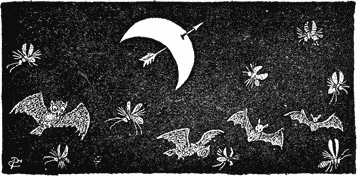
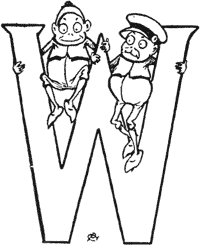
THE HUMAN OCTOPUS
SNOOPS AROUND
Watched by the admiring eyes of Dragonfel and his followers the Human Octopus wriggled and squirmed his way out of the enchanter’s palace. And, whether he flew through the air, or swam through the waters, to Queen Titania’s fairy kingdom, using his tentacles as propellers, is a matter for conjecture. But, at any rate, he got there with all tentacles. Whenever his suspicions were aroused, or there was the slightest doubt, he would hastily secrete himself among shrubbery or weeds, with which his mottled green sides proved a perfect match, so that as a whole he blended in admirably with the vegetation.
He did not have a heart, a rather sluggish liver performing[59] for him instead the necessary functions of the other organ, and, as he approached Queen Titania’s palace with due caution, it thumped with torpid pleasure.
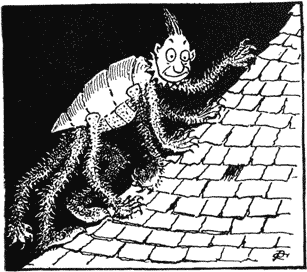
If there was anything he liked above all others it was sneaking, and the job which Dragonfel had given him presented most attractive possibilities.
Noting a gurgling brook in the proximity of the portcullis, he took great pains to soak the round pad-like ends of his tentacles in water so that when they were applied to a flat surface they would adhere through atmospheric pressure sufficiently to bear his weight.
In such a manner, when no one was looking, did the wily rascal climb up the high garden-wall and down the other side, wriggling and squirming with ill-concealed chuckles toward the palace.
Only the magic dove that Euphrosyne had left, which was preening itself on the edge of a fountain’s basin, saw him, with the result that it was strongly tempted to fly back to the Goddess of Mirth forthwith.
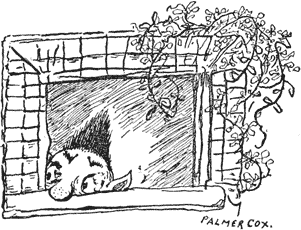
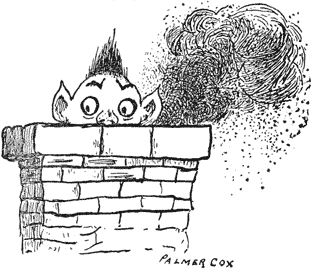
At the fountain the Human Octopus took the precaution to[60] again soak his multifarious pads in water, after which with his goggle eyes he cocked his head in a professional survey of the palace. Then he began to ascend one of its towering walls. Higher and higher, and still higher, he went in perfect safety until at last he gained the roof and squatted on the top of a chimney.
There he skillfully compressed himself to fit the dimensions of the flue, after which he began to let himself gently down like an elevator-car. A great volume of black, greasy smoke from the kitchen suddenly belched forth and hid him from sight.
It was not so long afterward that, all covered with soot, he crawled out of[61] the big open fireplace in the throne-room. Before he did so he made sure to satisfy himself that no one was there. But there was no telling when someone might come, and he knew it behooved him to secrete himself and instantly.
His goggle eyes oscillated in all directions around the room, and he craftily selected for his hiding-place a great tall clock that stood up close against the wall in a corner by itself.
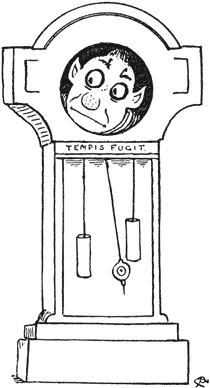
It was not a grandfather’s clock, for there were no grandfathers in Queen Titania’s kingdom. It was what might more properly be termed a grandmother’s clock.
The villain opened the door, and projected himself into the clock’s interior, being obliged in order to accomplish this to make his proportions squarish and oblong. His queer-looking head showed at the top instead of the clock’s face. Then with one of his tentacles glued to the door he pulled it back in its place.
“Now we shall see what we shall see,” he snorted. “I must be patient and bide my time.”[62]
The big brass pendulum swaying rhythmically to and fro with its measured tick-tock! tick-tock! kept hitting his stomach, and it tickled him so that it was all he could do to keep from laughing.
But he knew that he must not do so. If he even snickered he might betray himself. So he put a number of his tentacles over his mouth and tried hard to keep a straight face.
Now, though every month was a fair month, a rare month, for the murmur of the little streams was never hushed, and the fruits and flowers always were in bloom, with the skies mostly blue above them, and the winds soft and kind, May to the fairies’ way of thinking was the sweetest of all the happy year, and whenever it came round it was tendered a becoming ceremony.
The Eve o’ May was a holiday, though it might truthfully be said that every day was a holiday.
But at this particular time when all nature was at its best there were special observances that sprang from the gladness and exultation in all hearts, the very joy of existence, and the happiness that was manifested by every living thing.
Queen Titania and her fairies prepared for the innocent revels and dances that were to occur on a velvet sward some distance from the palace grounds, and their hearts were pleasantly thrilled by a notice with some pictures of Brownies that had been mysteriously tacked up in the neighborhood.
Marvelous was the flower-texture of the gowns donned for this gala occasion, and in her robes of blush-pink mossrose petals which swept away in a long, fragrant train Titania never looked more beautiful and charming.
Little old Dame Drusilda who resembled a human morning-glory,[63] with hat, bodice, and dress all like cornucopias, fumed, fretted, and ordered all the other fairies around.
“As I live,” the fussy dame declared, “we’ve forgotten to wind the big clock, and it’s almost run down. Violet and Daffodil, go to the throne-room, and attend to this before we start.”
The two good-naturedly ran to do her bidding, and when he saw them coming the Human Octopus had an uneasy qualm.
He hastily tried to distort his ugly face into a resemblance of the Roman numerals, and stuck up two tentacles for the hour and minute hands, but the deception was a poor one, and would not work. Violet and Daffodil set about to wind the clock, but, on looking up to note the time, they were confronted by a face twisted in an expression that the Human Octopus very foolishly thought invited confidence, but which instead sent them scurrying and hurrying with gathered-up flower skirts and ear-splitting shrieks from the room.
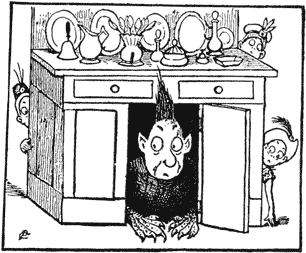
“I wonder what they’re scared of,” said the stupid fellow to himself. “Well, it isn’t the first time I’ve given folks a start in life. And now it behooves me to remove myself from here forthwith, if not sooner, for if they come back and catch me the jig is up!”
The tick-tock![64] tick-tock! of the pendulum reminded him that every moment was precious, so he scrambled out of the clock, and wig-wagged his way out of the room.
When he came to a fountain he lumberingly clambered up into the basin, and puddled around in the water to get the soot off, and once more as the dove watched him perform his ablutions it found it difficult to refrain from flying back to Euphrosyne.
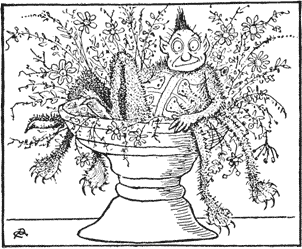
The Human Octopus peered through a lattice, but none of the fairies was in sight. Then he hustled up the garden-wall, and down the other side, finally secreting himself in a big floral urn by the portcullis, where he awaited further developments.
No one would have guessed he was there, for he seemed to be a part of the luxuriant green growth, and he even let his tentacles droop gracefully over with the branches and stalks of the palms and ferns to heighten the illusion.
Meanwhile Violet and Daffodil were telling a most harrowing story to Queen Titania and the rest of the fairies, but so frightened were they still that it was hardly intelligible. Finally[65] they were all prevailed upon to accompany the two to the throne-room to see for themselves.
Nothing was inside the clock, of course, but the brass works.
“It seems to me you both have very vivid imaginations, young ladies,” chided Dame Drusilda. “After this I would let Welsh rabbits alone.”
“It’s not there now, but it was there,” persisted Violet stoutly, “and it was the most dreadful looking thing you ever saw.”
“It was worse than that,” added Daffodil. “It was the most dreadful looking thing you never saw.”
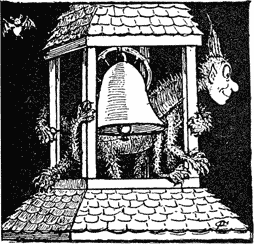
“Well, even if there was such a horrid creature, it’s gone,” said Queen Titania comfortingly, “so why should we trouble ourselves about it any longer? It’s time for our revels to begin, and if we don’t hurry up the ice cream will all melt, and remember there’s angel-cake, charlotte russe, and lemonade besides!”
The tiny Cupids, whose hearts were going pit-a-pat, for they believed implicitly every word that Violet and Daffodil had said, hastily gathered up Her Majesty’s train.
All started from the palace, the portcullis being raised to let them pass, and from his hiding-place in the urn the Human Octopus with his big,[66] gloating, goggle eyes noted every movement that they made. But they had no suspicion that he lurked among the palms and ferns.
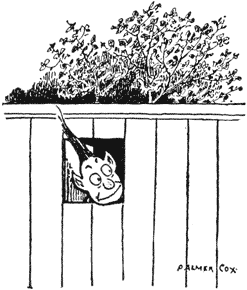
After they had disappeared from sight he flopped down, and keeping his eyes close to the earth followed the wee footprints that they made.
His sleuth-like, sneaky search led him straight to where the fairies sported on the green, and as he drew nearer to them he exercised more caution.
He compressed himself more closely to the ground, and picking out a luxuriant clump of peculiar rainbow roses whose leaves afforded a most effective screen he crawled to it to wait and bide his time.
As he watched the innocent, happy fays garlanded with fragrant, many-hued flowers pose and pirouette he could not deny to them with a certain grace that many enthusiasts would have pronounced most exquisite. But he had never been to dancing school, and he did not trip the light, fantastic tentacle himself.
He was greatly interested in all he saw, however, and even more so when at last he noticed Queen Titania, the Cupids, and several of the fairies leave the lithe, flushed, happy group. For Queen Titania had spied the rainbow roses, different from all[67] the rest, and ran with eager, sparkling eyes to fill her arms with them. Little she dreamed of the danger that lurked in all their perfumed radiance. Swiftly she came, outdistancing the others, and as she bent over in sweet, innocent pillage the mean, contemptible nature of the Human Octopus manifested itself. Forgetful of his diplomatic mission, he wound his tentacles around her until she looked like a mesh-bag. When she began almost instantly to scream he grimly increased the pressure. The fairies and Cupids, horrified beyond measure by what they beheld, and helpless to aid their beloved queen, fled with wild cries.
The Human Octopus tightened his cruel grip. Titania’s head fell back, her golden hair streamed over her shoulders, her eyes distended, and she could not get her breath.
Slowly but surely the Human Octopus was strangling her!
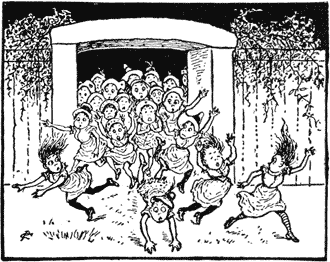
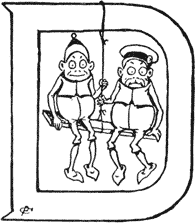
FLORIMEL IS ADOPTED BY
KING STANISLAUS
Delighted beyond measure were all the Brownies with Prince Florimel’s most amazing feat, and their pleasure manifested itself in broad smiles upon smug faces, the nodding of round little heads, the slapping of hands on each other’s backs, and the good-natured poking of fists in each other’s stomachs.
They pressed close to Florimel and kept wringing his hand in congratulation. Not even a Brownie could do what he had done.
All wanted to examine the bow that had accomplished a result so wonderful. But it was just like the ordinary bow of any archer, and its wood and gut presented no solution of the remarkable happening; it was no story, they saw it themselves.[69]
Then, noting that Florimel’s attire was torn in many places, and that here and there his fair flesh showed, they stripped him of his garments, replacing them with skin-tight trousers that with the greatest difficulty they drew over his legs, long, tapering shoes, a jacket with big buttons, and a pinnacle-shaped cap whose top could not sustain itself but fell over on his head.
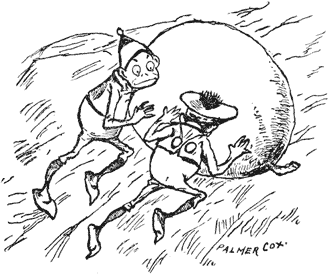
Many nimble hands attended to his valeting, and though Florimel observed that he was garbed as an ordinary Brownie, of which there were a large number, he was rejoiced at the eagerness they now displayed to transform him to a Brownie, and make him one of themselves. Yet he could not help thinking, as he glanced first at them, and then at himself, how different he was from them all.
Try as they might they could not bestow on him the pop eyes, big ears, and broad, distended mouth that parted in a smile so evident of inward satisfaction. He was as fair and sightly as one could wish to be, yet he would rather have looked like a Brownie. Only in size did he resemble one.
Some such thought must have been in the minds of the[70] Brownies too, for they seemed puzzled as they inspected their new comrade.
While they were making their first awkward overtures of friendship the attention of all was suddenly diverted to two ordinary Brownies rolling a watermelon up the steep hill. The melon was perhaps thrice their size, and they puffed and grunted over what to them was a herculean task.
Just when their labor promised to be light, with the crest of the hill almost reached, they stopped to take their breath, and in doing so relinquished their hold on the melon.
Bumpety-bumpety! it started rolling down the hill. Both ran after it in pursuit, then realizing that they were being distanced stood stock-still with horror on their faces. Bumpety-bumpety! came the big melon, with ever increasing momentum,[71] while the eyes of Florimel and all the rest followed its erratic course down the hill—bumpety-bumpety!—with leaps and bounds—bumpety-bumpety!—first to one side, then to another, bumpety-bumpety!—till it finished with an extra high bound and squashed all to pieces right in their very midst. Little jets of sweet water shot in all directions from its sides as though projected from[72] a syphon, and out from the juicy, luscious, red pulp exposed to view there crawled sheepishly on his hands and knees a little weazened old fellow who wore an ermine cape and gold crown.
“Hail, Your Majesty!” shouted all the Brownies, and the little old fellow stood up, rubbed himself, and said, rather ruefully:
“No, I’d rather reign!”[73]
Then the Brownies, under the leadership of the Dude, yelled, in perfect unison:
“Thanks!” graciously acknowledged His Majesty, adding by way of explanation:
Then a puzzled expression came to his face as his eye suddenly observed Florimel.
“Why, who’s this fellow?” he demanded. “You’re not trying to make a Brownie of him, are you?”
Florimel’s heart sank, for he realized that here was the king himself, whose word was absolute law to all these little people.
If he frowned down on any plans they had made in his behalf, all the hopes that had sprung up in his breast would be ruthlessly shattered.
The Brownies seemed troubled too, for they would not have brought displeasure to King Stanislaus for all the world.
While the new-comer stood looking timidly down, without daring to meet the questioning gaze of that kindly but august monarch, his little companions made bold to extol his virtues real and imaginary till their tongues were all wagging at such a great rate that Florimel could not help but furiously blush.
First they pointed to the crescent moon, still pierced by the arrow, averring earnestly that it was Florimel’s accomplishment, and the sudden start King Stanislaus gave when he beheld this marvel showed that he was properly impressed.[74]
Then they called his attention to the eagles’ nest high up in the tree, explaining that it was there they first saw the stranger, after which they waited anxiously as did Florimel to hear what His Majesty would say.
King Stanislaus looked not displeased, and one and all took heart.
“If Moses was found among the frogs, and Romulus among the wolves,” said the monarch, with great deliberation, “then an eagles’ nest is a fitting cradle for a Brownie prince!”
This speech caused the Brownies to burst into a sudden wild cheer that made the welkin ring, for they realized that not only had King Stanislaus set approval on what they had done, but he had gone much further.
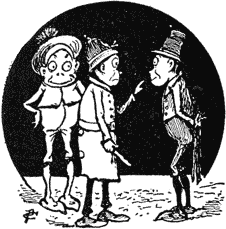
He had made Florimel his heir by adoption, and successor to the Brownie throne! “See that he is properly attired,” was the royal command, and once more Florimel’s appearance underwent a swift and startling change.
From some invisible source fresh wardrobe was supplied, and from a plain, ordinary Brownie he was transformed into a handsome, dashing little prince as pert and pretty a sprig of royalty as one could see in many a long journey over lands where there were kings and queens with large, flourishing families—in[75] trunks, doublet, and cape, with a cap that perched jauntily upon his roguish curls.
Filled with gratitude was he over this great, this unexpected honor that had befallen him and he expressed his thanks as best he could feeling that the words he used were poor at best, but vowing loyalty and obedience in all things evermore to his gracious foster-parent.
“It will not be so very long, my son, before you occupy the throne,” said King Stanislaus, and his voice took on a rather pensive tone. “A few short years—a couple of thousands or so—and I shall have passed away. When I am gone I shall leave to you all-out-doors and the love of children, a priceless heritage which you must treasure tenderly and never lose.”
Then came the Brownies with pledges of fealty to their prince, and Florimel smiled back into their smiling faces, while all were glad.
The Policeman limping slightly came and offered him his club, but Florimel good-humoredly refused it, and waved him aside. The Sailor came next with his spy-glass, but Florimel laughingly declined it also.
Each of the band in a free-hearted way evinced a desire to surrender to him his most cherished possession, and much touched was he by their expressions of good will. But the most he would accept was an eagle’s feather which had been dropped by one of the birds to the ground, and which the Dude stuck in his cap.
Soon matters took on their usual routine, and, noticing that the Policeman limped, King Stanislaus asked:
“Officer, what’s the matter?”[76]
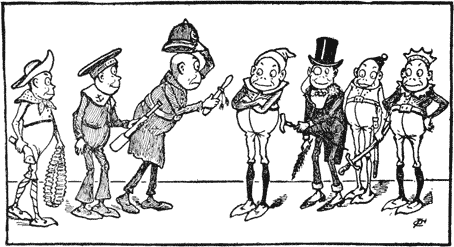
“I fell off the palace-wall last night, Your Majesty, when I was tacking up the placard.”
“What did you fall against?”
“I fell against my will. One of the fairy guards mistook me for an enemy, and fired a charge of shot at me.”
“Did you press a complaint?”
“No, I withdrew the charge.”
Into an admiring group some distance off the well-informed Dude was instilling the first principles of etiquette.
“It is not good form to try to eat your peas with a knife,” he told them. “You should spear them with a fork.”
And the Sailor was growling to the German:
“Avast there, you lubber! A dog-watch isn’t a chronometer.”
The Indian with a flourish of his tomahawk came running to King Stanislaus, and imparted the surprising intelligence:[77]
“The dromedary’s swallowed all the door-knobs, and the knobs are in his stomachs.”
“Which one of his stomachs?”
“I don’t know, Your Majesty.”
“Can’t you see which looks the knobbiest?”
Florimel could not but admire the shrewdness of King Stanislaus in disposing of all matters great and small, and he did not feel that he could ever reign and be as wise as he.
The little monarch held his subjects under most admirable control, and in arguments that sometimes rose between them one word from his lips would effectually settle all dispute.
And so they wandered on and on, hiding away from sight ere the first rays of the morning sun could strike them, and sallying forth again when the stars began to shine at night.
Many a harmless prank they played, and helpful deed they did, in which Florimel took hearty part, and he grew to love them more and more, as they did him.
One thing was a source of great surprise to him, yet, after he considered, it was not surprising, which was that all dumb creatures, whether of the fields or air, were the Brownies’ friends, and loved them.
In countless ways they all evinced delight whenever these good-natured little goblings were at hand, for they knew that they would help instead of harm them.
Even the savage animals that had so lately thirsted for Florimel’s blood proved tractable, and neither they nor the Brownies showed the slightest fear of each other. The beasts grovelled and rolled over with pleasure when the Brownies playfully yanked and pulled their tails.
All was harmony between them, and the industrious animals[78] went on with their task of gathering bones without caring whether the Brownies were near or far.
So on they fared with light hearts that had never a care. The country grew less wild and mountainous, till there were emerald fields, green copses, and flowers blooming everywhere. The sweet, caressing air had just a soft reminder of the sea in it.
And, while they hid away one day in a leafy covert, while the birds in the branches round them were pouring their hearts out in gladness, piercing screams suddenly rent the air, and[79] caused all great alarm. “Let us make haste!” cried Florimel, springing to his feet. “There is danger in that cry!”
But when he started King Stanislaus tried to hold him back. “Have a care, Florimel!” he warned. “It may be a decoy to entrap us!” “Let me go!” said Florimel, struggling.
He broke from King Stanislaus’s kindly, well-meant grasp, and ran with might and main in the direction from which the terrifying sounds still came. The Brownies looked at each other in great dismay. Into what danger had their beloved Prince Florimel so recklessly plunged, and would they ever see his face again?
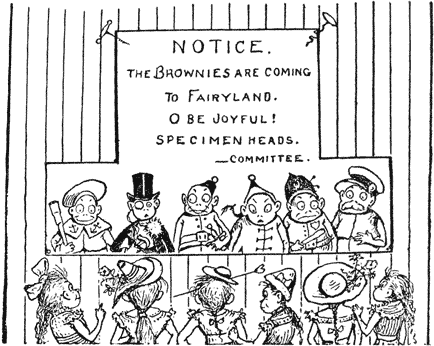
QUEEN TITANIA’S
GREAT PERIL
Prince Florimel sped with the fleetness of a deer in the direction from which had come those agonizing cries for help.
As he fairly flew over the ground he saw the fairies and Cupids who had been Titania’s companions, and they pointed in a frenzy of alarm to the clump of rainbow roses in the midst of which their unfortunate queen was in the clutches of the dreadful Human Octopus.
The monster was still tightening his vise-like grip, and tortured by the pain of his loathsome embrace, Titania was fast relapsing into unconsciousness. [81]
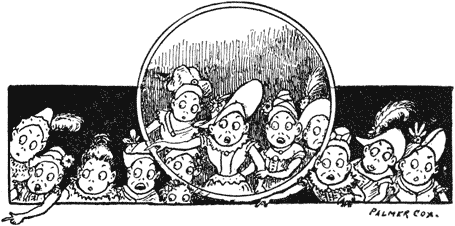
Florimel drew near, and was aghast at what he beheld.
As his eye took in the frightening spectacle he realized that there was not a moment to lose.
Quick as a flash he whipped an arrow from his quiver and placed it to the bow.
He aimed the arrow straight at the Human Octopus, and back to its greatest tension pulled the cord.
Once again the cord proved true, and the speeding arrow cleft the Human Octopus in twain.
His shell fell instantly apart, and from the interior there flew away into space a vapory-looking object with a long, trailing red cloak that had all the lightness and airiness of gauze.
Dumfounded was Florimel by this most unexpected and amazing sight, but there were other matters more urgent and pressing to demand his immediate attention.
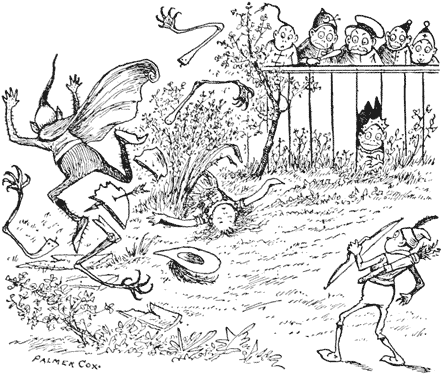
With her strength almost spent Titania reeled and seemed about to faint, but Florimel sprang to her aid, and sustained her in his arms.[82]
He strove to assure her that there was nothing further to fear until at last she began to recover her composure. “Noble prince,” she murmured, in tones that thrilled him, “you have saved my life, so henceforth it is yours!”
Florimel sank upon one knee before her, and kissed the pink finger-tips of the dainty hand she extended to him.
Looking up into her face, he thought he had never seen anyone so beautiful as she, while her tiny heart throbbed faster at the sight of him in all his gallant trappings, and she was very sure she had never seen anyone so handsome.[83]
Then came in the greatest excitement all the fairies and Brownies, for these latter little people when Florimel left them had followed close upon his heels to aid him if need be, since, in spite of mystic power that had temporarily passed with night, they were too brave to desert a comrade when danger threatened.
The horror and fear of what they had just witnessed was too much for many of the fairies, and the kind-hearted Brownies had the interesting task of conveying[84] some to places of safety, where they could receive proper treatment. In this work even the Chinaman willingly assisted.
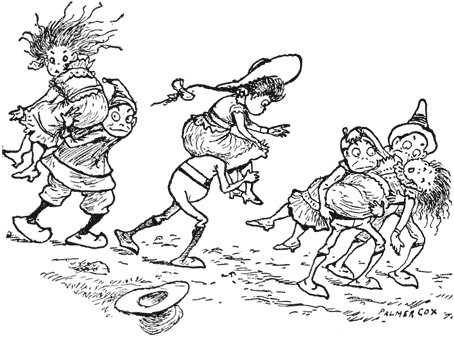
A group of curious sprites with much interest inspected several of the creature’s tentacles, while Queen Titania’s overjoyed subjects crowded around Florimel with such profuse expressions of gratitude that he was much embarrassed.
“What did I tell you?” cried Violet, and “What did I tell you?” echoed Daffodil, while all with much timidity examined the green, mottled shell that lay in halves upon the ground. “That was the horrid thing we saw in the clock.”
“Well, never mind now,” said Queen Titania, with a sigh of relief. “The monster will not trouble us again.”
In spite of what the queen said, Florimel was not so sure[85] that they would have no more trouble, since he had seen the wraith-like Red Spirit fly from the shell of the Human Octopus off into the air.
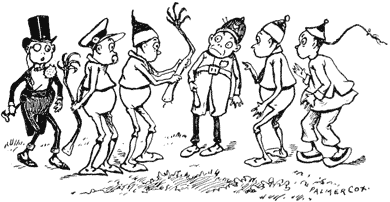
Somewhere he feared this strange, evil being lurked to wreak further harm. Not wishing to cause uneasiness to Queen Titania, however, he said never a word.
Then Brownies and fairies mingled together in happy, joyous mood. But Florimel and Titania withdrew from all the rest, and had eyes only for each other.
“I think I can guess how all this is going to end,” said the Policeman to the Sailor, in a voice that showed great resentment.
“Avast, you lubber!” sharply reproved the Sailor. “Now what d’ye mean?”
“I mean that Florimel has fallen in love with the queen, and will marry her.”
“How can he? Florimel is a Brownie, and Brownies never marry.”[86]
“But Florimel is not a real Brownie. He’s only been taken into the band. Just look at them now!”
The Sailor cocked his eye to where Florimel was bending over Titania, with his head very close to hers.
“Shiver my timbers!” he cried. “They do look orange-blossomy!”
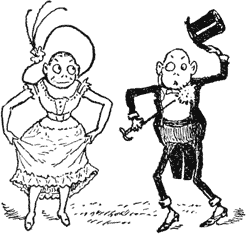
Noting the impression Queen Titania was making upon Prince Florimel, Dame Drusilda determined to exercise her arts upon the immaculate little Dude, with whom she was very much taken.
“I hear,” she remarked to the Student, “that he is connected with the best families.”
“Yes,” he replied, rather enviously, “he sometimes is by telephone.”
But as soon as she could do so she joined the group in which the Dude held forth vivaciously, and when opportunity presented itself contrived to say:
“Ah, sir, in your pretty ways you remind me of the gallants of old times!”
“You must be able to remember quite far back,” he said, as he looked at her through his monocle.
“Forsooth, kind sir,” she hastened to say, “I only speak through hearsay. What I know my great-grandmother told my grandmother, who told my mother, who in turn told me.[87] As you can plainly see I am different from other fairies. They call me a beauty of the old school.”
“Hasn’t school been out a good many years?” he asked.
“I fail to comprehend you,” she said, with a blush. “Mayhap you are not susceptible to beauty. Yet I have heard it often remarked that a beautiful woman can make the strongest man go down on his knees.”
The Dude gave his cuffs an admiring glance.
“So can a collar-button!” he said.
The day passed in sports and merry-making, followed by other days in which the Brownies remained in close proximity to the palace. During all this time Florimel and Titania were much together, and their attachment for each other was remarked by all.
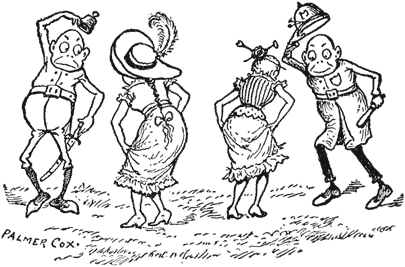
The Brownies, growing uneasy over the thought that they[88] might lose their new companion to whom they had become so friendly, were eager to move on in quest of fresh scenes and adventures.
King Stanislaus, with the belief that this might be a passing fancy on the part of Florimel, humored his wishes, and ordered the band to remain. When he reached the definite conclusion that it was not, he said:
“My son, we have been here now quite a long time. Do you not think we had better seek some other place where we can do good?”
Florimel’s face showed his disappointment.
“No matter where one may be,” he said, “there are always plenty of opportunities to do good. Why not continue here, where we are all so happy?”
“I hope to make Titania my wife,” said Florimel simply.
“And where you are happiest of all,” said His Majesty, with a knowing wink. “Ah, Florimel, my boy, your whole life-story, like nearly every other man’s, may be summed up in just these three words: hatched, matched, dispatched! Tell me how far matters have gone.”
He looked anxiously at King Stanislaus’s face, as though he feared to see displeasure written there, but the genial, encouraging smile upon the royal countenance caused him to take heart.
“I shall be sorry to lose a son,” said the kindly monarch, “but I shall be rejoiced to gain a daughter. Frankly it has always been my great desire to have an alliance of the Brownies and fairies, for together we can do more good than if we worked alone. But until you came I never knew how this could be effected, for Brownies can never marry.”[89]
“Much pleased am I by those words, Your Majesty,” said Florimel. “I do not deny that I wish to be with Titania, for my feelings as far as she is concerned are too plain to be disguised. Still it is not alone the joy of being near her that causes me to wish this, but the thought that harm may come to her at any time, in which case I might be able to be of service to her.”
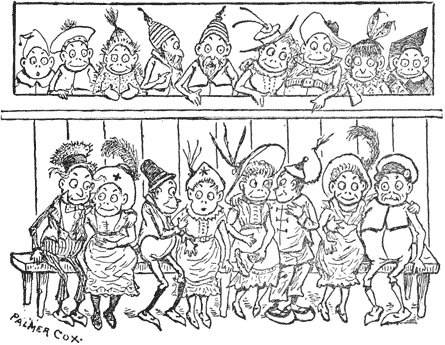
King Stanislaus seemed very much surprised.
“Harm!” he repeated. “What harm can befall her?”
“You forget the great danger she was in from the Human Octopus,” reminded Florimel.
“But the Human Octopus is no more,” said the king.[90] “There is nothing to fear on that score, drop him from memory.”
“Still Dragonfel the enchanter has made his threats,” said Florimel. “They may be wild, foolish threats, yet they cause me great uneasiness. I fear for the queen because of him.”
Then he told the king for the first time how the Red Spirit, after the Human Octopus had been cleft in twain by the magic arrow, had flown away into the air, to bide his time, perhaps for further mischief and wrong-doing.
His Majesty’s little weazened face turned very grave at the recital.
“Still, Florimel, I would not worry,” he said. “I will caution all the band to keep a sharp look-out for the rascal. And do you, my son, woo and win, Titania, for my blessing will fall upon you both.”
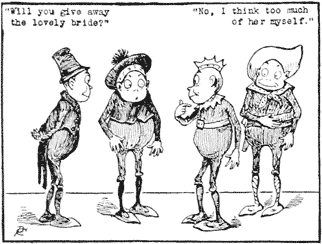
To that end Florimel exerted himself, but it was an easy task, since Titania loved him fully as dearly as he her. So when they were seated once at twilight on a stone bench in the palace-garden, very close to each other, he asked the question ever trembling on his lips, and she did not say him nay.[91]
Then Florimel took a slender circlet of gold and placed it on her tiny engagement finger. But, while she first looked at it, then pressed it very tenderly to her little red pouting lips, the Red Spirit suddenly darted from behind the bench, where he had been eavesdropping all the while.
Before Florimel could reach for an arrow the other flew off in the air and disappeared.
“What was that?” Titania cried, in great alarm.
Florimel strove to ease her mind, though he was much alarmed himself.
He felt that the Red Spirit was going to make trouble.
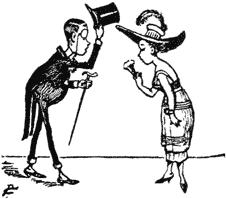
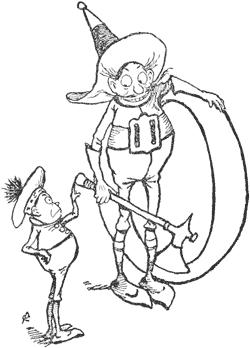
THE COMPACT WITH
VULCAN
Over the sea Dragonfel the enchanter waited with increasing impatience for the Human Octopus to return with whatever information he might glean in his prowling, sneaking manner. When his grotesque emissary did not put in a prompt appearance he grew more surly and ill-humored than ever. He vented his rage upon the poor little mine-sprites by increasing their working-hours and decreasing their allowance of carrot-tops and potato-skins.
Whenever he spoke to his followers their knees knocked together with fright. At no time was he gentle, but when he[93] was particularly violent, which was nearly always, he was a very bad person who could be well avoided.
So he became even crankier and crosser-grained than ever, till all around him quaked with fear. He wondered why the Human Octopus did not come back, and his inexplicable delay filled him with ungovernable fury.
“He’s not attending to business,” he said, grinding his teeth with rage. “Instead of snooping he’s just going around, and having a good time. But wait till he gets back, and I’ll show him!” As he spoke these words he happened to be in his throne room, and he went to the open window to look out.
It was a wild, terrible night, but the worse the weather was the more Dragonfel liked it.
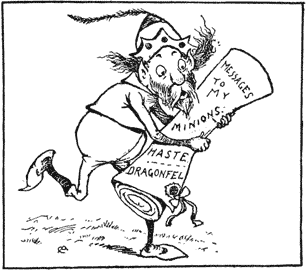
The lightning zig-zagged all over the inky black sky, the thunder roared, the wind howled, and the rain beat down in slanting torrents.
“Vulcan must have some little job on hand,” Dragonfel pondered, as he returned to his throne.
Scarcely had he done so when there came a sudden fierce gust of wind that blew the Red Spirit through the window[94] right to his very feet where he cringed and grovelled and fawned in the most abject manner.
“How now, you rogue?” roared Dragonfel above the storm. “Where have you been, and what has kept you? Why have you not returned as you went? Answer, villain, or it will go hard with you! I will have you strung up by the finger-tips till your toes barely touch the ground and beaten by a thousand and one whips!”
“Oh, master, kind master,” gasped the Red Spirit, trying to catch his breath, “wonderful things have I seen, and wonderful things have I to tell you. So incredible are they that you may not believe me, yet I do assure you most positively that what I am about to relate is the truth, the whole truth, and nothing but the truth. I would never have believed them myself had I not seen them with my own eyes.”
“Omit all this long, unnecessary preamble,” growled Dragonfel, in great disgust, “and get down to hard facts. What have you discovered?”
“The Brownie prince is to wed the fairy queen!”
Dragonfel’s face went from scarlet to white, then from white to scarlet, then back to white, and then to scarlet again, just like the flashing of a vari-colored electric sign.
“How do you know?” he asked, trying to control his temper. “Who told you?”
“No one,” said the trembling Red Spirit. “I saw him place an engagement-ring on her finger.”
“Well,” declared Dragonfel, in a tone of the utmost brutality, “if they are planning to get married all I’ve got to say is they’ve got another guess coming!”
“Who will prevent the marriage, kind master?”[95]
“I will prevent it!” irascibly shouted the enchanter, and he clapped his hands together in an imperious way. “What ho, without there! Here’s a pretty kettle of fish! Come hither instantly!”
Grouthead, Mandrake, Boundingbore, Wolfinger, Snoutpimple, and others were out in an ante-room, and they almost tumbled over each other in their frantic haste to answer the peremptory summons.
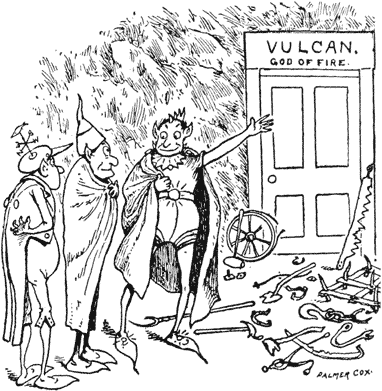
“Put on your storm-cloaks immediately,” ordered Dragonfel. “I want you to come with me to Vulcan’s.”[96]
“It’s a terrible night to be out, kind master,” ventured Grouthead, with a shudder.
There came a flash of lightning and a crash of thunder more terrifying than any that had gone before.
“What’s the matter with the night?” snapped Dragonfel. “I don’t see anything wrong with it. I call this particularly pleasant weather.”
“Yes, it’s all right now,” Grouthead hastened to say.
So in their long, flowing cloaks they all sloshed out in the wind and rain, while the hearts of those who followed after the enchanter quaked and quailed as they plunged on through the pitch-black darkness of the night.
The wind howled and shrieked with increasing fury, the lightning grew sharper, and the peals of thunder more deafening, so that their eyes were nearly blinded, and their ear-drums rang.
Now not so very far from Dragonfel’s palace Vulcan whom they had set forth to see had his cavern.
It was a very modest establishment indeed, considering the prodigious results that he achieved, and the wonder was that in such cramped quarters, and with so few to aid him in his work, he could do as much as he did.
The cavern was down by the sea, in among huge rocks and boulders, and over the door, in very modest lettering, was the business sign: Vulcan God of Fire.
Inside was a forge with bellows such as any country blacksmith has, and here Vulcan manufactured earthquakes and volcanos at will.
He could create seismic disturbances all over the world, in a trice throw Vesuvius into hysterical contraptions, or make[97] things suddenly red-hot in Mexico or the British Honduras. His wares were known in every quarter of the globe, and he didn’t even so much as advertise.
On this particular night he stood as usual at his forge—a great big, husky, bearded fellow in a red flannel undershirt bared at his brawny, hairy chest, and with sleeves rolled almost up to his shoulders to give the tremendous muscles of his arms full play.
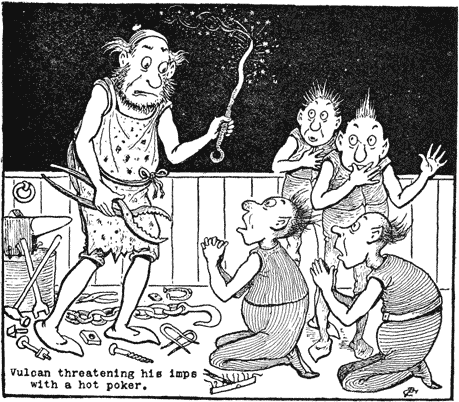
He wore a round leather cap and had on a leather apron[98] tied to his burly waist by leather thongs. Things needed touching up a bit, and he was getting busy.
“Where are those lazy ’prentices of mine?” he roared, in rumbling tones, as he pumped the bellows, while the flames in the forge leaped higher and higher. “Spry, Flash, Nimble, Twist, and the rest of you—where are you, I say? Has my voice grown so weak, you rogues, that you cannot hear me? Come hither this instant!”
From all directions in response to the angry summons came imps in red attire that fitted their lithe, supple bodies as snugly as the skins of eels.
They somersaulted down the chimney, popped up like jack-in-th’-boxes from the earthen floor, and described parabolas through the air from the cavern’s ceiling, grouping themselves humbly on their knees before their irate master, with their arms supplicatingly extended.
“Here at last, are you?” again roared Vulcan. “And none too soon, either! Where have you been, imps? Idling your time away? Quick! heap coals on, all of you, or the fire will be out!”
Forthwith they flung balls of living fire into the forge, and, as Vulcan pumped away at the bellows, he burst out in lusty song:
The lightning flashed, the thunder crashed, and over all the storm was heard a voice calling: “Vul-can! Vul-can!”[99]
Vulcan stopped work while his imps crept stealthily toward the door to listen.
“Is Vulcan at his forge?” was shouted in the wind and rain outside, with the accompaniment of a terrific knock on the door.
“Who dares disturb me on my busy night?” cried Vulcan, in a towering passion.
“It is I, Dragonfel, the enchanter,” said the voice placatingly.
“What brings you here?” asked Vulcan.
“I come on business of great import, mighty Vulcan!”[100]
“Enter, then, and be brief,” said Vulcan, with scant hospitality. “Remember I have work to do.”
Dragonfel and his followers thereupon appeared in the doorway, and came forward escorted by the imps who evinced the greatest curiosity in the strange, rain-soaked visitors.
When they were within respectful distance of Vulcan the enchanter sank on one knee before him, and the rest immediately followed his example.
“Why have you sought me out?” demanded Vulcan, with distrust and suspicion on his seamed, rugged face as he sharply eyed them.
“Oh, Vulcan,” spoke Dragonfel, in smooth, oily tones, “powerful as I am, I acknowledge you my master. Who else can match you in your wondrous strength?”
“You’ve come for a favor!” grunted the other. “Well, out with it!”
“I wish to tell you about the Brownies.”
“What about the Brownies?”
“There is to be a marriage in Fairyland. The Brownie prince is to wed the fairy queen!”
“Bah! How does this concern me?”
“It should concern you. Listen, Vulcan! There is no authority for such a marriage in all the annals of mythology.”
The words created a deep impression upon Vulcan.
“No authority?” he repeated slowly, as though he were mentally digesting what he had just heard. “Are you sure of this?”
“There is none, I tell you,” insisted Dragonfel emphatically. “It is enough to arouse the anger of the high and mighty gods. My own power will be diminished, if not lost, should this union[101] take place.” “Are you using any measures to prevent it?” asked Vulcan thoughtfully. “Aye!” was Dragonfel’s decided response. “I am going across the sea with these followers of mine to interfere. Can I rely upon your powerful aid should I need it?” “How can I help you?” “If I call upon you will you convulse the earth, and rouse to fury the slumbering volcano?”
“Trust me for that!” cried Vulcan, beginning to pump the bellows. “The element of fire is still my own, to use at will.”[102]
A lightning-bolt hurled itself right in their very midst, and the resultant thunder-clap brought Dragonfel and his followers to their feet in sudden alarm. “Enough!” cried Dragonfel exultingly. “It is a compact, then!”
“Here is my hand on it!” said Vulcan, and he crushed that of the enchanter in his grimy fist. “Spry, Flash, Nimble, and Twist, my crafty imps, shall go with you. Through them appeal to me. But what do you propose to do?”
“I have a plan, and a good one too!” said Dragonfel, in a confidential manner. “You can depend upon it, rats will eat the wedding-cake!” Vulcan’s fancy was so tickled that he laughed hilariously, and Dragonfel made bold to slap him in a familiar way upon the back. “Ho! ho!” Vulcan chuckled. “So rats will eat the wedding-cake, eh?”
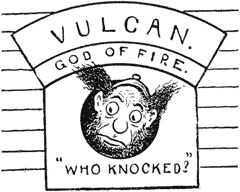
“Yes,” Dragonfel went on. “We’re going to the wedding, gain their confidence with fine presents, and then—”
“Yes,” said Vulcan, very much interested. “And then—?”
Dragonfel leaned over and whispered something in Vulcan’s ear which caused him to start back in surprise. “No!” he involuntarily exclaimed. “Do you think you can do it?” If Florimel and Titania could have heard the diabolical plan of the enchanter all the happiness would have vanished from their hearts.
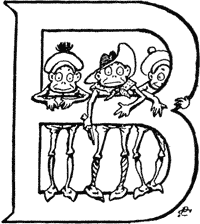
THE STRANGE
WEDDING-GUESTS
Bright and fair dawned the wedding-day of Prince Florimel and Queen Titania.
Though all the days vied in beauty with each other, this one seemed to be more radiant with grace and loveliness than usual, for every living thing loved the happy little lovers and all Nature rejoiced with them.
The skies put on their tenderest blue, the sun scattered even more of its golden treasure, the winds grew more balmy and caressing, while the flowers were prodigal with perfume, and the birds were tireless with their joyous serenades.
Though the ceremony was not to be performed till eve, still the fairies were busy with their preparations at sun-up, and the palace fairly hummed with their activities.[104]
Long banquet-tables had been arranged in the throne-room, and on snowy napery were dishes, cups, and saucers fashioned with quaint exquisiteness from flowers, and there were lily chalices of sparkling dew with which to pledge the health of the happy bride and groom.
In the kitchen a host of willing workers were being directed by little Dame Drusilda, and their conscientious efforts showed in ice cream with fruits of all flavors, charlotte russe, mince pies, plum puddings, all kinds of berry tarts, old-fashioned strawberry short-cake, peach cobblers, and apple dumplings. For the menu of the fairies was composed almost entirely of the most delicious desserts imaginable, and they ate what they wished, and as much as they liked, without ever getting the indigestion.
So the day wore on toward dusk, and, though to all the others, each hour seemed a minute, and each minute a second, Florimel and Titania in their impatience thought that it would[105] never end, the very sun seemed to stand still, as upon Gibeon.
He had left the Brownies to their own devices to be with her, and while they talked of their union now so close at hand both were arrayed in their fine wedding-garb.
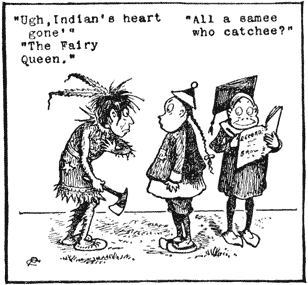
“Are you happy, Florimel?” she asked him, for the thousandth time.
“Happier than words can say,” was his fervent response.
“And you’re sure you’ll never regret it?”
“Yes, positive, Titania. I wonder what’s keeping King Stanislaus and the band. They ought to be here by this time.”
“Oh, Florimel, my happiness would be complete were it not for the thought of Dragonfel.” At the mention of the wicked enchanter’s name he gave an involuntary start.
“We mustn’t borrow trouble on his account,” he said, trying to speak lightly. “He’s across the sea where he can’t hurt us. Let us think instead of our approaching happiness.”
Then fairies came skipping and running from the palace, clapping their hands in sheer delight, cheering, and waving tiny handkerchiefs at a great rate. And windows gay with flags[106] and bunting filled with flushed, eager, excited faces all looking out, while the Cupids were lifted up in arms so they could better see.
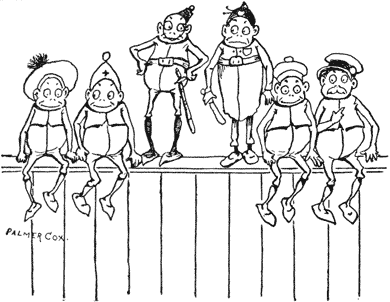
“The Brownies must be coming!” cried Florimel to Titania. “Let us go up on the palace-steps where we can get a view of them.”
He gallantly offered her his arm, and escorted her to a position with the rest, from which they could obtain a glimpse of the road as it wound curving away, with the blue, dimpling sea beyond.
Down the road came the joyous band, with hearts attuned to merry-making, and never was a jollier procession.
Beasts and birds alike had freely offered their services toward making this grand entree as triumphantly imposing as possible,[107] and in the long frisking, frolicking, cavorting line of march were lions, tigers, elephants, camels, zebras, ostriches, emus, cassowaries, and many other creatures of field, forest, and jungle, four-footed and two, whose backs bore willingly the burden of the gay, laughing sprites.
[108] But Florimel could not see King Stanislaus among them, and was much puzzled thereat. When later they were gathered together, within the garden-walls, and the beasts and birds had gone away, after eating all the charlotte russe they could, he inquired the cause of His Majesty’s absence.
“He’ll be here later,” the Student explained. “He had some pressing engagement with the Policeman, and they went away together.”
Suddenly there came a banging on the portcullis so loud that it seemed to be made with big wooden mallets. Brownies and fairies looked at each other in consternation and surprise, while many a tiny heart began a vigorous thumping.
“What’s that?” cried Queen Titania.
“There are strangers outside the portcullis, Your Majesty,” said the fairy guard, as she squinted with one eye through the peek-hole.
The banging continued with greater insistence, and, advancing close to the portcullis, Prince Florimel shouted:
“Who are you, and what do you want?”
“We are friends who have come to the wedding,” said a mild, gentle voice from outside, “who have come to the wedding.”
“Well, I like that!” exclaimed the Dude, in great disgust. “Whoever gave them an invitation?”
“We have brought you some fine presents,” the voice hastened to add.
Florimel seemed undecided.
“Shall we admit them?” he asked the rest.
“Avast, messmate!” growled the Sailor. “You’d better have a look at the presents first!”[109]
“There’s nothing to fear,” said Titania sweetly. “Bid the strangers welcome.”
The portcullis was straightway raised, and in trooped a queer, motley crowd. They were attended by four grinning imps in red who varied their walk with somersaulting antics, and the arms of all but the leader were full of presents.
These evidently had been selected with much care and thought for the wedding, and the same taste and judgment were shown that can be found in nearly all weddings.
One of them had a gigantic pair of scissors which would have taken as many as a half-dozen Brownies or fairies to cut with. Another held a cradle big enough to hold the offspring of a giant.
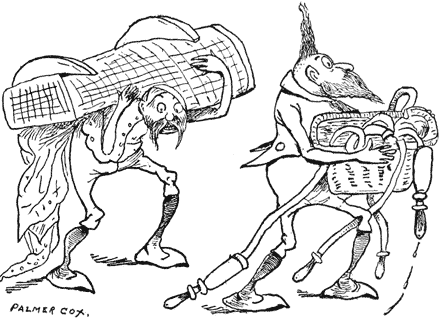
A third in a cage carried a hen which was alleged to lay three strictly guaranteed fresh eggs a day. From each hand of a fourth dangled an immense round clock, and the faces of them were lettered: FALSE ALARM. MADE IN DEMONLAND. A fifth had a pair of abnormal candle-snuffers. Others had gifts equally absurd and useless.
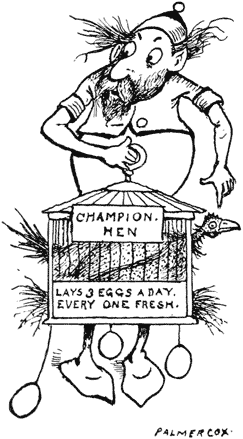
At the instigation of the leader all grouped themselves in a semi-circle humbly before the bride and groom to-be, and Florimel, who was still somewhat suspicious, asked:
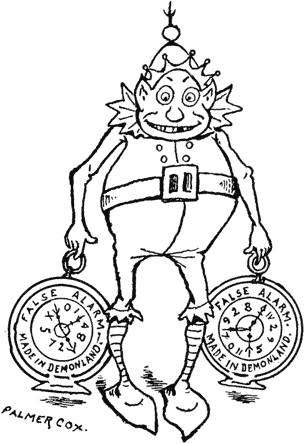
“What do you want?”
“We are friends,” said the leader, in his gentle voice, “most anxious to pay homage to you.”[112]
“If you are friends,” said Florimel, “we shall be glad to have you join in our festivities. Do you dance?”
All shook their heads in unison.
“Don’t you tango or do the fox-trot?”
Again they shook their heads.
“Or sing?”
They still shook their heads.
“But just you wait till you see them at the supper-table!” said the Dude decidedly.

“Nevertheless,” said Florimel kindly, “I trust we shall find some means for your enjoyment. Have you come far?”
“Yes,” said the leader, “many leagues to do you honor. We crave your acceptance of these few, simple, unpretentious gifts[113] as a trifling evidence of the distinguished consideration and esteem in which we hold your fair bride and yourself.”
It was plain that he had first carefully prepared and then committed to memory such a flowery speech.
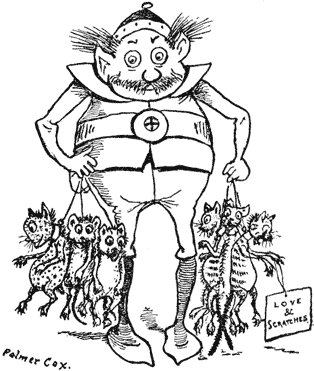
In their curiosity to examine the presents the Brownies began to circulate among the strangers.
When in doing so the Chinaman thoughtlessly put his head between the open scissors-blades the big, hulking fellow who held them could not repress an evil inclination, and snapped[114] them together almost instantly so that the head was held between them in a vise-like grip.
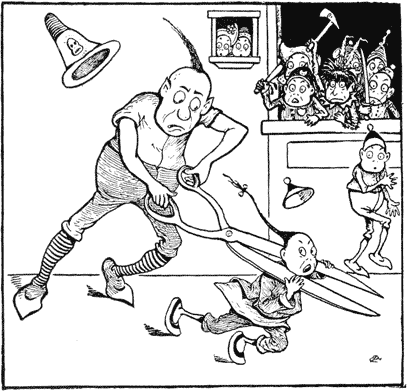
Taking note of this another who had the snuffers clapped the hood forthwith over an ordinary Brownie so it looked as though he did not have a head.
The leader angrily stamped his foot for them to desist from such rude, ill-mannered antics, whereupon the one reluctantly released the frightened Chinaman, while the other removed[115] the snuffers from Brownie’s head.
“You must be weary and travel-stained from your long journey,” said Florimel, not knowing what to think.
“If you will come with me,” said Titania hospitably, “I will see that your wants are provided for.”
The new guests at a signal from their leader rose, and when he bowed his acknowledgment of the proffered courtesy they clumsily followed his example, while the imps gloatingly patted their stomachs.
Titania motioned to Dame Drusilda, Violet, Daffodil, and some other fairies to accompany her, and they led the strangers up the steps into the palace.
Florimel was strongly tempted to follow, but just then King Stanislaus and the Policeman arrived very much out of breath.
They had come singly, and from opposite directions. Just outside the portcullis the Policeman had overtaken His Majesty, and they entered the palace-garden together.
“Officer,” said King Stanislaus, “have you anything to report?”
“Yes, sire,” said the Policeman, twirling his club. “The[116] path I took didn’t keep straight. My footsteps got so crooked that I had to arrest them.”
“What did you discover?”
“Nothing.”
“What was it?”
“I said nothing, sire.”
“But nothing’s something.”
“No, it’s nothing.”
“If it wasn’t something then it wouldn’t be in the dictionary. But it’s no use to argue with you. Did you find a clue?”
“Yes, a good one.”
“What is it?”
“He wasn’t in any of the places I gum-shoed to, so consequently they’re eliminated. The deduction I’ve arrived at is that he’s in some other place. As he can only be in one place there’s only one place to find. That’s easy.”
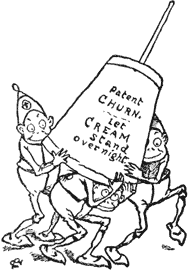
“Of whom are you both talking?” asked Florimel curiously.
“The Red Spirit,” said King Stanislaus. “We’ll catch him yet. But the lovely bride—where is she?”
“In the palace, Your Majesty, providing for some newly arrived wedding-guests.”
“Well, after you’re married, Florimel,” said King Stanislaus seriously, “you must be careful your wife doesn’t lose her mind.”[117]
“Nonsense!”
“No nonsense about it. It often happens to a married woman.”
“How so?”
“Sometimes she keeps on giving her husband a piece of her mind till finally she hasn’t any mind left.”
Suddenly Mignonette and Jassamine, ladies-in-waiting to the queen, ran shrieking from the palace.
“What’s wrong?” cried Florimel.
“The queen!” gasped Mignonette.
“Yes, the poor queen!” said Jassamine, almost in hysterics.
“Speak!” urged Florimel. “Has anything happened to her?”
“Alas!” wailed Mignonette. “She is gone!”
“Gone!” echoed Florimel, distracted. “Gone where?”
“We know not,” said Jassamine. “We have searched the palace over, and cannot find her.”
“Where is Dame Drusilda?” asked Florimel quickly.
“She is gone too,” said Mignonette.
“And Daffodil and Violet are missing,” added Jassamine.
“Our strange wedding-guests—where are they?”
“They have flown!” cried Mignonette and Jassamine together.
“Then it is they who have taken them,” said Florimel, as he ran toward the palace-steps. “Quick—a search! They cannot have gone far.”
But the Brownies had reached the steps before him, and were already pointing off at the distant sea-line.
“A sail! A sail!” they cried.
“Too late!” said Florimel. “I see it all now. This is the work of Dragonfel!”[118]
“Dragonfel!” cried one and all together.
“Yes,” said Florimel. “Our unknown guests were Dragonfel and his wicked followers. He has abducted them, and flown with them to his country.”
He bowed his head in great despair. King Stanislaus came, and placed his hand upon his shoulder.
“Be brave, Florimel!” he said. “The Brownies will go at once to the rescue of Queen Titania!”
“Yes!” shouted the Brownies. “To the rescue of Queen Titania!”
“But how?” asked the despondent Florimel. “We have no ship to take us.”
Quick as a wink King Stanislaus improvised:
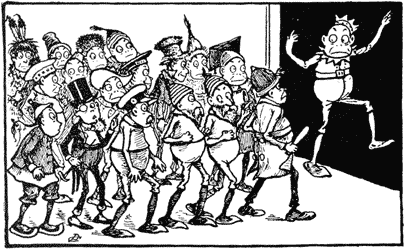
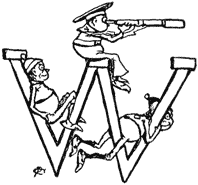
THE BROWNIES BUILD
A RAFT
When King Stanislaus announced to the Brownies that they were to go at once to the rescue of Queen Titania he was confronted by a very serious problem. There was no craft of any kind whatever with which to embark upon so hazardous a voyage.
“This comes of unpreparedness,” growled the Sailor. “I’ve been trying to impress on His Majesty for years that we needed some battle-ships, cruisers, and submarines. Dash my top-lights if we’ve got even so much as an old mud-scow!”
Far off faintly outlined in the gathering dusk was a galleon with all sails spread which the favoring gales were bearing to Dragonfel’s enchanted country.
King Stanislaus realized the utter futility of trying to overtake[120] it with another sailing-vessel even if they had been the possessors of one. Dragonfel and his confederates had too much the start of them.
The only recourse left was to follow as quickly as they could by whatever means were at hand, and, after they reached their destination, to try to wrest the unfortunate Titania and her companions from the cruel clutches of their abductors.
King Stanislaus had pledged his word to Florimel that before morning they would be in hot pursuit.
A raft to the monarch’s shrewd, quick-thinking mind seemed to be the easiest kind of a craft to construct in the short space of time to do it in order to redeem the royal promise. The wind was right, so that it would waft them straight to Dragonfel’s country, just as it was now taking the galleon which soon disappeared beyond the horizon.
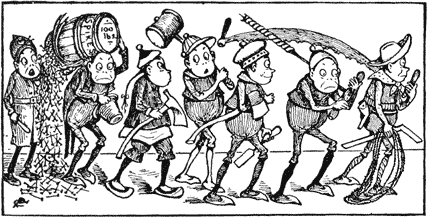
In crisp, curt tones which showed that he, if anyone, was able to cope with this most distressing situation His Majesty gave orders for the immediate building of the raft.[121]
Then came a hurrying and scurrying of Brownies. Each of the little fellows was eager to do his share of the gigantic task, and no one shirked.
Hither and yon, and all about, they flew, a band of willing workers, and no one got in another’s way, so no time was lost. Wisely enough the king assigned to each what he was best adapted to do, and there was no grumbling or cavilling at orders, but a strict obedience in all things. And, wherever such a spirit is manifested, it is surprising what results can be achieved.
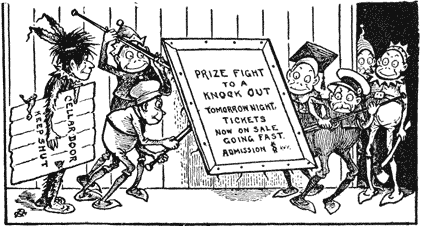
The axes rang out sharp and clear in forests, and big trees toppled down to be stripped in a trice of their leafy branches. Sweating, puffing, grunting Brownies pulled and tugged and strained at the logs into which they were cut, and pushed and shoved, or rolled them when they could, toward the sea-shore.
Here, with their little jackets off, were many other Brownies hard at work, while the sound of big wooden mallets and iron sledges was heard unceasingly on all sides as in the busiest shipyard,[122] while the logs were being nailed and spiked together.
Yet the raft was not composed entirely of logs, but of whatever else besides that came in handy.
Nimble, fleet-footed foragers at their monarch’s instigation roamed the country over for anything that was in the nature of wood. Some of these brought back a gate on which was the sign: NO ADMITTANCE.
Others came with shutters on which was tacked the placard: ROOMS TO LET. And one group triumphantly lugged a dog-house which they thought would serve as a pilot-house, and to this on an iron chain was attached a dog, which perforce was dragged along after it upon its back. So great was their excitement that they forgot all about the dog.
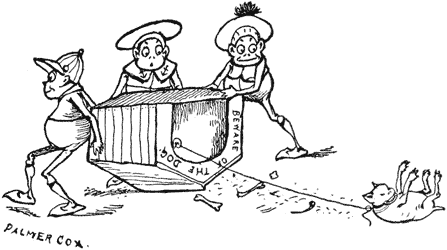
Other members of the band were busy too in different ways. The Sailor came running with a long pole on his shoulder, and[123] strung one after another on the pole were a number of round life-preservers that looked like huge doughnuts.
The Dude stood by, offering advice, and all ready with cane in one and opera-hat box the other.
Straining with the terrific weight the Twins together brought[125] a ship’s lead, and in stopping to put it down for needed rest one dropped it on the foot of his unfortunate brother, who held the injured foot up with his hand, and danced on the well one in great pain. But when his brother motioned for him to take up the lead with him again, he did so, and they labored on their way.
Down on the beach quite a number had found a big anchor half-buried in the sand. They had dug it out and were slowly bearing it with the utmost difficulty toward the raft.
Time and again they stopped for a brief breathing spell, standing meanwhile the anchor on its bow, until at last it suddenly fell over and pinioned a luckless sprite beneath its weight. He was extricated by his fellows, and, while they continued puffing with their burden he limped with effort after them, rubbing his bruised shank.
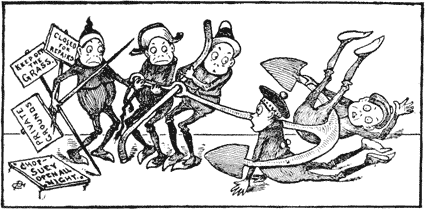
The commissary department was active too, and Brownies
came with ample supplies of provisions for the voyage. They[126]
brought sacks of hard-tack and ship-biscuit, and when they
laid them down and sat on them audacious rats ran helter-skelter
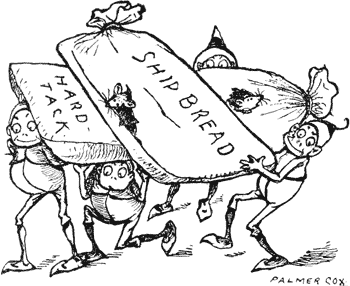 out
and
scampered
wildly off
in all
directions.
Nothing
was left
undone,
and when
in the
judgment
of the
Sailor it
was about
four bells[127]
the raft had taken marvelous shape and was ready to launch.
out
and
scampered
wildly off
in all
directions.
Nothing
was left
undone,
and when
in the
judgment
of the
Sailor it
was about
four bells[127]
the raft had taken marvelous shape and was ready to launch.
With the combined strength of all the band it was rolled down the sloping sand upon round logs until it slid gracefully into the water. Lanterns lit it at the corners, and in the centre on a long stick floated the Brownie flag.
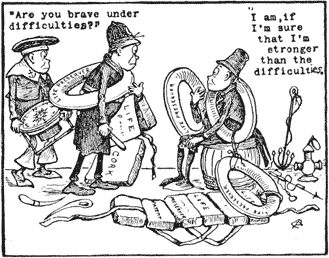
Then all the Brownies clambered on board, and King Stanislaus gave the order to cast off the hawsers. The fairies, weeping yet hopeful of the success of the expedition, watched them from the shore.
But before some Brownies under the instructions of the Sailor could obey the mandate of the king Mignonette and Jassamine in wild disorder, and with their hair flying, came running toward them.
“The dove!” cried Mignonette. “You’ve forgotten Euphrosyne’s dove!”
Jassamine at the same time held up a cage in which the dove was perched on a stick.
“Euphrosyne told Queen Titania she was to send it to her if[128] ever she was in danger from Dragonfel,” Mignonette made haste to explain.
“I don’t know whether we’ve got room to take it,” said King Stanislaus grudgingly. “Besides I think we’re able to manage this little business affair ourselves.”
“Remember, sire,” reminded the Policeman, “that Noah once sent out a dove.”
“Yes, I know,” said His Majesty, “but he’s hundreds of years behind the times.”
Still he did not interpose any objections when the Dude reached forth and grasped the cage, which he set upon the raft.
Then off they floated without further interruption, the Sailor and others poling them out through shallow waters till they could no longer touch bottom. There were no cheers to mark the departure, for the hearts of all were set with a stern purpose.
As they got farther and farther away the fairies still gazed at them, until someone said:
“Don’t watch them out of sight. It’s unlucky.”
The tide was ebb, and the wind continued steady and true, so that they made good progress. Some took their little jackets off to catch each puff of air. The shore-line finally disappeared from sight, and then the lights twinkling in the windows of Queen Titania’s palace.
At last they were so many miles from land that the Twins took frequent soundings with their lead, and the Sailor, who consulted his compass very often, growled to the watch:
“Keep a sharp look-out, you lubber!”
And their plans all would have gone well, and they would[129] have reached Dragonfel’s enchanted country as they intended, if something entirely unexpected had not happened.
About six bells, as the Sailor reckoned, a sudden storm came up.
It was a terrible storm, the worst in the memory of the oldest inhabitant. The Sailor who was most weather-wise of all could not understand it. But Dragonfel could have done so had he wished, for the storm had been manufactured at his request by Vulcan, and it was just as good a sample of what could be done in a hurry as the Brownies’ raft.
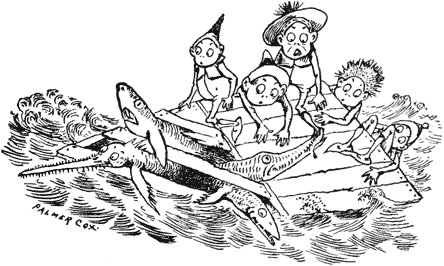
Suddenly the sky grew black, and the stars were blotted out. Then almost instantly came a mighty rush and roar of wind, and the seas ran mountain-high.
“Avast, you lubbers!” roared the Sailor. “Take a reef in your shirts and jackets!”
Lightning lit up almost incessantly gloomy, frowning caverns[130] in the clouds, and the peals of thunder were deafening. The rain poured down on them in sheets, but still the wind howled and raged with unabating fury, and they tossed up and down like a cockleshell.
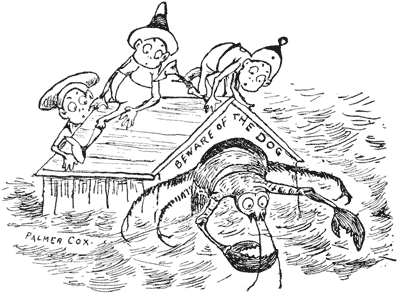
In all the turmoil of alarm the frightened Chinaman lost his balance, and fell overboard, and a huge sea-serpent, with eyes of fire gleaming like electric lights above distended greedy, waiting jaws, rose up from out of the water, with its abnormally long body looking like a series of hoops.
The Uncle Sam Brownie threw out a life-preserver, but the Sailor with rare presence of mind grasped a boat-hook, and, skillfully hooking the end of the despairing Chinaman’s blouse, yanked him back on the raft before the monster could swallow him.[131]
No craft however staunch could withstand such a gale, which grew and grew in violence.
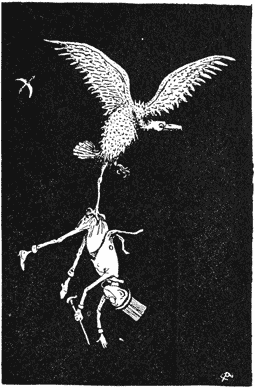
The raft shivered and shook under its terrific strain, and there came pistol-like cracks at intervals as the wood splintered or broke apart, while nails and spikes flew up from the groaning, loosening timbers.
Slowly but surely the raft upon which the Brownies had exercised such ingenuity and skill was disintegrating, and the great danger of the band increased with each passing moment. And in the flashes of lightning that illumined the rumbling skies a huge bird with flapping wings suddenly swooped down, and, seizing the frightened Dude by his breeches-seat, bore him, dangling face downward, with his cherished cane still clutched in his hand, up, up, still up, till he was out of sight.
The others, all aghast, looked up at him until he disappeared, and wondered if they would ever see him again. And, while they wondered, with their own misfortune forgotten in this[132] greater calamity that had come to their beloved companion, there was heard a crack louder than any that had gone before, and the raft went all at once to pieces.
Struggling in the water, or clinging to broken spars, logs, and pieces of timber, the Brownies suddenly found themselves gasping and choking as relentless waves rolled over them, at times submerging them.
This was the end, then, of their unfortunate adventure. There was nothing to cause even the slightest ray of hope. It looked as though all the Brownies would be lost.
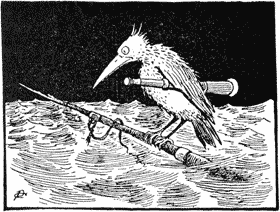
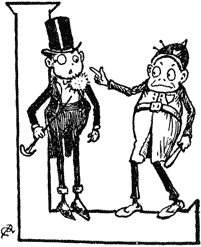
WHAT HAPPENED IN THE THRONE-ROOM
Led by Queen Titania, Dame Drusilda, Violet, and Daffodil, the strange guests, who had come to the wedding without an invitation, mounted the spacious marble steps and passed into the palace.
In spite of a meek, respectful demeanor that it was very hard for them to assume, they could not conceal the gloating satisfaction that was on their faces.
In the meantime the Brownies and fairies were already beginning to enjoy themselves in different parts of the palace grounds.
Introductions are hardly necessary when sprites meet, and many found ways of getting acquainted, and were warm friends on their first meeting.
Having no suspicion of what was in the evil minds of those[134] she was preparing so hospitably to entertain, Titania with her companions ushered them into the magnificent banquet-room.
There upon one of the long tables were spread many delicacies to make one’s mouth water, and, even before an invitation to partake of them could be extended, the four red imps seated themselves before it, and, smacking their lips, began to tuck napkins under their chins.
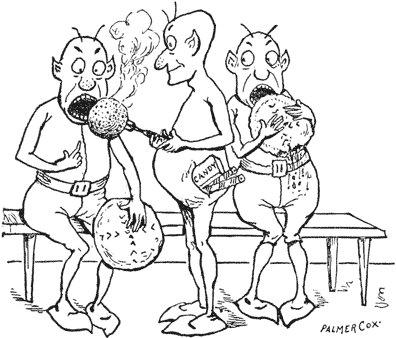
Titania had thought that the guests would leave the presents they had brought out in the hall when they came in, but they still held on to them with a grip so tenacious that she wondered if they really meant to give them up, after all.
Nevertheless in a free-hearted way she urged the visitors to[135] refresh themselves. The imps were already engaged in trying to stuff whole plum puddings into their mouths at once, a greedy proceeding that Dame Drusilda, Violet, and Daffodil watched with considerable disgust.
All but the leader started quickly to seat themselves, but he stamped his foot imperiously, and they came to an instant stop.
Then he threw back the hood of his scarlet cloak, disclosing a wicked face, and transfixed Titania with his malicious gaze.
“I am Dragonfel the enchanter, my fine little lady,” he said, in fiendish tones, “and I have come to take you away with me!”
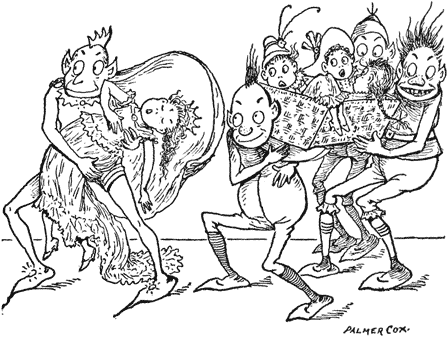
Titania was so frightened that she could neither scream nor run away, and she allowed him to gather her up in his arms and[136] hold her just as a little girl does a doll, making light of load.
There she lay passive and trembling, with the realization that it would be useless to make any effort to escape.
Almost immediately afterward Grouthead seized the biting, scratching, and clawing Dame Drusilda, whom he dumped in spite of fierce resistance into the baby’s crib, and when Mandrake and Wolfinger put Violet and Daffodil in after her it was very plain why this particular gift had been selected.
“Yes, and you’re not going to get these presents, either,” sneered Dragonfel to Titania, who said never a word. “You may call me an Injun-giver, if you like, but I mean to take them back, just the same!”
With Titania helpless in his arms he started toward a rear door, while after him came Grouthead and Wolfinger bearing the crib in which Dame Drusilda, Violet, and Daffodil rattled about like dried peas in a pod. The others followed slowly and reluctantly in their wake, casting longing glances backward at the tempting-looking desserts on the table.
The imps, however, did not budge, but continued eating. When Dragonfel called out to them in angry tones they sprang up and attempted at the same time to jam charlotte russe into their gaping mouths.
In their frantic haste they smeared the charlotte or russe, whichever the white part is, all over their faces, so that as they hurried after the others with occasional frisky somersaults they looked as though they had just been lathered by a barber.
Out by the rear all passed into the deserted back-garden where there was a small iron door locked and bolted from the inside, and with the key, fortunately for their nefarious plans, in the lock.[137]
Through this door Dragonfel and his followers effected their escape with their captives, and ran with all possible speed toward the sea-shore.
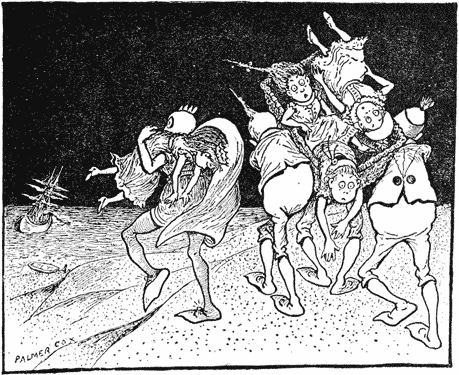
The galleon tossed upon the lazy swell, not a great distance out, and in a small boat with Snoutpimple and Boundingbore at the oars they rowed to it, and soon were on board.
Then the anchor was weighed, and with all sails filling they set their course for Dragonfel’s enchanted country, which they reached without mishap of any kind.[138]
When they got to their journey’s end, and all stood safe upon the shore, the full malignity of Dragonfel was shown.
Realizing that the indomitable Brownies would not relinquish Titania without a struggle, but would follow as quickly as they could to wrest her if possible from him, he ordered Vulcan’s imps to call upon their master to impede them with a storm.
The imps thereupon cast balls of fire into the air, and, even as all bent their steps toward the palace, the enchanter noted with considerable satisfaction quite a change in the temperature. Clouds were already beginning to form on the horizon, and there came the distant rumble of continuous thunder.
While they stood just outside the massive doors they heard the sounds of what appeared to be a violent altercation from within. In an agitated manner, as though he feared the worst, Dragonfel quickly threw them open, and was greatly relieved to see the Demon Usher and Red Spirit engaged in a friendly game of checkers.
“You cheated!” the Red Spirit accused hotly. “You jumped three of my men when you should have only jumped two!”
“Stop it!” snarled Dragonfel at them. “You don’t know how to play checkers, anyhow!”
They sprang in consternation to their feet, upsetting the board, and causing the checkers to roll all over the floor.
While the Red Spirit stood gloating over the success of a venture in which he had played a modest part, the Demon Usher half skipped, half flew, to the throne, and with a display of much enthusiasm began dusting off the seat with a cloth.
With swaggering stride Dragonfel went to the throne, and threw himself in it, while Queen Titania, Dame Drusilda, Violet, and Daffodil all came running toward him.
“Oh, sir,” cried Dame Drusilda, very much distressed, “why have you brought us poor, defenseless girls here?”
“Us, my venerable fairy!” said Dragonfel, most insultingly.
“Venerable!” repeated Dame Drusilda. “Oh, you nasty man!”
“How do you keep your age?” he sneered.
“Easy enough,” she replied indignantly. “I never give it away.”
As she spoke she made for him as though she meant to scratch his eyes out, but Queen Titania pulled her back.
“Don’t touch him, Dame Drusilda!” she cried, and then turned pleadingly to Dragonfel. “Why have you made me a[140] prisoner, and carried me away from home in this way?”
“To prevent your marriage to the Brownie prince,” he said coldly.
“But we love each other, and would be so happy,” she said, while tears filled her pretty eyes. “Why do you oppose the marriage?”
“Because if this marriage were to take place,” he said, with an ugly frown, “it would make you all so powerful as to result in my undoing.”
“You fear,” she said reprovingly, “that we will frustrate all your wicked plans.”
“It must not, shall not be!” was his decided response. “The Brownies and fairies have long been my enemies.”
“If you did good,” she reminded, gently, “we would be your friends. Tell me, must I stay here always?”
“Yes, always!” he snapped out. “The sooner you forget your Brownie prince the better. You shall never see him again.”
Then Titania showed her spirit.
“Oh, yes, I shall!” she contradicted. “The Brownies will rescue us!”
“Bah!” he said contemptuously. “Those poor, weak creatures of the night? They could not do it.”
“The Brownies can do anything,” she said, with perfect trust and confidence.
“My pretty pet,” said Dame Drusilda, “you waste words with him. Let us ask some of these other creatures to help us. Maybe they are not as bad as their master.”
So she coquettishly sidled up to Grouthead, Boundingbore, Mandrake, Wolfinger, and Snoutpimple who stood near by in a[141] highly interested group. But before she could say even a word Grouthead gathered her up in his arms, and held her out in the air, while in her fright she kept kicking the turned-in toes of her tiny shoes together.
“Don’t be alarmed, my dear,” he croaked, in tones that were meant to be reassuring. “There’s a heart here that beats for you, and you alone!”
“Where’s the heart?” she gasped.
“In this troubled breast,” he roared. “I’ve half a mind to marry you.”
“Put me down!” she screamed. “I wouldn’t marry anyone with half a mind!”
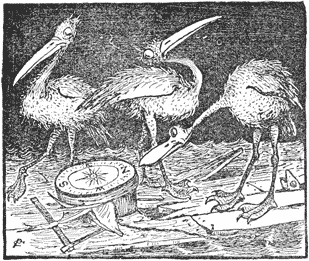
Dragonfel rose, and stamped his foot angrily, at which silent rebuke Grouthead set Dame Drusilda hastily down. She gave a sigh of great relief, and, gathering up her skirts, flew toward the enchanter.
“Oh, sir,” she implored, “can nothing move you?”
“Yes,” he said, in sneering tones, “a ton of dynamite! You are a pippin, but you withered on the stem!”
“You villain!” she screamed, shaking a tiny clenched fist at[142] him. “I could annihilate you for that; you deserve worse!”
And she made for him again, but the tactful Violet and Daffodil grasped each of her arms, and held her back.
Dragonfel grinned most provokingly, and his myrmidons fairly shook with glee, while the Demon Usher cackled his exultation, and poked the Red Spirit on his elastic ribs.
Titania took a little spider-web affair of a handkerchief from her bodice, for her eyes threatened to fill again.
Noting the coming tears, the wicked enchanter hastened to say, in tones that were meant to be particularly comforting:
“No harm shall befall you. When you have a wish you have but to name it.”
“I have one now,” spoke up Titania quickly.
“So have I,” added Dame Drusilda.
“I’ll hear yours later,” said Dragonfel to the latter gruffly, and then turned to Titania with what he thought was a most winning smile. “What is yours?”
“I want my Brownie prince!”
“Didn’t I tell you you were never going to see him again?” said the enchanter, in disgust. “Ask me something else, and make it as hard as you can.”[143]
But Titania had no other wish, and Dame Drusilda was given no opportunity to make hers known.
The days dragged slowly by, and, though Dragonfel was not actually rough in the treatment of his captives, he still was most unkind in depriving them of the liberty for which they continually sighed. They were watched and spied upon continually, so there was little or no chance for escape.
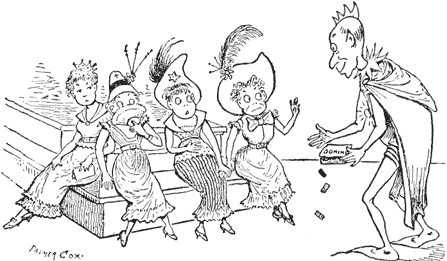
He endeavored to provide amusements for which they had no heart, and was a sorry host at best. In his crude efforts to entertain them he welcomed all ideas for sports and diversions, so when on one occasion they were all together, and his prisoners seemed unusually depressed, he sat upon his throne knitting his brows in trying to think of something that might cheer them up a bit.
In the midst of his unsuccessful cogitations the Demon Usher[144] half skipped, half flew, to him, and prostrated himself at his feet.
“Kind master!” he cried, in a flutter of excitement.
“What is it?” asked Dragonfel.
“A band of wandering minstrels outside humbly crave permission to play before you.”
“What, another?” said Dragonfel. “Show them in!”
The words he used were hospitable enough, but the tone of his voice boded little good for the daring musicians.
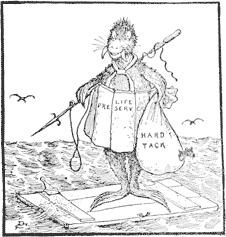
NEPTUNE STILLS
THE WAVES
Up and down like corks bobbed the Brownies on the angry waves when their raft was so suddenly demolished by the storm. The blackness of the night was so intense that even with their supernatural vision they could not see each other save in those vivid streaks of lightning that came often and for a brief moment made all around as bright as day.
The wild wind and waves bore them farther and farther apart from each other, so that it was every one for himself, which was against all principle in a band that delighted in mutual help.
But in this case they could not give it. The water got in their noses and mouths, causing them to gasp, choke, and splutter,[146] while their ears rang, and their eyes were nearly blinded.
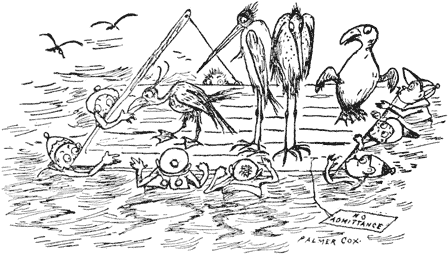
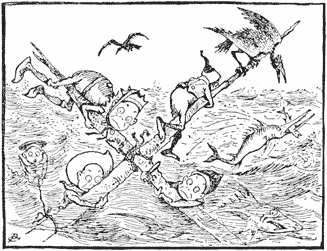
Desperately they clung to the splintered pieces of debris, to the dog-house that spun over and over, to the gate that turned upside down, or straddled logs that kept rolling with Brownies first up and then under like teetotums.
And others,[147] not so fortunate, with strength fast leaving them, still swam the waters seeking and groping in vain for some object to sustain them.
Then, right in the midst of all their terrible danger, when hope was fast departing from all hearts, a wonderful thing happened.
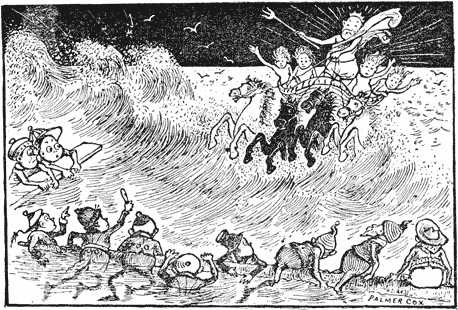
There came a sudden radiance that was not the lightning’s flash, illuminating old Father Neptune and a bevy of lovely-faced dryads in a golden chariot that furiously galloping seahorses drew across the waves.
In a brief space no longer than a second the God of the Sea and his beauteous attendants passed on out of sight, but almost with their disappearance the lightning and thunder ceased, as[148] did the rain, the wind died down, the stars once more shone out, and the water grew as smooth as glass.
When buffeted no longer by boisterous winds and waves the chance the Brownies had to save themselves increased immeasurably.
They could now see and hear each other, and when some one swimming in the water called for help there were those on debris who reached over and pulled their exhausted comrade on board.
They shouted at each other in the dark, and by using their feet as paddles contrived at last to bring whatever they floated on close together. Then King Stanislaus, who with Prince Florimel was a-straddle of a log, with much anxiety began to take an inventory of the band.
To his infinite relief no one was missing but the Dude, but this misfortune in itself was enough to dampen their spirits, for the companion who had been carried off by the gigantic bird was very much beloved.
“Aye, aye!” growled the Sailor, cocking his weather-eye out[149] through the slats of the hen-coop. “We’re all here, even to Euphrosyne’s dove!”
Thus on they went without further mishap, a queer-looking flotilla, keeping in as close proximity to each other as they could, using both hands and feet for paddles, and adopting many ingenious devices to complete the voyage so disastrously begun.
And a day dawned, then another, but at nightfall of the second they glimpsed far off a shore-line with a single towering mountain which they knew to be Dragonfel’s enchanted country.
They were neither hungry nor thirsty, for Brownies if need be can go without food or water a long time.
Much heartened by what they beheld, they redoubled their efforts to reach the shore, which grew plainer and plainer, until finally they could distinguish an immense glittering structure that looked more like a prison than a palace, built as it was in the gloomy shadow of the mountain.
Though it gleamed and flashed and shone in a thousand and one different places, where its myriad jewels caught the light, it seemed a cheerless, inhospitable place, and they were depressed by the sight of it.
The galleon that Dragonfel had used to convey his captives to his country was lying at anchor well in toward the shore, with no one evidently on board, but not feeling sure of this the Brownies made a wide detour, choosing for a landing a sheltered cove that would screen them from observing eyes.
As they drew closer to the land some strange companions had they—queer creatures who had obtruded themselves upon the Brownies during the storm, and forced their society upon unwilling hosts—a motley gathering from air, sea, and undersea that occupied choice places upon the flotsam and jetsam to[150] which the little fellows so precariously clung with amazing vim.
There were comical-looking, long-legged, long-billed cranes and herons, and squat-flappered, web-footed penguins. The walrus and seal were there, as well as formidable members of the finny tribe, some of which had swords so sharp that the discreet Brownies kept a most respectful distance from them. Crustaceans too were represented, with here a lobster slyly nipping a sprite’s toe with his claws, and there a turtle tweaking another’s cap.
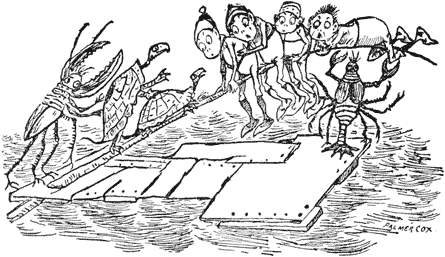
But when the Brownies reached shoal water, and some began to wade toward shore, these false whilom friends deserted them, and dived into the deep, or flew off in the air.
Then when they were safe at last on land they stretched their weary, stiff, cramped legs and arms, or raced about the sand to get the sluggish blood once more pulsing through their veins.
King Stanislaus stood apart from all the rest, and watched[151] their joyous antics with an expression of deep thought on his august countenance. It was plain to be seen that he was greatly troubled in his mind.
Now that they had succeeded in reaching Dragonfel’s country what steps should be taken in the effort to recover Queen Titania and her companions? It was not to be conceived that the wicked enchanter would give them up without a bitter struggle.
The problem confronting the Brownie band was one that required the most careful consideration. A single false step might ruin all.
While the monarch pondered over what was best to be done his eye abstractedly roved to the Brownies who now had gathered in a circle on the beach, and who were scanning with much interest something in the sky.
The Policeman involuntarily had pointed his club toward it, and the Sailor was trying to get a better view through his spy-glass.
The royal eye at once turned upward in the direction in which all the others were gazing, and like everyone else was held spellbound with surprise.
Far overhead there was an immense bird slowly dropping with stationary wings outspread down toward them. It stood out clearly outlined in silhouette against the dark night-sky.
But it was not this bird, remarkable in itself, that created such intense excitement on the part of all.
Its great sharp talons held in a firm grip an object that they recognized at once, with the result that delight and consternation were mingled on their faces.
Grasped firmly by the coat-tails, with face downward, and legs and arms spread out like a Maltese cross, was the immaculate[152] Brownie Dude, and he still was clutching in his right hand the cane that was his most treasured possession outside of his monocle. The Brownies watched this most extraordinary spectacle as though they were fascinated, and their pop-eyes almost popped out of their heads.
Lower and lower settled the great bird, and the anxious[153] watchers now realized that its offices toward the Dude in time of danger had been of a most heroic nature.
With great haste some secured a net, which they held outspread. When the bird was still some distance above, it cocked its eye as though it were making some nice calculation and suddenly let go of its burden.
The Dude came hurtling through the air, landing safely in the net, while the bird sailed off, and was soon gone from sight.
As soon as the Dude got on his feet he started to dust off his clothes with a tiny whisk-broom.
“I shouldn’t care to go up in an aeroplane!” he said.
He looked infinitely relieved when one of the overjoyed Brownies who crowded around in congratulation handed him his opera-hat box.
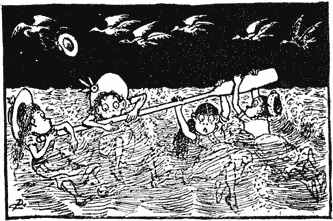
It may here be mentioned, that the Fairies, who had been left behind, made a desperate attempt to follow their Queen, and the Brownies, across the sea. But, after great difficulties, and[154] dangers, they were glad to get back to their own shore in safety.
But though Florimel, like all the rest, was delighted beyond measure that the Dude had been so miraculously restored to them, so they were now once more complete, he could not restrain his tortured feelings when he[155] thought of Queen Titania, and he was in a fever of impatience to rush at once to her rescue.
“We only waste time here while Titania may be in danger,” he said, with a strong trace of irritation in his tone. “Is not that Dragonfel’s palace over yonder?”
King Stanislaus gazed at the highly expensive but forbidding-looking edifice toward which Florimel pointed.
“Maybe so,” was his guarded response.
“Then let us storm it, and force him to surrender the queen and her companions!”
“Yes, yes!” cried all the Brownies.
But King Stanislaus shook his head in a very decided manner.
“My son, you’re too impulsive,” he said kindly but reprovingly. “Judging from what you’ve told me, for I’ve never seen any of them, each of those fellows must stand full six times as high as one of us, and there may be six times as many besides. We must exercise caution.”
“Have you anything to propose?”
“Nothing just now,” said King Stanislaus. “We must reconnoitre a bit, and get the lay of the land, before considering any plan whatever. An open attack would be entirely out of the question. They’d have the advantage of us in size and maybe numbers. No, no, my boy, we must use Brownie cunning.” Reluctantly Florimel was obliged to admit the force of the shrewd old monarch’s reasoning.
Concerned as he was in mind to rescue Titania as soon as he could, he had no desire by any rash act to imperil or, even worse still, destroy the entire band.
King Stanislaus motioned to the Brownies, who drew closer[156] to give respectful heed to what he might have to say to them.
“I want each of you to go out and see what you can learn,” he instructed. “But, as you value your life, and the lives of your fellows, you must not allow yourselves to be seen or heard by anyone. When a half-hour has elapsed we will assemble here.” Following His Majesty’s directions, the willing band immediately dispersed, Florimel choosing a way to take alone, as did each other, and so careful were they all that no one in the neighborhood would have suspected they were near.
When the half-hour was up King Stanislaus was back on the same spot, and the Brownies began to pop up in the dark around him from all sides.
“Well,” His Majesty asked, “have you found out anything?”
Then one after another was obliged to confess that he had not, and while he was questioning them in turn he ascertained that neither Florimel nor the Policeman had returned.
The fact that both were missing worried him not a little, but, even while he was wondering what had kept them, he beheld the Policeman returning with incredible speed, leaping and bounding with his long, tapering feet over the sand.
“Your Majesty,” he panted, as he came up out of breath, “I have just made a remarkable discovery.”
“What is it, officer?” asked King Stanislaus, anxiously.
“If I told you,” said the Policeman, “I’m afraid you wouldn’t believe me. I want you all to come and see for yourselves!”

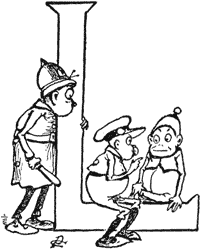
WHAT THE POLICEMAN
DISCOVERED
Like a covey of startled quail the Brownies flew after the Policeman, for each was very curious to learn of the discovery that he had made. They knew that with his keen sense of dramatic values he wished to keep them in suspense as long as possible, so that only at the proper moment would the mystery be solved.
His fleet little feet padded along the sand, followed by others equally so, and he led them a stiff pace for perhaps a mile down the beach.
There lying behind a dune that offered a shelter from the creeping tides they viewed the cause of all his excitement.
Scattered on the sand were some dingy old frayed uniforms, caps, and hob-nailed shoes, of which they counted five complete sets in all, while near by piled into a heap were some immense[158] brass musical instruments, some bent and battered in places and all tarnished by the weather.
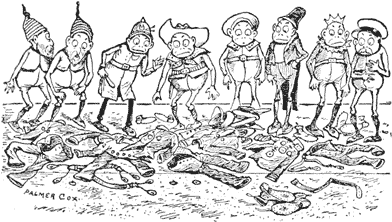
Soon they were making a minute inspection of these objects which for some inexplicable reason had been abandoned by their owners. The uniforms and caps were of worn blue cloth, and the latter had visors and braids of gold around them. The sleeves of the coats likewise were braided with gold.
With much interest in their work the Brownies began to separate the instruments that formed a heap. There were two cornets, a saxophone, a trombone, and a tremendous tuba that wound around and around and had a mouth so big that a Brownie could have easily crawled inside.
While they were examining the outfit there was much speculation as to whom it belonged, and the only conclusion they could arrive at was that the original possessors had been some itinerant German band.
It was not so strange to them that a German band should be[159] in Dragonfel’s enchanted country, for they knew that German bands go everywhere. Sometimes they can be found even at the North Pole. The only strange thing about it was that while the uniforms and instruments were there, the owners were missing.
“I wonder what’s become of the band?” said King Stanislaus, very much puzzled.
“Perhaps someone heard them play,” suggested the Dude.
His Majesty gave a sudden start.
“Humph!” he grunted. “What you have just hinted at rather unsettles an idea that suddenly occurred to me.”
“Maybe you were thinking of the same thing I was,” said the Policeman.
“That’s very possible,” said the monarch, “for great minds sometimes think alike. I was thinking that some of us could disguise ourselves as a German band and maybe gain admittance to the palace.”
“That’s just what I was thinking,” said the Policeman.
“In that way,” went on King Stanislaus, “we might be able to get some knowledge of Dragonfel’s real strength, and find out just how we stood. The chance might come to us to spirit away Queen Titania and her companions.”
“Which of us would you choose, Your Majesty?” asked an eager Brownie.
All of them crowded around, each with the hope that King Stanislaus would select him for this task which involved so great a risk.
He looked them over, and finally, with his mind made up, spoke, in slow, measured tones.
“Of course, I’ll be the leader,” he announced. “That will leave just four to go with me, and I’ll take the Policeman,[160] Sailor, German, and Irishman. The rest of you must hide just outside the palace, to be ready instantly in case you are needed.”
There was great delight on the part of the four who were to share with the king the danger, and keen disappointment among all the others. But no one thought of questioning the royal decision.
“I didn’t forget my tin box of disguises, sire,” reminded the Policeman.
“Good, officer!” said King Stanislaus, with an approving nod. “They’ll all come in handy. You’ve got plenty of false noses and moustaches, I suppose.”
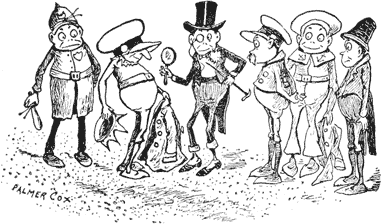
The Policeman gave a knowing wink.
“You’ll need a rehearsal, won’t you?” said the Dude.
“No,” said King Stanislaus decidedly. “The worse we play the cleverer will be the deception.”
Then he and the four selected by him began to make preparations for their queer masquerade, and in these the whole band assisted.[161] The coats and trousers had probably hung on their original wearers badly, but they fitted the Brownies who tried them on much worse.
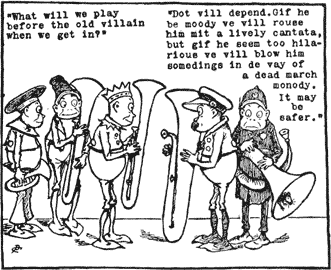
The general effect would have brought deep shame to any conscientious tailor who had made them, but nimble fingers soon accomplished wonders with a tuck here and there, and the deft use of an occasional pin.
The ends of the trousers had to be rolled up a number of times, and the coats turned up on the inside. When they put on the big, hob-nailed shoes their long, tapering feet were lost in them, and the whole Brownie identity completely disappeared after they had donned the false noses and moustaches that the Policeman handed around.
No one familiar with the Brownie band would have recognized these particular five, and their disguise was pronounced admirable by one and all.
The breast of the coat that had fallen to the Sailor was all covered with medals, and it was the only one of the lot that was decorated in this manner. King Stanislaus thought that as[162] the leader he was more properly fitted to wear this coat, but the Sailor seemed reluctant to give it up, so His Majesty good-naturedly did not press the matter.
He chose a cornet and the Sailor the remaining one. The Policeman took the saxophone, and the German the slide trombone. That left only the tuba for the Irishman, and it was so big that he could hardly manage it.
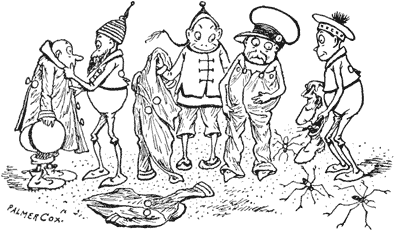
Thus fully equipped and with the whole band for an escort, the indomitable quintet set forth on their delicate mission.
Dragonfel’s palace was a good deal farther away than they had supposed, for the atmosphere was very clear, so that objects at a distance seemed much nearer than they really were.
There was a fair road that led to it from the beach, and this took them over a rickety wooden bridge that spanned one of the numerous tide-water creeks in the vicinity.
But before they reached the bridge they came to a small frame structure over whose arched doors was the sign: NEPTUNE HOOK AND LADDER CO. NO. 1, which caused remarks.[163]
“Evidently Dragonfel has a fire department,” said King Stanislaus. “This is a most interesting discovery.”
“Why, I could have told you that,” said a Brownie. “I saw it some time ago.”
“You should have done so,” His Majesty reproved. “It may have a very important bearing on what we are about to try to do. But what was that?”
Something dim and shadowy flitted past in the dark, with the whirring sound of a night-bat.
“I saw it,” the Policeman spoke up quickly. “There was a gleam of red, and I thought I could distinguish a bow and quiver.”
“A bow and quiver!” repeated King Stanislaus, and his face grew suddenly grave. “I hope they were not Prince Florimel’s. I am greatly distressed by the fear that some dire mishap has come to him.” His Majesty would have felt very much relieved in mind if he could have known that nothing serious had occurred to the prince.
When like the rest of the Brownies Florimel had gone to seek what information he could he had strayed nearer to the palace than perhaps in prudence he should have done.
With the impetuosity of youth he was ready to storm the palace single-handed, but he realized that such a rash, foolhardy attempt would only bring disaster to the whole band.
So he gazed toward the lights that gleamed from the windows, wondering all the while what Titania was doing at the time, and if Dragonfel was very cruel to her.
He was really helpless just then to exert himself in her behalf, and he turned with a sigh to go back.
The rigors of the hardships through which he had passed[164] pressed heavily, and excessive weariness overcame him. He felt a sudden faintness, and sank upon a grassy bank to rest.
He did not dream that prying eyes for some time had been watching him from an open panel in a fence hard by.
Those keen, malicious orbs followed every movement that Florimel made, and when they noticed him yawn, and rub his lids to keep the sleep from them, they glittered and gleamed with exultation.
Then Florimel’s eyes in spite of him closed, and his tired head sank back in the deep grass.
From the fence the Red Spirit issued like a wraith. Noiselessly he advanced toward the unconscious prince, and bending down began with deft, adroit fingers to remove the quiver slung across his back.
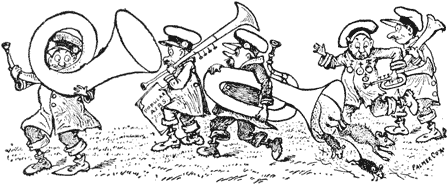
But light as the thieving touch was it aroused Florimel who sprang at once to his feet.
Quick though he was he still was not quick enough. All that he heard was a whirring sound, and in a flash he noticed that his bow was missing. His hand involuntarily sought his back[165] only to find that the quiver had been craftily taken from it.
Wide awake and full of alarm now he ran with all speed back to the locality that King Stanislaus had designated for the reunion of the band. But the half-hour had elapsed, and the Brownies were not there.
Then he noticed in the sand prints of narrow, tapering feet all leading down the beach, and he flew in the direction they pointed. But when he reached the spot where the Policeman had made his discovery the Brownies were not there, either.
He felt convinced that they had started for Dragonfel’s palace, and he ran as fast as he could to overtake them, passing the engine-house, and going over the bridge.
When he was approaching the palace he saw five persons very small of stature, each with a big brass instrument, standing just outside the entrance. The doors swung suddenly open, they passed through them, and then the doors closed again.
Florimel quickened his pace with the determination to follow them, but just when he was about to pound upon the doors for admittance tiny but strong hands grasped him, and held him back, and he heard the whispered warning:
“Don’t, or you will ruin all!”
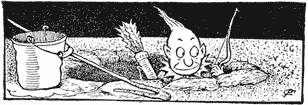

THE GERMAN BAND
When the German band was announced by the Demon Usher in his queer, cackling voice Queen Titania, Dame Drusilda, Violet, and Daffodil happened to be seated on the steps of the throne, and all were feeling grumpy and out-of-sorts. Dragonfel had tried to prevail upon them to play dominoes or parchesi, but they had no heart for any game.
Grouthead, Wolfinger, Mandrake, Boundingbore, Snoutpimple, and others of the enchanter’s followers were present and some of them looked distinctly bored. Snoutpimple was even trying to repress a yawn. Things at the palace had been rather slow since the abduction of Queen Titania and her party, and nothing especially wicked had occurred.
When it was known, however, that a number of strolling[167] musicians were going to play for them, a thrill of genuine pleasure ran through the whole assemblage. Titania and her companions were glad, for they felt that some enlivening strains would greatly cheer their drooping spirits. Dragonfel’s followers were equally delighted, though they did not care in the least for music. But knowing their master as they did they were very sure that the prospective concert would prove exceedingly interesting.
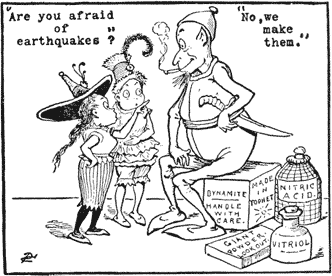
Escorted by the smirking Demon Usher, who rubbed his hands together while he cackled joyously to himself, and who half skipped, half flew, before them, the members of the German band entered awkwardly, and clumsily arranged themselves in a semi-circle before the throne.
There were five of them including the leader who stood at the end nearest Dragonfel and the others—all diminutive, moustached men with big noses, whose frayed, soiled uniforms fitted them very badly indeed. Their trousers at the ends were rolled up a number of times over, and their coats which hung[168] on them like bags actually reached almost to their shoe-tops.
Upon the chest of the one who stood next to the leader were pinned a great variety of medals, and he seemed to be very proud of them, since no one else boasted a decoration of any kind.
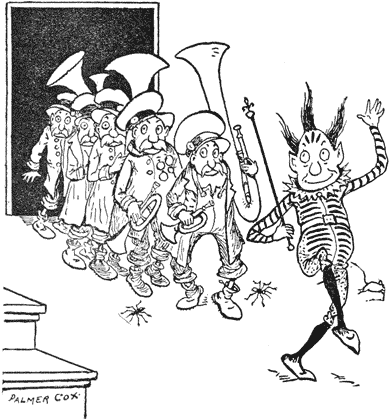
The little audience grouped about the throne gazed at them expectantly, and Titania thought the leader winked at her.[169] But apparently he did not notice anyone, and least of all Dragonfel. His whole attention seemed to be centred on his band.
“Are ve all here alretty?” he asked.
“Yah!” came in chorus.
“Vell,” said he, “I vill broceed der gall der roll-gall. ‘Louie Knobloch!’”
“I vass here,” said the one with the medals next to him.
“Peter Dinkelspeil!”
“Here I vass.”
“Hermann Sweinskopf!”
“He’s peen here.”
“Jacob Schnittger!”
“Bresend early.”
“Emil Muller!”
There was no response, and all the rest turned and looked at the leader in surprise.
“Emil Muller!” he repeated, and then, suddenly recollecting something, went on: “Oh, oxguse me! I vass here. Heinrich von Strauss! Heinrich von Strauss! Vere iss Heiny von Strauss?”
“He vass py his bedt sick,” said Louie Knobloch.
“Vat’s der madder mit der bedt?” demanded Emil Muller. “For vhy iss id sick?”
“Nein, nein, keppelmeister,” said Louie Knobloch. “Id iss Heiny vat iss sick. He iss sick by der inside off der bedt.”
“Vhy iss he sick?” asked Emil Muller.
“Yestertay,” explained Louie Knobloch, “he vend on der bicnig, und he eated four dozen charlotte roosters, und he gets der collywopples.”
He illustrated his remarks by significantly rubbing his stomach. “He vas not in goot contition to plow ven ve left.”[170]
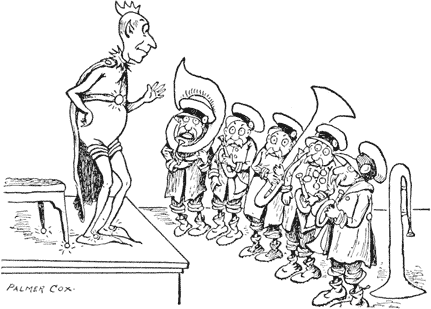
“Anyvone vot eadts charlotte roosters ought der be sick,” said Emil Muller decidedly. “He shoult eat dem vhen dey iss a egg. Blay!”
All raised their instruments to their mouths, but he held up a warning finger.
“Anodder t’ing,” he went on to Knobloch. “You dell Heinrich off he vass nod here dermorrow morning ad half basd four in der afdernoon, vhen I gall der rehearsal, arous mit him! Are you retty?”
“Yah!”
“Den plow yourselfs!”
Then began a wild riot of discord, whereupon Emil Muller quickly took his own dented offending cornet from his mouth.[171]
“Ve vill nod blay dot biece,” he announced. “Id iss no goot.”
“Vhy don’d you wride some musigs, keppelmeister?” suggested Peter Dinkelspeil.
“I voult, bud I’m doo pusy,” said Emil Muller. “Led us renter insteadt dot peaudiful biece fon Vawgner, ‘Der Glock on der Rhine.’”
“Vatch, keppelmeister,” corrected Louie Knobloch.
“Vatch vat?” inquired Emil Muller.
“Id iss nod a glock,” explained Louie Knobloch. “Id iss a vatch on der Rhine.”
“A glock all gan see iss besser,” said Emil Muller, and in the midst of their second attempt Hermann Swinescopf raised his hand and shouted in the effort to make himself heard above the din:
“Shtob der pandt! Shtob der pandt! I am shbeaking!”
“Vot’s der madder?” asked Emil Muller.
“Vass iss der biece you say ve blay?” questioned Hermann Sweinskopf.
“I say ‘Der Glock on der Rhine’ fon Vawgner,” replied Emil Muller.
They started once more, but again came the vigorous interruption from Hermann Sweinskopf:
“Shtob der pandt! Shtob der pandt! I am shbeaking!”
“Vhy don’d you shbeak your moud oud undt pe done mit it?” said Emil Muller angrily.
“Vass iss dis here biece, ‘Der Glock on der Rhine,’ anyhow? Iss id a so-na-da?”
“Yess—undt no!” said Emil Muller, reflecting. “Id iss a in-u-en-do! Are you all retty?”
“Yah!” they chorused, setting themselves in proper shape.[172]
“Vell, altogedder den, und show de vorld vot you can do!”
Then came a third attempt, but the leader again stopped them.
“Who plew dot bum node?” he sternly demanded. Everyone looked at each other in surprise, and Louie Knobloch said:
“Vell, I don’d dood id.”
“I didn’d did id,” said Peter Dinkelspeil.
“I didn’d done id,” said Hermann Sweinskopf.
“I didn’d did did id,” said Jacob Schnittger.
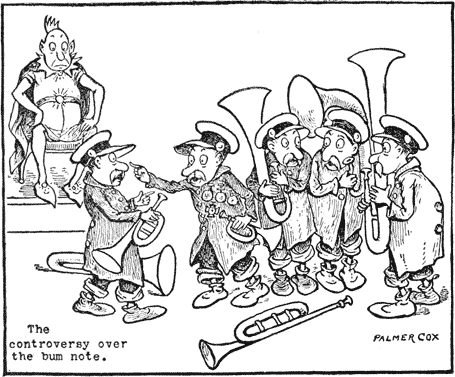
“You’re de von,” Emil Muller accused Louie Knobloch.[173] “You plew dot bum node, no madder vot oxguse you make!”
“No, sir,” said Louie Knobloch stoutly, “I don’d dood id.”
“You’re de von,” insisted Emil Muller. “You plew dot bum node, it vass near me.”
“No, sir,” denied Louie Knobloch. “I don’d plow no bum nodes. I vass as goot a musiker as you pe, und maype vorse.”
“You dake dot bum node und bay yourself,” said Emil Muller reminded him.
“Oh, dot don’d make some ice!” said Louie Knobloch, accompanying the words with sarcastic shakes of his head. “I don’d see no medals on you.”
He looked complacently down at his own chest and regarded with satisfaction the big assortment there. Emil Muller was evidently taken aback, but he recovered himself sufficiently to say:
“I am de leater, und you gan ged oudt off der pandt. Ve gan ged along mitout you.”
“Oh, vell,” said Louie Knobloch, “I gan go.”
“Den vhy don’d you? Vat are you shtanding here for?”
“I vass vaiding for my money.”
“How much do you owe me?” asked Emil Muller.
“I owe you a veek’s vages,” said Louie Knobloch. “No, you owe me a veek’s vages. You bay me my money und I go.”
“You dake dot bum node und bay yourself,” said Muller.
That settled the controversy, and Louis Knobloch made no effort to go, nor did Emil Muller urge him.
They made another attempt, without any further interruption, and, while their cheeks puffed out, and they got red in their faces, no one could tell what tune they were playing.
Dragonfel from the throne silently motioned to Grouthead[174] who went out, and returned a few seconds later with a tray on which were four tiny glasses of ginger ale.
Jacob Schnittger turned and saw him, and then rushed to help himself to one of the glasses of ginger ale. A moment later Hermann Sweinskopf followed his example, and then Peter Dinkelspeil. Louie Knobloch suddenly noticed his companions preparing to refresh themselves, and made a frantic dash to join them. That left only Emil Muller, the leader, playing. He looked around to find out what was the matter, and then sprinted toward Grouthead, but there was no ginger ale left on the tray. He stood with ill-concealed envy watching the other four who were clinking their glasses hilariously. Then the quartet began to sing:
“Prosit, leater!” said Louie Knobloch mockingly, as he lifted[175] his glass, with the other three facing around and following suit.
Emil Muller was speechless. He kicked his heels together as he watched them drinking and smacking their lips. Dragonfel again signalled to Grouthead who went out, and came back bearing an immense glass of ginger ale upon the tray.
Emil Muller swooped down upon it exultingly, and with great difficulty held it aloft. The others of the band gathered around in awe, while Louie Knobloch stood on tiptoe to obtain a better view of the glass. Emil Muller blew the froth into Louie’s face, and the[176] latter wiped it off with his fingers, afterwards putting them in his mouth, as though even small favors sometimes count.
“Do you know vot dot man Vilhelm Shake-a-sbeare vonct saidt?” he asked.
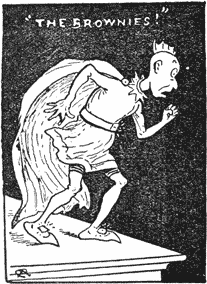
“No,” replied Louie Knobloch, wiping the froth from his eyes. “Vot dit he say?”
Emil Muller raised the glass to his lips, remarking with great emphasis:
“Shake-a-sbeare vonct saidt, ‘Dere iss odders!’”
But before he could partake of the cooling drink all of a sudden the Red Spirit with the bow and quiver of arrows he had taken surreptitiously from Prince Florimel flew through the window into the room, shattering the glass all to pieces, and lit right at Dragonfel’s feet.
“Be not deceived, kind master!” he cried, in great excitement. “They are the Brownies!”
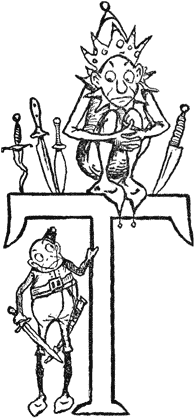
THE EARTHQUAKE
AND VOLCANO
The big glass with not so much as a single drop tasted by Emil Muller’s lips fell from his hand with a loud crash, and its contents flowed like an amber-colored river along the floor.
Almost instantly at the Red Spirit’s startling announcement Dragonfel had sprung up from his throne stiff and rigid, and was regarding the embryo musicians with a glare of peculiar malevolence.
“The Brownies!” he involuntarily ejaculated. “I thought they played too well for a German band!”
Queen Titania, Dame Drusilda, Violet, and Daffodil had also risen as though they had received an electric shock. Their breath came fast in their sudden agitation. They started to[178] go to the musicians, but Wolfinger, Mandrake, and Snoutpimple roughly grasped them, and held them back.
Realizing the failure of a deception that might have achieved success had it not been for the sly spying of the malicious Red Spirit, Emil Muller, otherwise King Stanislaus, turned and faced Dragonfel, his very attitude hurling a strong challenge of defiance.
Knowing that further subterfuge would be useless, the doughty monarch in a flash whisked off his false nose and moustache, and slipped from his baggy clothes. Likewise Louie Knobloch, Peter Dinkelspeil, Hermann Sweinskopf, and Jacob Schnittger removed their disguises, and the unmistakable features of the Sailor, Policeman, German, and Irishman were revealed. “Yes, we are the Brownies,” cried King Stanislaus, “come to demand the instant surrender of Queen Titania and her companions.”
“Idiots!” snarled Dragonfel, in a fury. “You have rushed to your destruction!” And he clapped his hands together, and shouted to his followers around him: “What ho, there! Summon everyone in the palace! We’ll see that these presumptuous sprites meet with fitting punishment.”
The Demon Usher half flew, and half ran, with even more celerity than usual, to do his bidding. With teeth showing, and fists clenched, the infuriated enchanter advanced threateningly toward the intrepid members of the band who looked at him without even so much as flinching.
“Have a care!” warned King Stanislaus. “Beware of the Brownies’ mystic power!” And, turning to the Sailor, he added: “Quick! the signal!”
Instantly the Sailor blew a deafening blast upon his cornet,[179] and in a trice there was the pounding of many fists upon the outer doors, with crashing sounds as though heavy logs were being directed with the force of many hands against them.
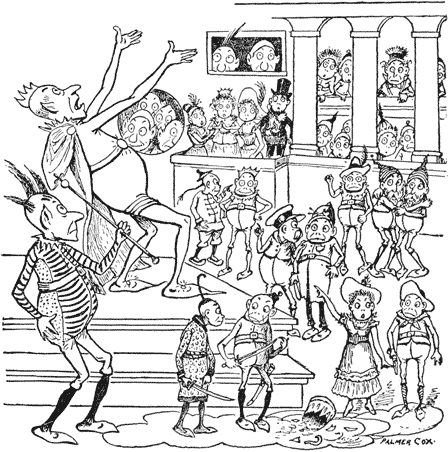
Under the fierce, determined assault the doors gave way and toppled in, while through the opening swarmed and crowded the band of eager Brownies, with Prince Florimel in their lead.[180]
At almost the same instant, through other doors, poured Dragonfel’s hosts, with Vulcan’s red imps somersaulting and leaping among them, and there were so many of them, and all so big and powerful, they well might cause dismay to the stoutest heart.
“So be it then!” cried Dragonfel, grandiloquently, for the sight of all these great, hulking fellows gave him renewed confidence. “It is power against power!”
And, striking a pompous attitude, he cleared his throat, and placed his hand on his chest.
“Stand back!” shouted King Stanislaus. “He’s going to speak a piece!”
Then Dragonfel poetically spouted:
This incantation, punctuated, as it were, by Vulcan’s imps, who threw balls of fire into the air where the commas, semicolon, and exclamation point are above transcribed, was delivered with only fair elocutionary ability, but its effect was electrifying.
Almost with the last word uttered by his vindictive lips a tremor ran through the earth that brought to all a sickening sensation of fear. The heavy walls and ornate supporting pillars shook, tottered, and then fell with a terrific crash, that might well horrify all, as the vibrations of the earth continued.[181]
In another instant the magnificent palace lay in ruins illumined by fierce flames that leaped wildly from the apex of the volcano and licked with fiery tongues the very sky.
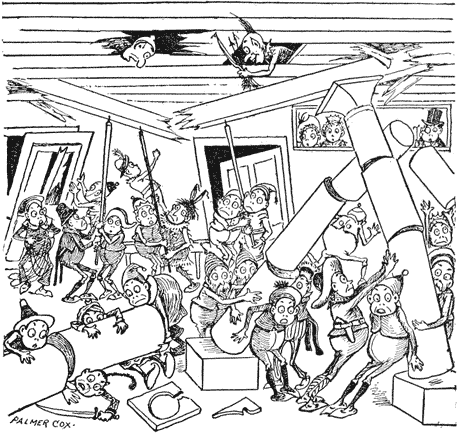
Shrieking and screaming with the horror of it all Dragonfel’s followers and the Brownies alike ran hither and thither, their warfare temporarily forgotten in this more appalling danger that suddenly had come to them. In their fright some[182] sought ridiculous places of refuge but it was a matter of speed.
True to their nature to help in all times of distress, the Brownies worked well to save things from complete ruin, and if the proper implements had been at hand the havoc would not have been so severe. But Vulcan was in no mood to quit the quake that was felt in all parts of the palace.
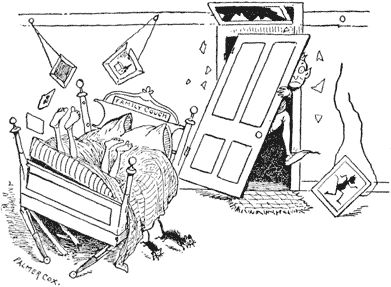
Even the State bed-chamber was not exempt, and things that had gone up with great care and cost came down with great crash and confusion.
But more terrible danger menaced them. The shock of the earthquake was over, and had wrought utter ruin. Still, as far as could be learned, in all the confusion, uproar, and wild excitement no lives had been lost. Far greater peril, however, threatened from which there did not seem to be a possible[183] way of escape, new horrors faced them on every side.
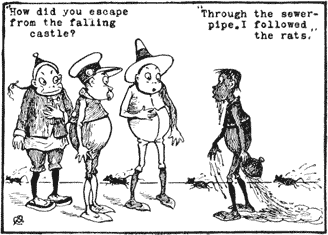
Round and pear-shaped volcanic bombs shot up with tremendous velocity from the crater’s boiling mouth, formed from the precious minerals stored for centuries deep in the treasury of the earth. And all of these in a molten red-hot liquid mass were flowing swiftly and irresistibly in a bubbling, hissing, steaming, seething, blood-red river straight on to where the unfortunate Brownies were among the ruins of the once proud and haughty palace.
Before all this occurred Florimel’s quick eye had noticed the audacious Red Spirit with his stolen bow and arrows, and he had sprung forward to wrest them from him. But the strange, repulsive creature evaded him mockingly, and flew off with his booty.
The disappointment of the prince was transformed to delight when the next moment he beheld Titania running to him with arms extended. But they never met, for before she could reach his side the terrible catastrophe of the earthquake and volcano happened, and they were jostled and crowded apart by the throng, who in their great terror seemed to have lost all control[184] of their senses. In all the turmoil careful watch was kept of the captives. Nearer and nearer came the molten stream of lava, and hotter and hotter grew its scorching breath, while huge trees in its remorseless path flared up and shriveled away in an instant.
When the stunning shock to his nerves was exhausting itself, King Stanislaus in a dazed way began to think, with the full realization that whatever there was to be done had to be accomplished quickly.
Suddenly he recalled the frame building they had passed in[185] going to the palace. If it housed as he most fervently hoped it did a complete equipment for fighting fires it might prove the very means by which the Brownies could grapple with a situation that was becoming more and more intolerable.
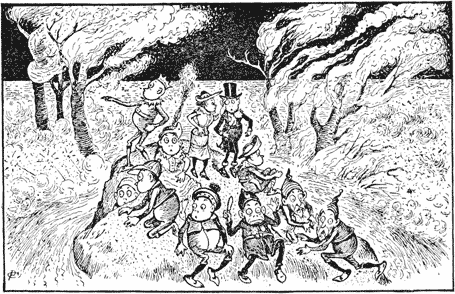
Promptly he communicated his plan to various members of the band, as he spied them, and the word was passed around from one to the other, until all were fully conversant with His Majesty’s views. And very soon all these agile sprites, with King Stanislaus and Prince Florimel in the lead, were racing helter-skelter back to the wooden structure that bore the inscription: NEPTUNE HOOK AND LADDER CO. NO. 1.
They broke in the doors, and soon were prying into every nook and corner of the place. And, while King Stanislaus forthwith seized a fire-trumpet that was hanging from a hook on the wall, Brownies were donning with the greatest haste fire[186] helmets that even with paper stuffed in them came down over their ears, and putting on rubber boots and coats intended by Dragonfel for his followers, and which proved but sorry fits, for the boots came well up over their waists, and had to be turned back, and the coats trailed after them like the long trains of fashionable ladies’ gowns.
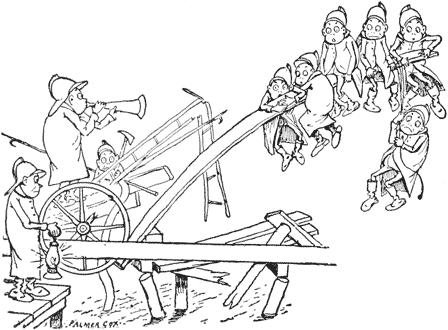
The energetic monarch was rather disappointed to find upon inspection that the machine instead of being one of the modern, up-to-date kind was of a very antiquated type, a brake-engine with man-handles that had to be worked by hand to throw a stream of water. But he was greatly relieved to discover that there was an abundant supply of hose, for in providing himself with this the enchanter evidently had made a nice calculation[187] of the distance from the crater of the volcano to the stand-pipe connection in the palace, and he had allowed plenty to spare.
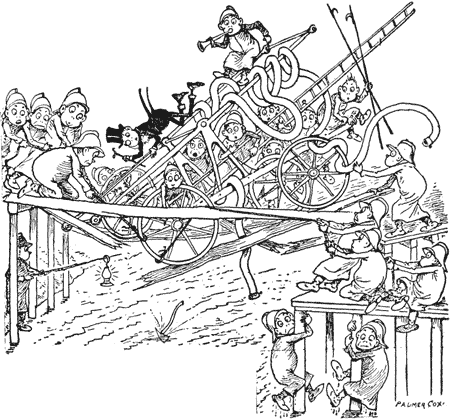
In stentorian tones His Majesty shouted out his orders through the fire-trumpet, and the Brownies hauled out the engine and hose-carriage. Then they all took hold of the long ropes attached to them, and started on a run for Dragonfel’s ruined palace, that now was little more than a tumbled heap.[188]
Brownies perched on the engine, and one kept clanging the bell furiously. Some who ran with the ropes tripped on the trailing tails of their rubber coats, but they never let go, and were dragged along by their surer-footed companions.
After they had gone some distance the Policeman began shouting in remonstrance, and King Stanislaus ordered a halt to hear what he had to say. “What is it, officer?” asked His Majesty. “We’ve got to go back,” panted the Policeman. “Some of us forgot to put on red shirts.”
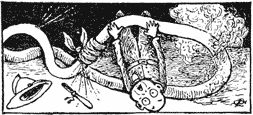
Though King Stanislaus felt very much chagrined at such neglect, he realized that it was now too late to remedy this most important matter, for every passing moment was precious. So he bellowed through the trumpet instructions to continue, and pulling and straining at the ropes they flew on, with the engine and hose-carriage bumping, lurching, and swaying after them.
On and on they went, pit-patting at last across the rickety old wooden bridge, but before they could drag the engine across it one of the planks snapped in two under its weight, and the wheels on one side went down through the opening almost as far as the water below.
The engine was firmly stuck, and though the Brownies tugged and strained at the rope, puffing, panting, and exerting all their strength, they could not even so much as budge it.
Nearer and nearer came the terrible river of fire, and the volcano seemed to be reaching even greater activity. It looked as though this effort of the Brownies was in vain.
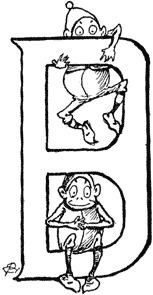
THE BROWNIES FIGHT
THE FLAMES
But once more the indomitable spirit of King Stanislaus manifested itself. Though the fire-engine was jammed in between the joists and timbers of the bridge, and could not be extracted by pulling the rope, the plucky monarch would not allow himself to be vanquished without a struggle.
He caused the Brownies to bring heavy planks, and farther directed them to wrench off the guard-rails of the bridge. The ends of these were placed under the engine, while at those opposite the sprites exerted as powerful a leverage as they could at the same time comrades were pulling with all their might and main at the rope.
Finally their combined efforts resulted in raising the engine up on the bridge again, after which it was easily rolled upon the road.[190]
This unfortunate delay had seemed much longer than it really was, owing to the exigency of the situation, but they made up for lost time during the rest of the distance, and reached the site of the ruins without further mishap.
The lava was almost upon them, and they were nearly suffocated by the intense heat. But, while King Stanislaus ran here and there directing the preparations, and shouting his orders through the fire-trumpet, they quickly unwound the coils of hose and effected a connection with the stand-pipe.
The water was thereupon turned on, and while Brownies in helmets, rubber coats, and boots held grimly on to the hose and trained the big brass nozzle on the fast approaching lava, others manned the handles of the engine, a half dozen or more being required at each end, and flew hanging to them up and down through the air to furnish the necessary pressure.[191]
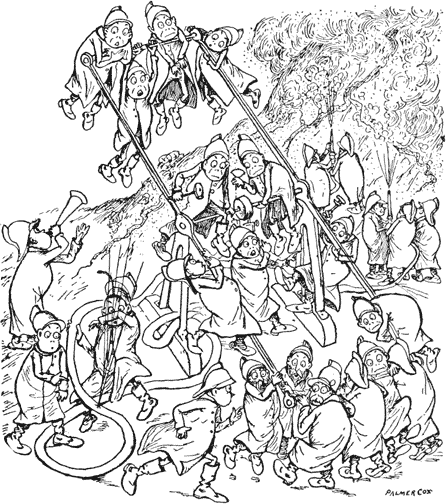
Though the engine was old and out of repair, it had one redeeming feature. It could throw two or three streams of water at once as well as one, and the Brownies in their great need forced it to the limit.[192]
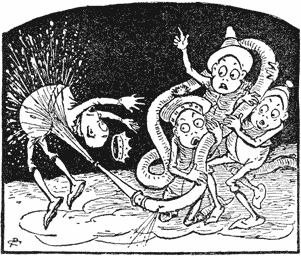
Immense volumes of water gushed out at the lava, and their contact produced a hissing, boiling sound, while the air was almost immediately filled with steam which became so thick that it could almost be cut with a knife. In the thick vapors that arose their forms could only be distinguished dimly, and they seemed like shadows flitting to and fro.
At times the hose burst in various places, and streams of water from them spouted high into the air involving waste, but King Stanislaus proved himself equal to all emergencies.
“Stick your fingers in the holes to keep the water in,” he shouted through the trumpet.
Brownies either poked their fingers through the openings or held their hands against them to prevent the escape of water. The hose got away from those who were holding it, and the terrific stream drenched the Dude, Chinaman, and Indian who were directly in its path, sweeping them off their feet. In another moment the Brownies regained their mastery of it, and once more the water was directed full at the blazing lava.[193]
Such efforts were bound to achieve results, and these King Stanislaus noted with great satisfaction.
“We’re gaining on it!” he announced exultantly. “Just keep it up, boys, and we’ll soon have the fire out.”
Thus encouraged, higher and higher flew the Brownies on the handles of the engine, while others continued to play the hose upon the descending lava, which hissed, steamed, and bubbled as the water struck it.
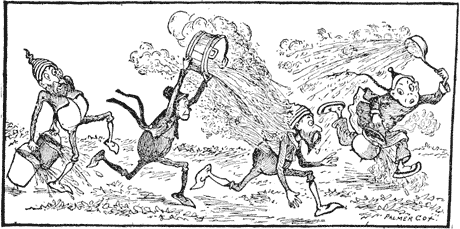
As the lava cooled off it formed a composition resembling asphalt, and upon this the Brownies could walk, unwinding as they did so more and more hose, and all the while getting nearer and nearer to the volcano.
Finally they were directing the stream down the crater’s mouth, which gurgled, gasped, and then instead of flame began to emit smoldering smoke which grew less and less in volume.
“I guess that settles Mr. Volcano!” triumphantly cried King[194] Stanislaus, as he wiped beads of perspiration from his royal brow.
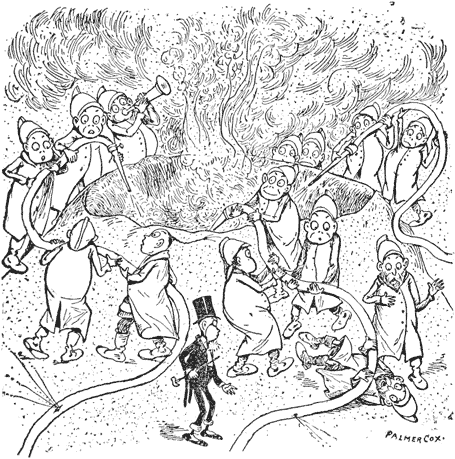
“It’s a pity the palace was destroyed,” remarked the Student.
“It’s Dragonfel’s own fault,” said the king, “and he has only himself to blame. I wouldn’t have that man’s mean disposition, no, not for all the jewels and mines he possesses.”[195]
“Even if he has lost his palace,” said the Dude, “he’s got a fine new macadamized road to the volcano. With a jitney-bus he can make a lot of money from tourists.”
The fire was practically extinguished, and all danger from it had passed. It was well that this was so, for the first rays of the sun were beginning to appear in the brightening east, and the mystic powers of the Brownies which come at night were fast being exhausted.
When the valiant fire-fighters at last had the volcano under control, Prince Florimel gazed anxiously around for Queen Titania, Dame Drusilda, Violet, and Daffodil, but none of them was in sight.
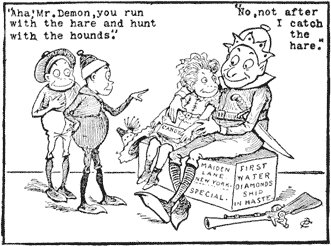
Neither could he observe Dragonfel nor any of his followers, for when they had become assured of safety these cravens had fled, leaving the Brownies to do all the work.
Florimel ran hither and thither, searching among the ruins for those he was so eager to find, and calling aloud their names, but there was no response to his cries, nor could he discover the slightest trace of them anywhere, which alarmed him greatly.[196]
The Brownies were taking a much needed rest, but he got them all to join in the quest, and they hunted in every nook and corner thereabout without success.
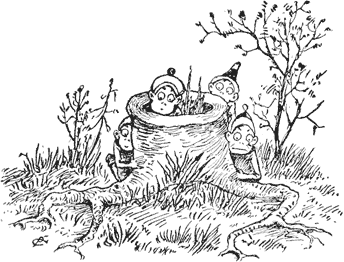
“This is indeed strange,” said King Stanislaus, very much puzzled. “They were here just a little while ago, for I saw them myself. I didn’t pay any particular attention to them at the time, for the volcano was keeping me pretty busy.”
“They have made their escape,” said Florimel, “and have again carried off the queen and her companions. The question is, where have they gone?”
“I do not think they have gone far,” said the king, and his eye swept the harbor where the galleon was plainly visible. “Perhaps they are on the ship, but I very much doubt it. It may be they are hiding somewhere near.”
Suddenly the Policeman who was still prowling stealthily[197] around poked his club in a dark, out-of-the-way corner into something flabby which at once emitted a queer, cackling shriek so uncanny that everyone jumped back in fright.
The next moment he quickly reached in his arm and drew out by the ear the quaking, shaking Demon Usher who had no opportunity to practice his eccentric locomotion, but was obliged to crawl after his captor on his hands and knees.
The Policeman led him by the ear to King Stanislaus who eyed him sternly.
“Mercy, have mercy!” shrieked the Demon Usher, in abject terror, and he shook as though he had the dumb ague, chills and fever, and something else besides. “Oh, kind sir, I will be your slave for life, and obey your slightest wish. Only don’t kill or torture me, I beg you!”
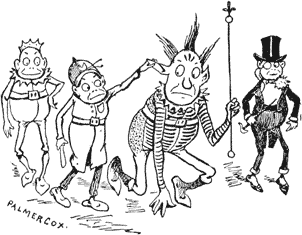
“Tell the truth, or it will be the worse for you,” said King Stanislaus.
His words in no sense were a threat, for it is always the worse for anyone who does not tell the truth. But they only[198] served to increase the fears of the poor, frightened wretch who shook as if he had added St. Vitus dance to all his other symptoms.
“Spare my life!” he whined, with his teeth clicking against each other like castenets. “Oh, please, sir, spare my life! Ask me anything you like, and I will answer you. Yes, and though it is very hard for me to do so, I will speak the truth. Let me be your slave, and fan you, and black your boots!”
“Where is your master?”
“He is gone.”
“Yes, we know that already. Where has he gone?”
The Demon Usher looked around timidly as though to assure himself that neither Dragonfel nor any of his followers was within hearing, and then said, with an air of great cunning:
“If I tell you, will you let me go?”
“Yes,” said King Stanislaus. “I give you my promise.”
“Then I will tell you,” said the Demon Usher. “He has flown with his captives to his mine.”
“His mine?” echoed His Majesty.
“Have you not heard of it?” asked the Demon Usher in great surprise. “Why, it is the most wonderful mine in all the world. Every jewel known to a lapidary is there.”
“Where is it?”
“Near by.”
“Lead us to it,” broke in Florimel eagerly.
“Come with me,” said the Demon Usher. “I will show you the secret passage-way through which Dragonfel and the rest entered.”
Florimel made an impatient start to be off, and the Brownies showed their willingness to follow him through all dangers, but King Stanislaus, more careful, raised his hand to call a halt.[199]
“Stay!” he cautioned. “This may only be a ruse to trap us. How do we know this is the truth?”
“It is the truth,” averred the Demon Usher. “Follow me and I will soon prove it to you.”
He moved off with his queer half-skip and half-jump, cocking his eye behind at them as if he feared they would try to stop him. But no one made any attempt to do so, and he appeared very much relieved.
Close at his heels came Florimel and the Brownies, with King Stanislaus among them, but the monarch looked ill at ease, as though he suspected treachery of some kind.
The Demon Usher led them to a slight rise where there was a rocky formation, and stopped before a boulder so huge that it would have required the strength of many men to move it.
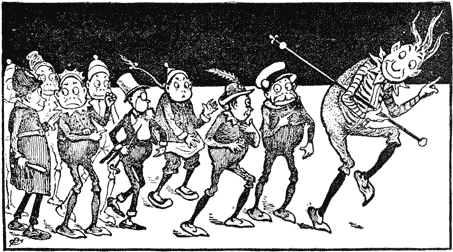
Searching with his long, thin fingers for a certain place, he found it at length, and pressed against it as hard as he could.[200]
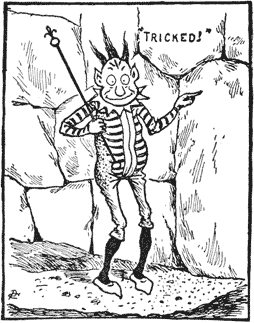
To the surprise of all the rest, the boulder began to slide easily away, disclosing the entrance to a dark, subterranean passage.
“Follow the passage,” cried the Demon Usher triumphantly, “and it will lead you to Dragonfel and his captives!”
Florimel and the Brownies at once entered, and King Stanislaus ran after them.
“Stop!” came his warning. “Before we go any farther let us first consider.”
But when they were all inside it suddenly grew pitch-black, as the boulder quickly slid back into its place.
From outside they heard the Demon Usher give a hoarse cackle of exultation.
“Tricked!” ejaculated King Stanislaus. “We are caught like rats in a trap!”
THE FLIGHT TO
THE MINE
In bringing about the destruction of his palace Dragonfel’s only thought had been the destruction of the Brownies. He had hoped to crush the sprites by means of the falling walls and columns, and when he invoked Vulcan for the assistance he felt sure would be given to him he was very careful to keep out of harm’s way himself.
But like many another vindictive, revengeful person the wicked enchanter overreached himself. He had no idea when he called upon Vulcan to get busy that the latter would make such a good job of it.
He fully expected the palace to topple down, for that was[202] what he had asked for. But he did not want the volcano that had been thrown in for good measure. It made things too hot and uncomfortable.
He was very much alarmed when he saw the volcano in violent eruption, for he realized that the downpour of lava boded ill for himself as well as for others over whose safety he was not at all concerned.
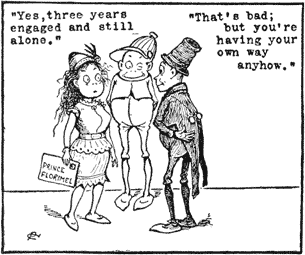
Thinking only of himself, he was on the point of ordering out his volunteer fire department to subdue the flames in the crater when to his great relief he noticed that King Stanislaus had taken the matter out of his hands.
From his place of safety Dragonfel watched the operations of the Brownies, and he breathed more freely when he noticed that they were getting the fire well under control, so that the prospect of all danger was fast being removed through their energetic efforts.
He realized that after the volcano was subdued these indomitable little people would devote their attention to him, and in considering what the outcome would be he grew more and more uncertain. As a matter of fact, he was beginning to fear[203] the mystic power of the Brownies, and he very much doubted if his big followers with all their boasted strength were a fit match for these sprites who had not only cunning but courage.
He decided that in the clash which was bound to come it was best not to risk any chance of defeat in a fair, open fight, but by underhanded means to overpower them.
Then the diabolical scheme of making the Brownies prisoners, and setting them to work in his mine, presented itself. If he fled there with his captives, they would undoubtedly follow in pursuit, and once in the mine they easily could be made helpless.
The Demon Usher at his feet was going through all sorts of contortions of fear, and Dragonfel looked sneeringly down at him.
“Stop your shaking, and listen to me,” he commanded. “We are going to take the captives to the mine.”
“Let us start at once, kind master,” said the Demon Usher, in a fever of impatience. “If it gets cool here it will be too hot to hold us.”
“You will be the only one to stay,” said Dragonfel.
“Oh, say not so, kind master!” cried the Demon Usher, shaking with even greater violence than before. “If they catch me they will kill me.”
“Then it will be good riddance to bad rubbish,” was Dragonfel’s unfeeling retort. “I said you were to stay, so that settles it. When the Brownies ask you where we’ve gone, you’re to tell them to the mine. They’ll probably make you lead them to it. When they do take them to the secret entrance, and after they are in close the boulder on them. Do you understand me?”
“Yes, I grasp you perfectly,” said the Demon Usher, “but, oh, kind master, I have a weak heart, and at times it fails me. Would it not be better to intrust a delicate matter like this to[204] Snoutpimple?”
“After they are imprisoned,” went on Dragonfel, unheeding the suggestion, “you can come around by the main entrance, and let me know.”
Just as soon as he was fully convinced that all danger was over the enchanter passed the word around among his followers to decamp, and this was effected so insidiously that the Brownies did not notice it.
They laid rough hands on Queen Titania, Dame Drusilda, Violet, and Daffodil, muffling the cries for help they tried to make, and bore them with great haste from the scene of excitement; the waving arms and kicking availed them nothing.[205]
With their struggling, protesting burdens in their arms they ran toward the mine, and descended into it by the main entrance. When they reached the great shaft where the mine-sprites were hard at work, Titania, Dame Drusilda, Violet, and Daffodil were released, and they looked around with wonder and surprise.
The mine-sprites cast furtive glances of curiosity at these[206] strange new faces that invited confidence, but so frightened were they when they saw their cruel master that they redoubled their efforts, and their fingers fairly flew as they dug them in the earth for precious stones.
“Poor little things!” was Queen Titania’s involuntary cry. “The work is too hard for them.”
“I’ve been thinking of that,” said Dragonfel, with a chuckle, “and I’ve decided to put an extra force on.”
“Do you mean to set us to work?” asked Dame Drusilda indignantly.
“Perhaps,” said Dragonfel, with a horrid grin. “Just now, though, I’m going to take you all to another part of the mine where we’ll await developments.”
As he spoke he seized Titania’s hand, and began to drag her off down one of the dark passage-ways. In the same manner Mandrake followed with Dame Drusilda, while after him came Boundingbore with Violet and Daffodil.
The mine-sprites watched their retreating forms, but they were too terrified to speak a word, and were helpless to aid them in any way.
Dragonfel led the rest along the subterranean passage until at last they came to a square chamber that had been cut with much skill into the solid rock.
When Mandrake lit a crystal lamp the great magnificence of the place was revealed.
The floor and walls were inlaid with precious jewels in designs that were truly wonderful. Divans were built in at the sides, and the various creatures of the wild were represented everywhere.
For all his short-comings, Dragonfel seemed to have a great respect for animals, and gave their skins at least a rest on his[207] floors and walls where they could grin at spiders and moth-millers with some show of satisfaction.
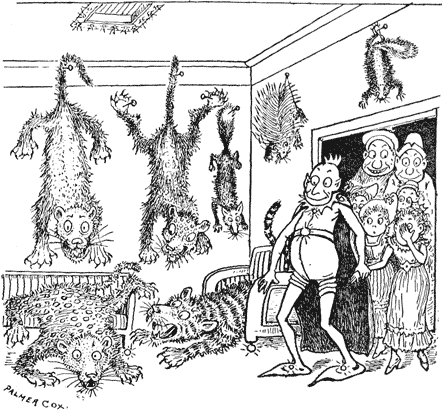
At the ceiling which was thickly crusted with diamonds there was a slender open shaft that evidently had been made to provide air and light but which was too small to provide a means of escape.
“This is where you’ll stay,” announced Dragonfel. “The place isn’t half-bad, as things go, so you ought to make yourselves fairly comfortable in it. You’ll find both hot and cold[208] water in the little ante-room screened off by those peacock-feather portières. Your meals will be brought to you. If you want to read there’s the dictionary.”
“How long are you going to keep us here?” asked Titania, with a sinking of her heart.
“Always, and maybe longer,” was Dragonfel’s gruff response. “Have you brought your knitting with you?”
“If you think you can keep us here against our will,” said Titania, in a decided tone, “you will find that you are very much mistaken.”
“How so?” said Dragonfel contemptuously.
“It won’t be long before the Brownies are here.”
“That’s what I fully expect,” said the enchanter, with a knowing wink, “and after they come there’ll be something doing, believe me!”
He laid great emphasis upon the last two words, and in spite of all her confidence in Florimel and the Brownies Titania was filled with great uneasiness.
But she knew that further words would be wasted on him, so she said nothing more. With Dame Drusilda, Violet, and Daffodil she retired to a corner of the room, as far removed from him as possible, where they discussed among themselves in whispers this new phase of the disagreeable situation.
They hoped that Dragonfel and the rest would go, but still they lingered, and the enchanter at times looked up at the narrow opening cut into the ceiling. Finally he gave expression to a grunt of satisfaction as something he had been watching for met his gaze, and they noticed with him that a golden flood of sunshine was pouring through the opening.
“Day at last!” he cried, and, almost with his words, the Demon Usher made his appearance with a hop, skip, and jump, while at his back stood a half-starved looking demon whose[209] hair had not been cut for a long time, and who had a distinctly artistic appearance.
“Master, kind master,” the Demon Usher joyously cackled, “I bear good news. The little commission you intrusted me with I executed to the best of my ability. Oh, master, you should have seen how brave I was. I was with them single-handed, yet I was more than a match for them all. I had the whole band in terrible fear of me.”
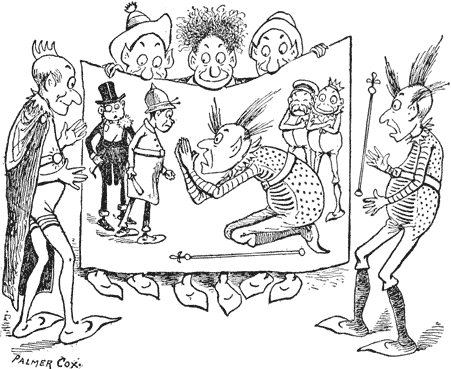
“Stop throwing bouquets at yourself!” ordered Dragonfel. “Tell me where they are.”
“It’s all easy now,” went on the Demon Usher. “The dangerous part has been done by me. I’ve got them so cowed[210] that now they’ll eat out of your hand. I captured them all by myself, and drove them into the south lode, where they wait to do your bidding.”
“Will you permit me a word, kind master?” then spoke up the half-starved looking demon, as he unrolled a large sheet of paper. “He doesn’t deserve a medal, or even honorable mention. I took a rough sketch of him when he had the Brownies at his mercy, and here it is.”
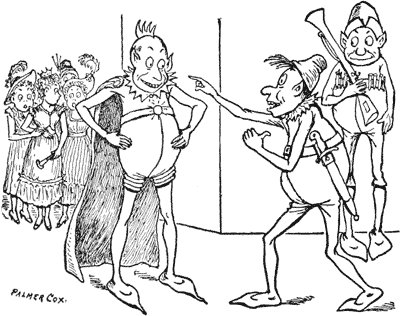
Dragonfel stared at the effort in astonishment.
“You have missed your calling,” he remarked. “You should be in the Academy of Design.”
Titania had listened with fast increasing alarm, and now with Dame Drusilda, Violet, and Daffodil she advanced quickly toward him. “Of whom is this creature speaking?”[211] she asked, in evident distress. “Of the Brownies?”
The Demon Usher uttered his disagreeable cackle as Dragonfel exultingly responded:
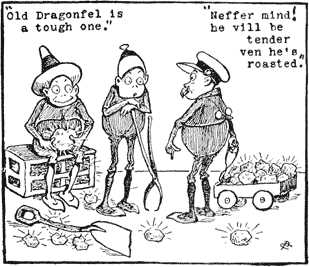
“Yes, the Brownies! They are prisoners like yourselves. Their nights of adventure are over, and they’ll never more delight in harmless pranks and helpful deeds. Those who seek their aid will henceforth look for them in vain. They are doomed to slave in this mine for the rest of their lives!”
Then Grouthead came up running, and he cried in great excitement:
“Master, kind master, we have captured all the Brownies, and they are helpless. What shall we do with them?”
“Set them to work at once,” spoke Dragonfel. “I will go back with you to gloat over them.”
He started immediately, and Titania and her companions attempted to follow, but Mandrake barred the way, and held them back.
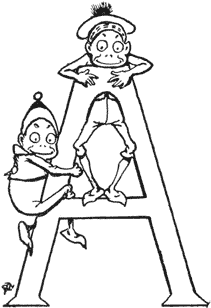
THE MISSION OF
THE DOVE
After the huge boulder had shut in the unsuspecting Brownies their only alternative was to follow the winding passage-way of the mine wherever it might take them. They could not remain where they were to perish miserably of hunger and thirst, so they crept cautiously along in the dark with the faint hope that in some way they might gain the open. But the passage they were forced to travel led them direct to the main-shaft where the mine-sprites were at work. Nearly all of Dragonfel’s followers were there waiting to receive them. For the Demon Usher after imprisoning them had descended by the main entrance and gleefully imparted the news, claiming high honors.[213]
Sheepishly the Brownies slunk in, with the Dude’s white handkerchief fluttering at the end of his cane in token of the band’s complete surrender, for King Stanislaus knew how useless it would be to offer any resistance.
They were all huddled together in a body, and a sorry, crestfallen lot they were. Never before had such great misfortune overtaken them.
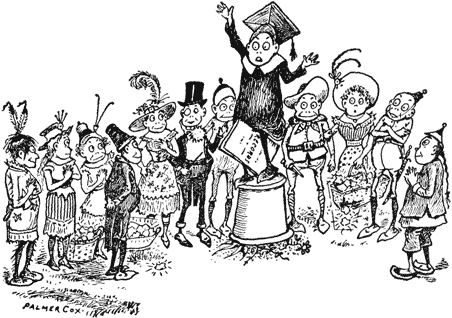
At times the Student Brownie would discourse on Liberty, Justice, or Good Fellowship, and find appreciative listeners, and he lifted up their hearts by assuring them that history repeats itself, and that they would yet enjoy the freedom of the comets and wandering stars.
While others of Dragonfel’s followers guarded the Brownies so that they could not escape, and brandished sharp-pointed[214] spikes, battle-axes, bludgeons, and other formidable-looking weapons significantly, Grouthead ran in hot haste to inform his master.
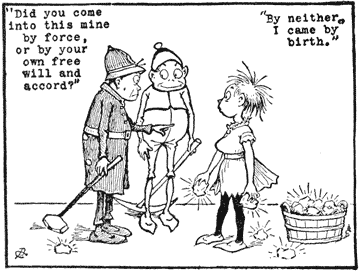
Soon the wicked enchanter made his appearance, and his rubicund face showed high elation.
“Put ’em all to work!” he shouted.
“Don’t let ’em stand here idle.”
“What do you want me to do?” asked King Stanislaus meekly.
“Here, stop your talking, and get busy!” cried Snoutpimple, thrusting in the king’s hand a pick.
“I haven’t any choice,” said His Majesty, “so I’ll have to take my pick!”
The airy persiflage was lost upon Dragonfel, who frowned on him severely.
“I’m a king in my own right,” continued the monarch, pointing to his crown, “and never used a pick except to bury a dead dog, but I’ll not make a scene in the presence of my subjects,[215] so here goes for the jewels.” His cheerfulness told on others.
“If it was digging shedder-crabs or scallops,” remarked the Sailor, “I’d soon fill a basket.”
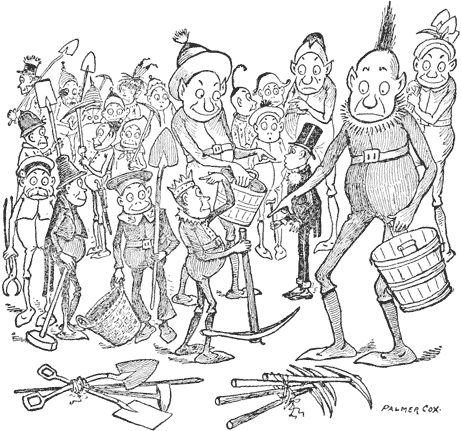
“I’ve broken stones before,” said the Irishman, “but this is the first chance I ever had to get a whack at diamonds.”
“Vell,” said the German Brownie, “if I see somedings in dot blace shining like blitzen I bulls him oudt alretty yed und say noddings!” They were then hustled off to their new tasks.[216]
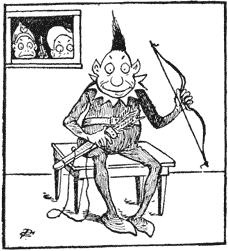
With the mine-sprites and Brownies the king started to dig away, and he tried not to shirk, but to do his stint with the rest of them. The sight of royalty reduced to hard labor affected all his subjects greatly, though they had little opportunity for sympathy so severely did their taskmasters press them.
The heaps of precious stones piled up higher and higher, and their eyes fairly blinked at the sight of them.
“I never saw so many jewels before in all my life,” declared His Majesty, wincing as he felt a sudden crick in his back. “Whenever I look at them I feel just as though I were going to break out with carbuncles.”
“I wonder when they’ll bring us something to eat,” said Florimel, who was beginning to grow hungry.
He was very much relieved when some time later Boundingbore appeared with a cauldron of lukewarm soup, which was served in skimpy little plates.
“Here, take mine back,” complained King Stanislaus. “Look what’s in it! Just imagine what would have happened to me if I had swallowed it.”
As he spoke he held up a pin which he had found in his soup.
“It wouldn’t have hurt you, Your Majesty,” said the Policeman. “It’s a safety pin.”
Now and then some adventurous Brownies would discover a[217] new dark passage, and with the hope that it might lead to liberty the more progressive would get their heads together and plan a break for freedom.
For a time it looked as though one of these attempts would be crowned with success, and liberty itself seemed to beckon in the offing. But, just as promising enterprises in our own uncertain careers often end in disappointment, so would each noble effort only result in a punishment of heavier burdens and shorter rations.
Mandrake with a tray of food went down one of the dark passages, and soon returned empty-handed. This Florimel noted, and he said to King Stanislaus:
“Your Majesty, Titania and her companions must be over there. I am going to try to find them.”
He took from the Sailor, who had charge of it, Euphrosyne’s dove, and, opening the bosom of his jacket, let it cuddle close against his breast, with just its head now and then showing.[218]
At a moment when the attention of all Dragonfel’s followers was temporarily diverted by some remarkable discovery he made a sudden dash down the passage where he believed Queen Titania and the others were imprisoned.
His companions grouped themselves together to screen his fleeing form as best they could, and he succeeded in getting away without detection.
Florimel ran along the passage, and his supernatural vision guided him. So when he came to a gem-crusted door he was able to see stretched before it a form that he at once recognized as the Red Spirit.
The lazy fellow had been left to guard the prisoners, but had neglected his duty, and was fast asleep.
Florimel heard him snoring away so that he knew his slumber[219] was a heavy one, and he tiptoed up to him with confidence.
He was rejoiced to see lying beside him the bow and four arrows, and he noiselessly reached for the bow, and restored the arrows to his quiver.
Then he turned the big diamond that served as a knob for the door, and stepping cautiously over the unconscious Red Spirit, entered.
Titania, Dame Drusilda, Violet, and Daffodil were seated upon one of the divans, and they sprang up joyously when they saw him.
“Florimel!” cried Titania, and ran toward him.
“’Sh!” he warned, and closed the door softly after him. “The Red Spirit is supposed to be guarding you, but he has fallen asleep. We must be careful not to wake him.”
They embraced fondly, and Titania asked:
“When will the Brownies take us away from here?”
Florimel shook his head despondently as he answered:
“I am sorry to say that we are all prisoners like yourselves. See, Titania, I have brought you this. I thought perhaps that it might help us.”
He took the little cooing creature from the bosom of his jacket and stroked its soft sides.
“Euphrosyne’s dove!” exclaimed Titania. “There is a shaft above through which it can escape. Let us send it with a message to her.”
Upon a scrap of paper she hastily wrote the words:
“Euphrosyne, Fair Goddess of Mirth:
“Dragonfel the wicked enchanter holds us captive in his country. Help us, we beseech you, before it is too late.
“Queen Titania.”
While she wrote Florimel noticed with some uneasiness that water was trickling down the walls and that in some places on the floor pools had already formed.
“Tie the note to the dove’s neck,” he said. “Let us dispatch it immediately.”
They did so, and he flung the little creature upward toward the shaft. Its talons clutched a side precariously while it fluttered its wings to sustain itself in the frail, uncertain hold it had.
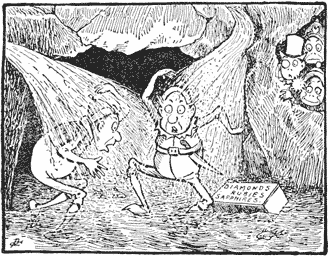
“Poor little thing!” said Titania, when she noticed that it was in great danger of falling. “It cannot help us.”
“Look!” cried the excited Violet. “It is making for the opening.”
To the relief of all its watchers the bird crept through the shaft and disappeared.
“Good luck go with it!” was Dame Drusilda’s fervent ejaculation.
“Oh, Titania, Titania,” said Florimel, “it may be our happiness depends upon that bird!”
Then almost immediately afterward to their utter horror and[221] consternation water in immense volumes began to pour down through the shaft until blinded and drenched as they suddenly became it seemed to them as if all the flood-gates of the earth had been opened.
“Quick!” shouted Florimel. “We must get out of here!”
He flung open the door, fearing that the Red Spirit was still outside, but the terrified clamor of voices that rose from all sides had caused him to desert his post.
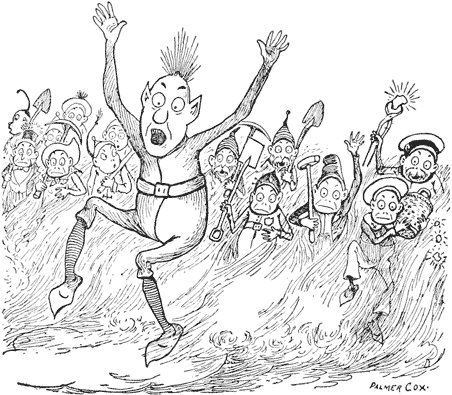
The water which in an incredibly short time had risen nearly to their waists began racing down the passage, but still it did[222] not appear to recede. “Let us go at once,” urged Florimel, “for if we stay here we shall be lost.” He gathered up the trembling Titania in his arms, and with his burden staggered through the water toward the door, while Dame Drusilda, Violet, and Daffodil followed close upon his heels.
Down the passage that had now become a violent raceway of raging, foaming water they all fled, for Florimel realized that their only chance of escape, small as it might be, was to join those who were familiar with the entrances to the mine.
But as they got closer to the main-shaft the confusion and uproar grew wilder, and with a sickening feeling he became aware that those whose help he had hoped for were quite as powerless as he. Ear-splitting shrieks of horror made a very pandemonium of awful sound, and over all was heard the despairing cry of Grouthead: “The mine is flooded, and the force-pumps can’t save us. We shall all be drowned!”
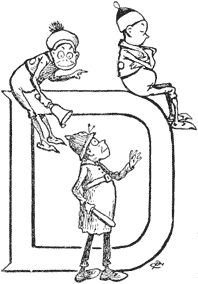
DISASTER TO
DRAGONFEL
Dragonfel’s mine was flooded, and as the water kept pouring in from all sides, there was no escape for the unfortunates who were in its chambers.
The passage which was mainly used in a descent to the mine had become a raging river impossible to withstand so deep was it and with a current so strong.
The way by which the Brownies had entered the mine was blocked by the giant boulder which could only be removed by the pressure of a secret spring from the outside. The boulder had brought captivity to the band, and now it threatened even direr results, for those several tons of stone stubbornly barred the way to safety.
It was evident that the violent disturbances deep down in[224] the earth which had caused the earthquake and volcano were likewise responsible for the flood.
The water came in streams from the entrances, cracks, and fissures until the main-shaft was transformed into a lake that constantly grew deeper, and through this with shrieks and screams all plunged, fleeing hither and thither, but with no definite point in their dazed minds.
Dragonfel and his followers in particular lost their heads, and their fear and cowardice were indeed pitiable. All their bravado had deserted them, and from the blustering bullies they had been they became sorry, trembling wretches vainly beseeching help and voicing the terror at their hearts in wild, unearthly cries.
But, though the Brownies were alarmed like all the rest, they still retained their presence of mind, and under the cool-headed direction of King Stanislaus they at once set about to do certain things, with the hope that a way would afterward be[225] found to get them out of all danger, helping hands were busy.
Prince Florimel assisted Titania, Dame Drusilda, Violet, and Daffodil to a ledge that was still out of the reach of the advancing waters, charging them most earnestly to remain there, after which he ran back, and added his efforts to those of his companions.
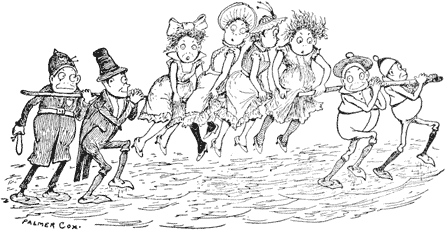
The little mine-sprites were most in need of aid, and to them the Brownies devoted the work of rescue. They were all in great peril of drowning, and though it seemed that such a fate could only be delayed for a time, they started to remove the poor, frightened creatures to places as far beyond the rapidly encroaching waters as possible.
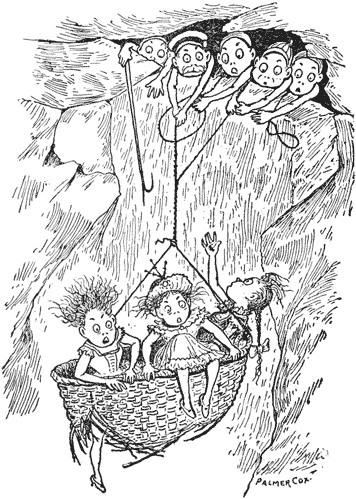
Brownies scaled the walls and lodged themselves in a pocket up to which they hauled with great effort a number of mine-sprites in one of the large baskets that were used in loading the jewels before they were carted away.
Others of the terrified sprites sought refuge by climbing over[226] the Brownies’ willing backs to a temporary refuge high among the rocks.
The Irishman, Scotchman, and German put three in a wheelbarrow, and started to trundle them off, but to their great dismay it turned over, and spilled them out. Assistance, however,[227] was quickly rendered, and with the mine-sprites back in the wheelbarrow they continued on their way.
Still the waters rose, and the excitement increased.
Dragonfel in the most abject terror stormed and shouted at his followers, issuing angry commands for them to exert themselves to do something, but they were all[228] helpless, and his words were wasted on the air to no purpose.
They were too frightened to be of assistance, even if it had been possible to render it, though in cases where one was overcome there were those who attempted the work of resuscitation.
The wicked enchanter ran about like a maniac, with little or no thought of where he was going, until suddenly with a shriek of fright he plunged into a circular pit that had been dug deep into the earth for a distance of perhaps fifty feet.
There was sufficient water at the bottom of the pit to break his severe fall, which was fortunate for him, as otherwise it would have resulted in his end.
He was stunned and dazed, but in nowise injured beyond some bruises, and he frantically reached up and clutched a[229] jagged point of rock by which he pulled himself out of the water that was nearly to his neck and promising him more.
The horror of his situation was at once made plain to him. Beyond this rock there was nothing by which he could maintain even the slightest hold, and the waters which were steadily rising would soon submerge him and end all.
His evil scheming had led to his own undoing, and in causing misfortune to so many he had brought upon himself the most terrible misfortune of all.
Looking up helplessly he could see a number of the Brownies trying to peer down at him through the darkness. They lay flat on their stomachs, and leaned as far out over the hole as prudence would permit.
“Help! help!” screamed Dragonfel, in a frenzy of fear. “Save me! save me!”
His piteous cries were heard by all the Brownies, and they looked at each other in doubt and uncertainty. When the monster whom they had every reason to fear had met with the mishap which now made him powerless it was not to be gainsaid that a feeling of great relief was experienced by one and all. No matter what harm might come to them from other sources, certainly his power to injure them was gone.
“Why should we help him?” said one of the Brownies. “He has harmed us all he could.”
“If he drowns,” said another, “he will never have a chance to do so again.” But King Stanislaus looked very grave.
“No matter how much he has wronged us,” he said decidedly, “he needs our help, so we must give it.”
“But he is our enemy,” objected the Policeman.
“That makes no difference,” said His Majesty. “He will drown if we do not aid him.”[230]
“If we save him,” said Uncle Sam, “he will only make trouble for us again.”
“We must not think of that,” said King Stanislaus. “He’s in distress, and doesn’t need to advertise it. That’s where the Brownies step in.”
He gave his orders, and the Brownies with the realization that there was not a moment to be lost ran with all possible speed for the long rope which they had used in hauling up the mine-sprites in the basket. This they brought to the opening, tripping and sprawling over it in the eagerness and anxiety they displayed.
They stood in a line, and lowered the rope down into the pit.
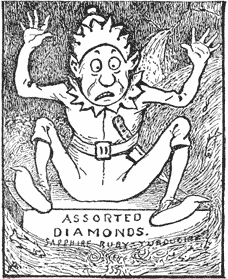
“Slip the noose at the end of the rope under your arms,” shouted King Stanislaus to Dragonfel, “and we will pull you up.”
The water was nearly over Dragonfel’s head by this time, and he had ceased his cries for help, for whenever he opened his mouth he choked and strangled. He heard the welcome words of the king as in a dream, but half unconscious as he was he reached out, and caught the rope, tightened his grip upon it. He discovered the slip-noose at the end, and with his senses fast leaving him had just enough strength left to adjust this under both his arms. When the Brownies felt the rope grow[231] taut they began to haul away with might and main. Around the pit now there were willing minds and itching fingers. Some fell over with their exertions, but in a trice they were up again to contribute all the strength they had to the work. “Pull away, boys!” shouted King Stanislaus encouragingly, with his own royal digits wound tightly around the rope. “A long pull, a strong pull, and a pull all together! That’s the ticket! Hurray! We’ll soon have him up.”
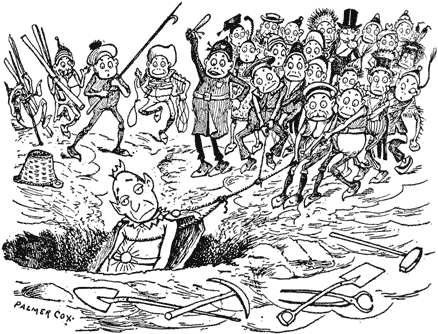
His words incited them so that through undue effort they suddenly lost their balance and sprawled over backward like ten-pins.
Like a shot Dragonfel fell back into the water again, almost dragging after him a half-dozen Brownies who still clung to[232] the rope. But others quickly grasped them by the legs, and prevented them from going over into the pit until a fresh hold of the rope was secured, and another attempt was made.
“Avast there, messmates!” cried the Sailor. “Give an old salt a chance at the fore-clutch on the hawser, and the old pirate will soon come up from the bottom of the sea!”
This time the Brownies were successful, and they pulled Dragonfel to the brink, and rolled him over to a place of temporary safety.
Water poured from his drenched form, and with a groan he relapsed into unconsciousness.
The Brownies looked first at him, and then at each other. Though no one said a word, all had the same thought.
Soon Dragonfel would revive, and then what would happen? They had saved their foe, but to what purpose? If by any chance they should escape the present dreadful danger they were in they would still be in the wicked enchanter’s power.
How would he use it?
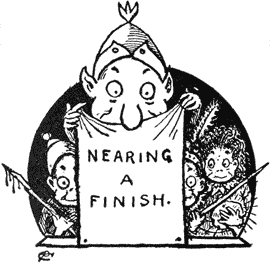
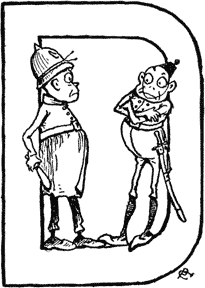
AND THEY LIVED HAPPILY
EVER AFTER
Dragonfel had been rescued by the Brownies at a crucial time when perhaps they might have been justified in trying to save themselves instead.
The water kept on swiftly rising, and it forced them out of the positions they occupied to ledges and pockets higher up on the rocks. To these all were forced to retreat, and the still senseless enchanter was carried after them by some of his cowardly, frightened followers who would have left him behind if it had not been for the stern command of King Stanislaus.
Still higher and higher rose the water till they were again threatened in their new places of refuge, and it soon[234] became evident that something had to be done, and that quickly.
There was but one passage-way through which the water was not pouring like that of a swift mill-race, and this was the one in which the Brownies had been trapped.
As the water ascended they were forced into it, and they continued on through it well knowing from bitter experience that the huge boulder effectually blocked the exit, and would hold them powerless until finally they were submerged by the relentless flood.
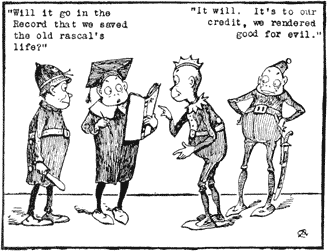
But still they went on, hoping against hope, until they came to the boulder. It was still in place, and though they exerted all their strength in trying to remove it they could not budge it to even the extent of a millionth of an inch.
Brownies used sticks as levers, and the demons employed brute force, but all their efforts proved in vain.
“It’s no use,” at last said King Stanislaus, wiping his perspiring brow. “It looks as though this would be the end.”
A sudden thought entered Florimel’s head—a wild, foolish[235] thought perhaps, but not any more so than when he had aimed his magic arrow at the crescent moon.
“Stand back, all of you!” he shouted.
He took one of the four arrows that were in the quiver, and placed it in the bow. Then he aimed it at the rock, and pulled the cord, making no particular attempt at a display of strength which he realized fully could not accomplish his purpose.
But to the infinite delight and astonishment of all a strange thing happened, that made the eyes pop in from every head.[236]
The arrow struck the base of the rock, which at the moment of contact burst into hundreds of jagged pieces that flew up into the air. As these fell they formed a series of steps that were as good as any mason could have planned.
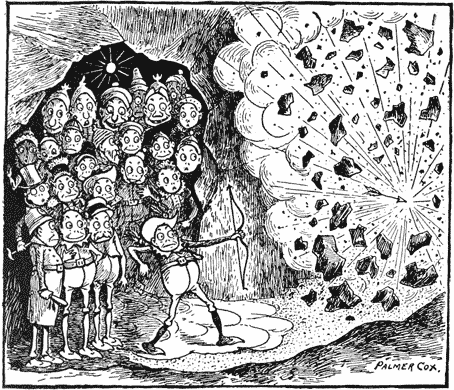
They ascended these steps with all possible haste up into the open, where the blue sky was above them, and where they could breathe freely the air that never before had seemed so sweet and pure.
Looking around they could note the ravages of the flood, for[237] with it there had come a mighty tidal wave from the sea, with abnormally high water that had changed the low marshlands into lakes, and had swollen the small creeks to roaring, rushing rivers.
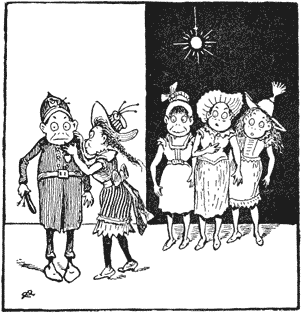
Just then a vivacious little mine-sprite found an opportunity to whisper to the Policeman:
“This is leap-year, officer, and, to speak freely, I loved you at first sight.”
“Well,” said the Policeman, with his usual composure, “to speak even more freely, your love at second sight is not returned.”
“I would be willing,” she said, “to fly with you to parts unknown.”
“That’s the trouble,” said the Policeman. “No parts are unknown to the Brownies. The world was our oyster, and we’ve opened it. We’re just as well known in Timbuctoo as Tarrytown!”
There was an angry swell that caused Dragonfel’s galleon to toss violently up and down, but it still held secure to its[238] anchor, and formed a picture inviting to a sailor’s eye.
The enchanter was laid upon the greensward by those who bore him, and he stirred uneasily, while his hand sought his forehead. Then he opened his eyes, and unsteadily tried to get on his feet, in which effort others sprang to his assistance.
“Where am I?” he asked, as dazed and puzzled he looked around. “What has happened?”
His gaze took in the Brownies, and, in spite of all they had just done for him, it was not a reassuring one. But somehow they feared him no longer, for they felt that no matter what further villainy he might attempt they were more than a match for him.
But before some one could answer Dragonfel Euphrosyne, the Goddess of Mirth, suddenly appeared in their midst, though no one could tell just how or from whence she came.
“Meddlesome spirit that you are,” she said sternly, addressing her words to the crestfallen enchanter, “you can no longer trouble the Brownies. Your commission to do evil has expired.”
“How so?” he demanded. “I made application for a renewal.”
“Yes,” she said, “but, through an error in the date, you were too late.”
“Too late?” he repeated blankly.
“Yes, by thirteen seconds,” she announced triumphantly, “and Beelzebub refuses to renew the policy.”
“Great Scott!” ejaculated Dragonfel, with much chagrin. “This comes of trying to run business without an almanac!”
“Henceforth you will be compelled to be good,” said Euphrosyne.
“Yes,” said Dragonfel, in a rather shamefaced manner. “It[239] may come rather hard at first, but I suppose I will get used to it in time. As a matter of fact, I’m growing rather tired of being bad. There’s nothing to it, after all. The only thing one gets from being bad is a lack of respect in the community.”
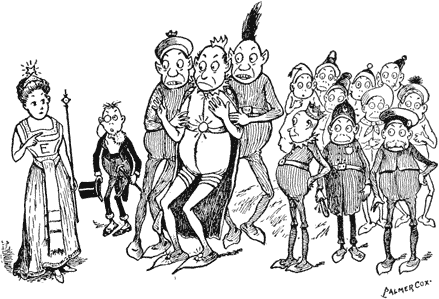
“I see you’re somewhat repentant,” said Euphrosyne encouragingly. “It’s a little late, of course, but still it’s better late than never. You understand, don’t you, that after this you’re to let the Brownies alone?”
“I should say I will let them alone,” coincided Dragonfel heartily. “The Brownies are too much for me. They have beaten me at every point. Even if I were disposed to do them further mischief I am placed in a rather delicate situation. I owe my life to the Brownies.”
“There is one thing on which I insist,” spoke up King Stanislaus.[240] “You must do something for these poor mine-sprites.”
“I will see that they are restored to their parents from whom they were stolen,” asserted Dragonfel hastily. “Furthermore they shall all be given handsome dowries, with a beautiful solitaire diamond of a half-dozen karats more or less for each, so that when the right young man comes along the engagement-ring will be easy.”
Here the mine-sprite who had expressed her preference for the Policeman gave him a coy glance, but he twirled his club, and looked the other way.
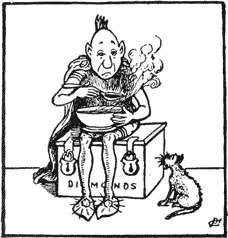
“It’s too bad about your palace,” said the Dude to Dragonfel.
“Oh, don’t trouble yourself about that,” said the enchanter cheerfully. “I never did like its style of architecture, anyhow.
I’ll soon have it rebuilt, and give the Union scale for labor, with double pay for over-time. The palace was a rather tame affair anyway, I ran too much to the emerald, topaz, and turquoise in its composition. I’ll make more use of the sapphire, the ruby and cornelian, in the makeup of the new structure; and those columns, I always felt a little weak over them, as they were only imitation chalcedony, the real thing goes in the next one, if I have to import it from Palestine.” The glances the Brownies exchanged showed they felt that they had struck a master in his line.[241]
It is said, that some of the Brownies, to this day, annually celebrate their deliverance from the mine, and the reformation of Dragonfel, by proudly parading half the night, bearing the implements they had to use while in captivity.
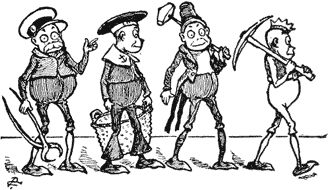
So delighted was King Stanislaus over the general outcome that his blithe spirits found expression in a jolly song that was a great favorite of his, and the Brownies all joined in the chorus. The words follow:
The refrain was so rollicking and infectious that when it was repeated Dragonfel and his followers could not keep from joining in with the Brownies, and they lustily roared out the words with a right good will.
The delayed wedding of Prince Florimel and Queen Titania was celebrated very soon after in the fairy-palace with all the joy and happiness that can come to such a momentous occasion.
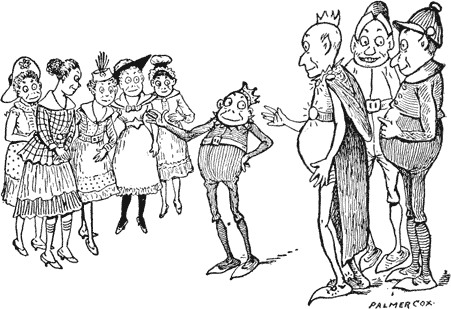
Brownies and fairies vied with each other in having a good time, and the walls rang with their innocent merry-making. Everyone said that King Stanislaus was the life of the party.
Dragonfel and his followers participated in the festivities, this time unfeared, and to the strains of a Brownie orchestra they mingled with others in the dance. Dragonfel even tried[244] to do the fox-trot with Dame Drusilda, which greatly delighted Euphrosyne who was among those present.
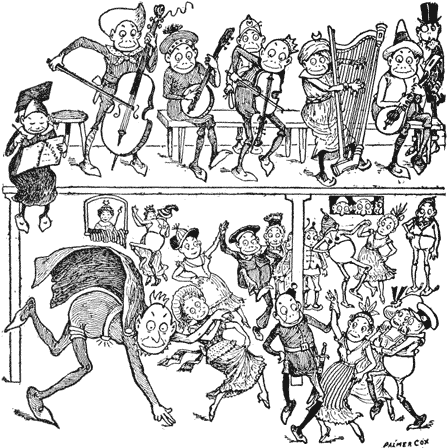
In place of the useless, cumbersome presents he had first brought the enchanter gave the bride the more appropriate and useful gift of a dozen bushels of precious stones.
So in this wonderful country King Florimel and his beautiful[245] queen are still living and ruling wisely, and, to make their happiness complete, there are little children round them.
To these King Florimel will leave the heritage of the magic bow and arrows, for life has glided smoothly on, and the time has never been[246] so grave or distressing, as to necessitate their use. But should that time ever come the king has full confidence in his ex-fairy godmother’s gift.
To the palace the Brownies come frequently, and it is needless to say that they are welcome, just as they are welcome everywhere.
But they cannot be there as often as King Florimel would like them to be because their kindly spirit takes them over the whole world to promote peace, good humor, and good will to all human kind.
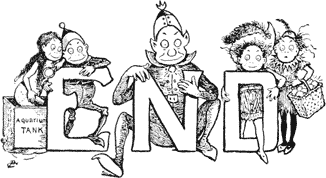
End of Project Gutenberg's The Brownies and Prince Florimel, by Palmer Cox
*** END OF THIS PROJECT GUTENBERG EBOOK THE BROWNIES AND PRINCE FLORIMEL ***
***** This file should be named 40502-h.htm or 40502-h.zip *****
This and all associated files of various formats will be found in:
http://www.gutenberg.org/4/0/5/0/40502/
Produced by David Edwards, eagkw and the Online Distributed
Proofreading Team at http://www.pgdp.net (This file was
produced from images generously made available by The
Internet Archive)
Updated editions will replace the previous one--the old editions
will be renamed.
Creating the works from public domain print editions means that no
one owns a United States copyright in these works, so the Foundation
(and you!) can copy and distribute it in the United States without
permission and without paying copyright royalties. Special rules,
set forth in the General Terms of Use part of this license, apply to
copying and distributing Project Gutenberg-tm electronic works to
protect the PROJECT GUTENBERG-tm concept and trademark. Project
Gutenberg is a registered trademark, and may not be used if you
charge for the eBooks, unless you receive specific permission. If you
do not charge anything for copies of this eBook, complying with the
rules is very easy. You may use this eBook for nearly any purpose
such as creation of derivative works, reports, performances and
research. They may be modified and printed and given away--you may do
practically ANYTHING with public domain eBooks. Redistribution is
subject to the trademark license, especially commercial
redistribution.
*** START: FULL LICENSE ***
THE FULL PROJECT GUTENBERG LICENSE
PLEASE READ THIS BEFORE YOU DISTRIBUTE OR USE THIS WORK
To protect the Project Gutenberg-tm mission of promoting the free
distribution of electronic works, by using or distributing this work
(or any other work associated in any way with the phrase "Project
Gutenberg"), you agree to comply with all the terms of the Full Project
Gutenberg-tm License (available with this file or online at
http://gutenberg.org/license).
Section 1. General Terms of Use and Redistributing Project Gutenberg-tm
electronic works
1.A. By reading or using any part of this Project Gutenberg-tm
electronic work, you indicate that you have read, understand, agree to
and accept all the terms of this license and intellectual property
(trademark/copyright) agreement. If you do not agree to abide by all
the terms of this agreement, you must cease using and return or destroy
all copies of Project Gutenberg-tm electronic works in your possession.
If you paid a fee for obtaining a copy of or access to a Project
Gutenberg-tm electronic work and you do not agree to be bound by the
terms of this agreement, you may obtain a refund from the person or
entity to whom you paid the fee as set forth in paragraph 1.E.8.
1.B. "Project Gutenberg" is a registered trademark. It may only be
used on or associated in any way with an electronic work by people who
agree to be bound by the terms of this agreement. There are a few
things that you can do with most Project Gutenberg-tm electronic works
even without complying with the full terms of this agreement. See
paragraph 1.C below. There are a lot of things you can do with Project
Gutenberg-tm electronic works if you follow the terms of this agreement
and help preserve free future access to Project Gutenberg-tm electronic
works. See paragraph 1.E below.
1.C. The Project Gutenberg Literary Archive Foundation ("the Foundation"
or PGLAF), owns a compilation copyright in the collection of Project
Gutenberg-tm electronic works. Nearly all the individual works in the
collection are in the public domain in the United States. If an
individual work is in the public domain in the United States and you are
located in the United States, we do not claim a right to prevent you from
copying, distributing, performing, displaying or creating derivative
works based on the work as long as all references to Project Gutenberg
are removed. Of course, we hope that you will support the Project
Gutenberg-tm mission of promoting free access to electronic works by
freely sharing Project Gutenberg-tm works in compliance with the terms of
this agreement for keeping the Project Gutenberg-tm name associated with
the work. You can easily comply with the terms of this agreement by
keeping this work in the same format with its attached full Project
Gutenberg-tm License when you share it without charge with others.
1.D. The copyright laws of the place where you are located also govern
what you can do with this work. Copyright laws in most countries are in
a constant state of change. If you are outside the United States, check
the laws of your country in addition to the terms of this agreement
before downloading, copying, displaying, performing, distributing or
creating derivative works based on this work or any other Project
Gutenberg-tm work. The Foundation makes no representations concerning
the copyright status of any work in any country outside the United
States.
1.E. Unless you have removed all references to Project Gutenberg:
1.E.1. The following sentence, with active links to, or other immediate
access to, the full Project Gutenberg-tm License must appear prominently
whenever any copy of a Project Gutenberg-tm work (any work on which the
phrase "Project Gutenberg" appears, or with which the phrase "Project
Gutenberg" is associated) is accessed, displayed, performed, viewed,
copied or distributed:
This eBook is for the use of anyone anywhere at no cost and with
almost no restrictions whatsoever. You may copy it, give it away or
re-use it under the terms of the Project Gutenberg License included
with this eBook or online at www.gutenberg.org/license
1.E.2. If an individual Project Gutenberg-tm electronic work is derived
from the public domain (does not contain a notice indicating that it is
posted with permission of the copyright holder), the work can be copied
and distributed to anyone in the United States without paying any fees
or charges. If you are redistributing or providing access to a work
with the phrase "Project Gutenberg" associated with or appearing on the
work, you must comply either with the requirements of paragraphs 1.E.1
through 1.E.7 or obtain permission for the use of the work and the
Project Gutenberg-tm trademark as set forth in paragraphs 1.E.8 or
1.E.9.
1.E.3. If an individual Project Gutenberg-tm electronic work is posted
with the permission of the copyright holder, your use and distribution
must comply with both paragraphs 1.E.1 through 1.E.7 and any additional
terms imposed by the copyright holder. Additional terms will be linked
to the Project Gutenberg-tm License for all works posted with the
permission of the copyright holder found at the beginning of this work.
1.E.4. Do not unlink or detach or remove the full Project Gutenberg-tm
License terms from this work, or any files containing a part of this
work or any other work associated with Project Gutenberg-tm.
1.E.5. Do not copy, display, perform, distribute or redistribute this
electronic work, or any part of this electronic work, without
prominently displaying the sentence set forth in paragraph 1.E.1 with
active links or immediate access to the full terms of the Project
Gutenberg-tm License.
1.E.6. You may convert to and distribute this work in any binary,
compressed, marked up, nonproprietary or proprietary form, including any
word processing or hypertext form. However, if you provide access to or
distribute copies of a Project Gutenberg-tm work in a format other than
"Plain Vanilla ASCII" or other format used in the official version
posted on the official Project Gutenberg-tm web site (www.gutenberg.org),
you must, at no additional cost, fee or expense to the user, provide a
copy, a means of exporting a copy, or a means of obtaining a copy upon
request, of the work in its original "Plain Vanilla ASCII" or other
form. Any alternate format must include the full Project Gutenberg-tm
License as specified in paragraph 1.E.1.
1.E.7. Do not charge a fee for access to, viewing, displaying,
performing, copying or distributing any Project Gutenberg-tm works
unless you comply with paragraph 1.E.8 or 1.E.9.
1.E.8. You may charge a reasonable fee for copies of or providing
access to or distributing Project Gutenberg-tm electronic works provided
that
- You pay a royalty fee of 20% of the gross profits you derive from
the use of Project Gutenberg-tm works calculated using the method
you already use to calculate your applicable taxes. The fee is
owed to the owner of the Project Gutenberg-tm trademark, but he
has agreed to donate royalties under this paragraph to the
Project Gutenberg Literary Archive Foundation. Royalty payments
must be paid within 60 days following each date on which you
prepare (or are legally required to prepare) your periodic tax
returns. Royalty payments should be clearly marked as such and
sent to the Project Gutenberg Literary Archive Foundation at the
address specified in Section 4, "Information about donations to
the Project Gutenberg Literary Archive Foundation."
- You provide a full refund of any money paid by a user who notifies
you in writing (or by e-mail) within 30 days of receipt that s/he
does not agree to the terms of the full Project Gutenberg-tm
License. You must require such a user to return or
destroy all copies of the works possessed in a physical medium
and discontinue all use of and all access to other copies of
Project Gutenberg-tm works.
- You provide, in accordance with paragraph 1.F.3, a full refund of any
money paid for a work or a replacement copy, if a defect in the
electronic work is discovered and reported to you within 90 days
of receipt of the work.
- You comply with all other terms of this agreement for free
distribution of Project Gutenberg-tm works.
1.E.9. If you wish to charge a fee or distribute a Project Gutenberg-tm
electronic work or group of works on different terms than are set
forth in this agreement, you must obtain permission in writing from
both the Project Gutenberg Literary Archive Foundation and Michael
Hart, the owner of the Project Gutenberg-tm trademark. Contact the
Foundation as set forth in Section 3 below.
1.F.
1.F.1. Project Gutenberg volunteers and employees expend considerable
effort to identify, do copyright research on, transcribe and proofread
public domain works in creating the Project Gutenberg-tm
collection. Despite these efforts, Project Gutenberg-tm electronic
works, and the medium on which they may be stored, may contain
"Defects," such as, but not limited to, incomplete, inaccurate or
corrupt data, transcription errors, a copyright or other intellectual
property infringement, a defective or damaged disk or other medium, a
computer virus, or computer codes that damage or cannot be read by
your equipment.
1.F.2. LIMITED WARRANTY, DISCLAIMER OF DAMAGES - Except for the "Right
of Replacement or Refund" described in paragraph 1.F.3, the Project
Gutenberg Literary Archive Foundation, the owner of the Project
Gutenberg-tm trademark, and any other party distributing a Project
Gutenberg-tm electronic work under this agreement, disclaim all
liability to you for damages, costs and expenses, including legal
fees. YOU AGREE THAT YOU HAVE NO REMEDIES FOR NEGLIGENCE, STRICT
LIABILITY, BREACH OF WARRANTY OR BREACH OF CONTRACT EXCEPT THOSE
PROVIDED IN PARAGRAPH 1.F.3. YOU AGREE THAT THE FOUNDATION, THE
TRADEMARK OWNER, AND ANY DISTRIBUTOR UNDER THIS AGREEMENT WILL NOT BE
LIABLE TO YOU FOR ACTUAL, DIRECT, INDIRECT, CONSEQUENTIAL, PUNITIVE OR
INCIDENTAL DAMAGES EVEN IF YOU GIVE NOTICE OF THE POSSIBILITY OF SUCH
DAMAGE.
1.F.3. LIMITED RIGHT OF REPLACEMENT OR REFUND - If you discover a
defect in this electronic work within 90 days of receiving it, you can
receive a refund of the money (if any) you paid for it by sending a
written explanation to the person you received the work from. If you
received the work on a physical medium, you must return the medium with
your written explanation. The person or entity that provided you with
the defective work may elect to provide a replacement copy in lieu of a
refund. If you received the work electronically, the person or entity
providing it to you may choose to give you a second opportunity to
receive the work electronically in lieu of a refund. If the second copy
is also defective, you may demand a refund in writing without further
opportunities to fix the problem.
1.F.4. Except for the limited right of replacement or refund set forth
in paragraph 1.F.3, this work is provided to you 'AS-IS' WITH NO OTHER
WARRANTIES OF ANY KIND, EXPRESS OR IMPLIED, INCLUDING BUT NOT LIMITED TO
WARRANTIES OF MERCHANTIBILITY OR FITNESS FOR ANY PURPOSE.
1.F.5. Some states do not allow disclaimers of certain implied
warranties or the exclusion or limitation of certain types of damages.
If any disclaimer or limitation set forth in this agreement violates the
law of the state applicable to this agreement, the agreement shall be
interpreted to make the maximum disclaimer or limitation permitted by
the applicable state law. The invalidity or unenforceability of any
provision of this agreement shall not void the remaining provisions.
1.F.6. INDEMNITY - You agree to indemnify and hold the Foundation, the
trademark owner, any agent or employee of the Foundation, anyone
providing copies of Project Gutenberg-tm electronic works in accordance
with this agreement, and any volunteers associated with the production,
promotion and distribution of Project Gutenberg-tm electronic works,
harmless from all liability, costs and expenses, including legal fees,
that arise directly or indirectly from any of the following which you do
or cause to occur: (a) distribution of this or any Project Gutenberg-tm
work, (b) alteration, modification, or additions or deletions to any
Project Gutenberg-tm work, and (c) any Defect you cause.
Section 2. Information about the Mission of Project Gutenberg-tm
Project Gutenberg-tm is synonymous with the free distribution of
electronic works in formats readable by the widest variety of computers
including obsolete, old, middle-aged and new computers. It exists
because of the efforts of hundreds of volunteers and donations from
people in all walks of life.
Volunteers and financial support to provide volunteers with the
assistance they need, are critical to reaching Project Gutenberg-tm's
goals and ensuring that the Project Gutenberg-tm collection will
remain freely available for generations to come. In 2001, the Project
Gutenberg Literary Archive Foundation was created to provide a secure
and permanent future for Project Gutenberg-tm and future generations.
To learn more about the Project Gutenberg Literary Archive Foundation
and how your efforts and donations can help, see Sections 3 and 4
and the Foundation web page at http://www.pglaf.org.
Section 3. Information about the Project Gutenberg Literary Archive
Foundation
The Project Gutenberg Literary Archive Foundation is a non profit
501(c)(3) educational corporation organized under the laws of the
state of Mississippi and granted tax exempt status by the Internal
Revenue Service. The Foundation's EIN or federal tax identification
number is 64-6221541. Its 501(c)(3) letter is posted at
http://pglaf.org/fundraising. Contributions to the Project Gutenberg
Literary Archive Foundation are tax deductible to the full extent
permitted by U.S. federal laws and your state's laws.
The Foundation's principal office is located at 4557 Melan Dr. S.
Fairbanks, AK, 99712., but its volunteers and employees are scattered
throughout numerous locations. Its business office is located at
809 North 1500 West, Salt Lake City, UT 84116, (801) 596-1887, email
business@pglaf.org. Email contact links and up to date contact
information can be found at the Foundation's web site and official
page at http://pglaf.org
For additional contact information:
Dr. Gregory B. Newby
Chief Executive and Director
gbnewby@pglaf.org
Section 4. Information about Donations to the Project Gutenberg
Literary Archive Foundation
Project Gutenberg-tm depends upon and cannot survive without wide
spread public support and donations to carry out its mission of
increasing the number of public domain and licensed works that can be
freely distributed in machine readable form accessible by the widest
array of equipment including outdated equipment. Many small donations
($1 to $5,000) are particularly important to maintaining tax exempt
status with the IRS.
The Foundation is committed to complying with the laws regulating
charities and charitable donations in all 50 states of the United
States. Compliance requirements are not uniform and it takes a
considerable effort, much paperwork and many fees to meet and keep up
with these requirements. We do not solicit donations in locations
where we have not received written confirmation of compliance. To
SEND DONATIONS or determine the status of compliance for any
particular state visit http://pglaf.org
While we cannot and do not solicit contributions from states where we
have not met the solicitation requirements, we know of no prohibition
against accepting unsolicited donations from donors in such states who
approach us with offers to donate.
International donations are gratefully accepted, but we cannot make
any statements concerning tax treatment of donations received from
outside the United States. U.S. laws alone swamp our small staff.
Please check the Project Gutenberg Web pages for current donation
methods and addresses. Donations are accepted in a number of other
ways including checks, online payments and credit card donations.
To donate, please visit: http://pglaf.org/donate
Section 5. General Information About Project Gutenberg-tm electronic
works.
Professor Michael S. Hart is the originator of the Project Gutenberg-tm
concept of a library of electronic works that could be freely shared
with anyone. For thirty years, he produced and distributed Project
Gutenberg-tm eBooks with only a loose network of volunteer support.
Project Gutenberg-tm eBooks are often created from several printed
editions, all of which are confirmed as Public Domain in the U.S.
unless a copyright notice is included. Thus, we do not necessarily
keep eBooks in compliance with any particular paper edition.
Most people start at our Web site which has the main PG search facility:
http://www.gutenberg.org
This Web site includes information about Project Gutenberg-tm,
including how to make donations to the Project Gutenberg Literary
Archive Foundation, how to help produce our new eBooks, and how to
subscribe to our email newsletter to hear about new eBooks.